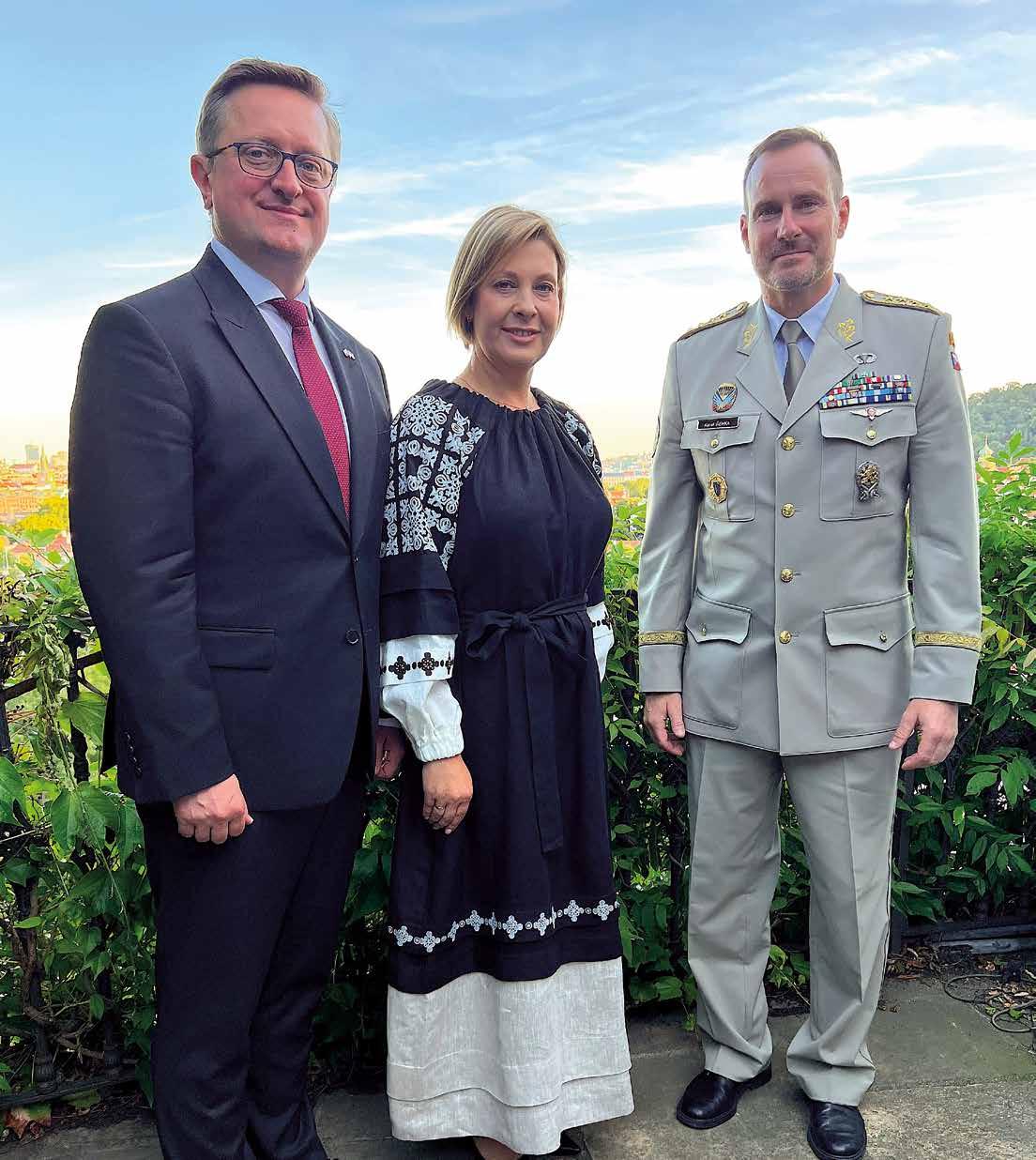
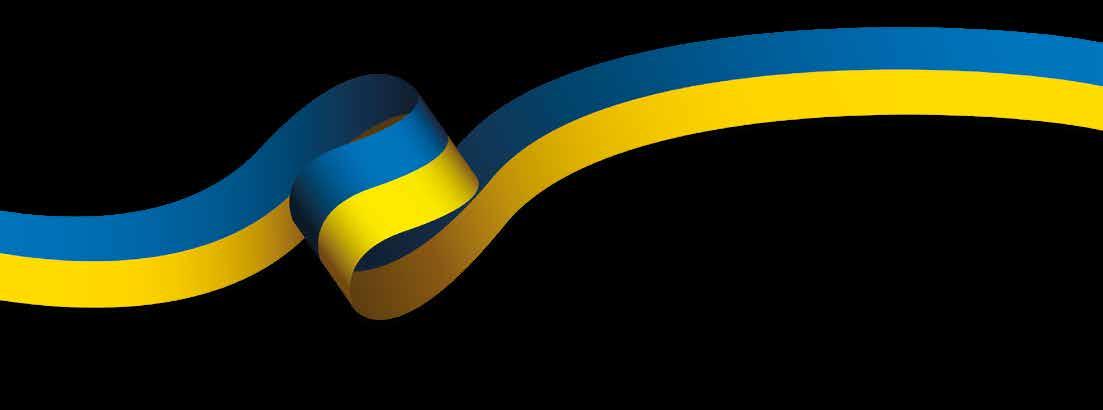



Andrew Keene, Vice Chair of the Memorial Scrolls Trust TRANSFORMING LOSS INTO LEGACY
Kristian Ødegaard, Charge d’Affaires a.i., Embassy of Norway in Prague THE GEOPOLITICAL SHIFTS REQUIRE CONTINUED COLLABORATION AND RESILIENCE
Lukáš Kubín, historian and orientalist ISTANBUL: THREE CITIES, THREE STORIES
Monika Ruprechtová, M. Zisso FROM SOCIALIST PINS TO THE SUCCESSFUL SALE OF A BUSINESS STAKE
Gabriela Mates, Head of the European Investment Bank Group Office in the Czech Republic STRENGTH COMES FROM WITHIN
Marek Veselý, founder of the non-profit organization Prague Gallery of Czech Glass PATRONS’ CLUB. FOR THOSE WHO HELP YOUNG GLASSMAKERS DEVELOP
Filip Keresteš, automotive industry expert THE NEW GENERATION OF ELECTRIC HYBRID SUV- REEV IS IN THE CZECH REPUBLIC
Pallava Bagla, award-winning science journalist INDIA’S COSMIC LEAP – INSPIRING A BILLION DREAMS
Václav Pavlas and Meshulam Zisso OUT OF AFRICA - PART TWO
A farewell message from H.E. Ms. Anna Azari, Ambassador of Israel
A DREAM I HAD ABOUT PRAGUE
A farewell message from H.E. Mr. Daan Huisinga, Ambassador of the Netherlands LEAVING CZECHIA FULFILLED AND ENERGISED
A farewell message from H.E. Mr. Suwat Kaewsook, Ambassador of Thailand SAYING
Interview with H.E. Ms. Gabriela Moraru, Ambassador of Moldova WE VALUE CLOSE POLITICAL DIALOGUE
Interview with H.E. Mr. Urs Beat Bucher, Ambassador of Switzerland OPENNESS, TOLERANCE AND COMMITMENT TO A RULES-BASED ORDER: GUIDING PRINCIPLES OF SWITZERLANDS GLOBAL ENGAGEMENT
Interview with H.E. Mr. Victor Abujatum, Ambassador of Chile WE ARE A DISTANT, BUT WELCOMING COUNTRY
Interview with H.E. Ms. Solangel Ortiz Mejia, Ambassador of Colombia EXPLORING OPPORTUNITIES THAT BENEFIT BOTH NATIONS
Interview with H.E. Mr. Tan Soo Khoon, Ambassador of Singapore OUR RELATIONS HAVE GROWN FROM STRENGTH TO STRENGTH
Interview with Monika Granja, Director of the Committee of Good Will – Olga Havel Foundation GOODWILL CONTINUES TO SPREAD
Interview with Leon Jakimič, Founder of Lasvit, a Czech-based multinational company WE ARE NOT HERE TO REPEAT THE PAST; WE WANT TO MOVE THE STORY FORWARD
Interview with Nathania Karina, Conductor and Music Director of Trinity Youth Symphony Orchestra ALLOWING DIVERSE GENRES TO BE PART OF THE CONCERT EXPERIENCE
Interview with Vít Hofman, Head of Communications and Spokesperson at the City Hall of Prague WHAT MATTERS IS TO COMMUNICATE, NONETHELESS
Interview with Eva Primus Kovandová, President of the non-profit organisation Business & Professional Women CR I NEED THINGS TO HAVE MEANING
Benke Aikell – Founder | Eva Anderová & Meshulam Zisso – Owners & Executive Editors | Petra Kubernátová – Webmaster | Martina Hošková – Edit & Translation | Martin Mikeš – Graphic Design | Printing house – Tiskárna H.R.G. Litomyšl | Publisher PRIME (1998) s.r.o., Olgy Havlové 2914\52, 130 00 Žižkov - Prague 3, IČ: 25682784, DIČ: CZ25682784, e-mail: info@czechleaders.com, www.czechleaders.com | Czech & Slovak Leaders, Olgy Havlové 2914\52, 130 00 Žižkov - Prague 3, email: info@czechleaders.com, www.czechleaders.com | Licence: MK ČR E 13147 | No reproduction is permitted in whole or part without the express consent of Czech & Slovak Leaders | The advertiser is responsible for the advertising contents | Opinions expressed in this publication are those of the authors or persons interviewed and do not necessarily reflect the views of the editors or Czech & Slovak Leaders | All editorial material and photos in Czech & Slovak Leaders Magazine is digitally stored and may be republished by Czech & Slovak Leaders either in printed form or in various digital media | All correspondence to Czech & Slovak Leaders Magazine may be published.
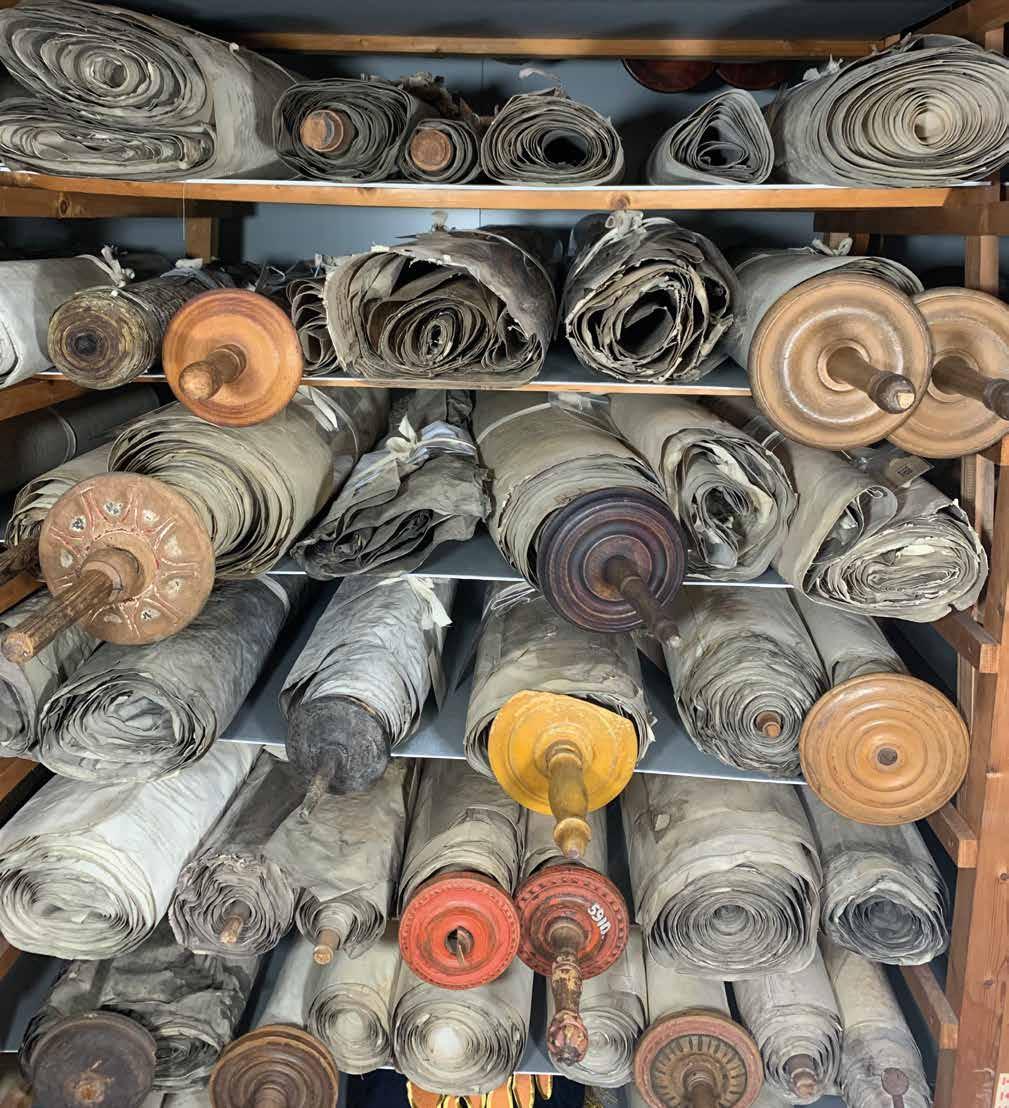
A Torah Scroll is the most sacred ritual object in Jewish life. It is handwritten on parchment and contains the words of the Hebrew bible. Stored during the war in Prague’s Michle Synagogue, these 1,564 Czech Torah
scrolls had been sent to Prague by the Jewish communities of Bohemia and Moravia. They stood as silent witnesses to centuries of Jewish life – synagogues, schools, and families – that were extinguished by the Holocaust.
This year marks the 60th anniversary of a journey steeped in memory, resilience, and renewal –the journey of 1,564 Czech Torah scrolls, saved from destruction during the Second World War with the remarkable efforts of employees of the Jewish Museum in Prague, and entrusted to the care of the Memorial Scrolls Trust, a London-based NGO, in 1964. In recent years, the journey of these silent witnesses of Jewish life has come full circle, and four of them have returned to Jewish communities and institutions in Czechia.
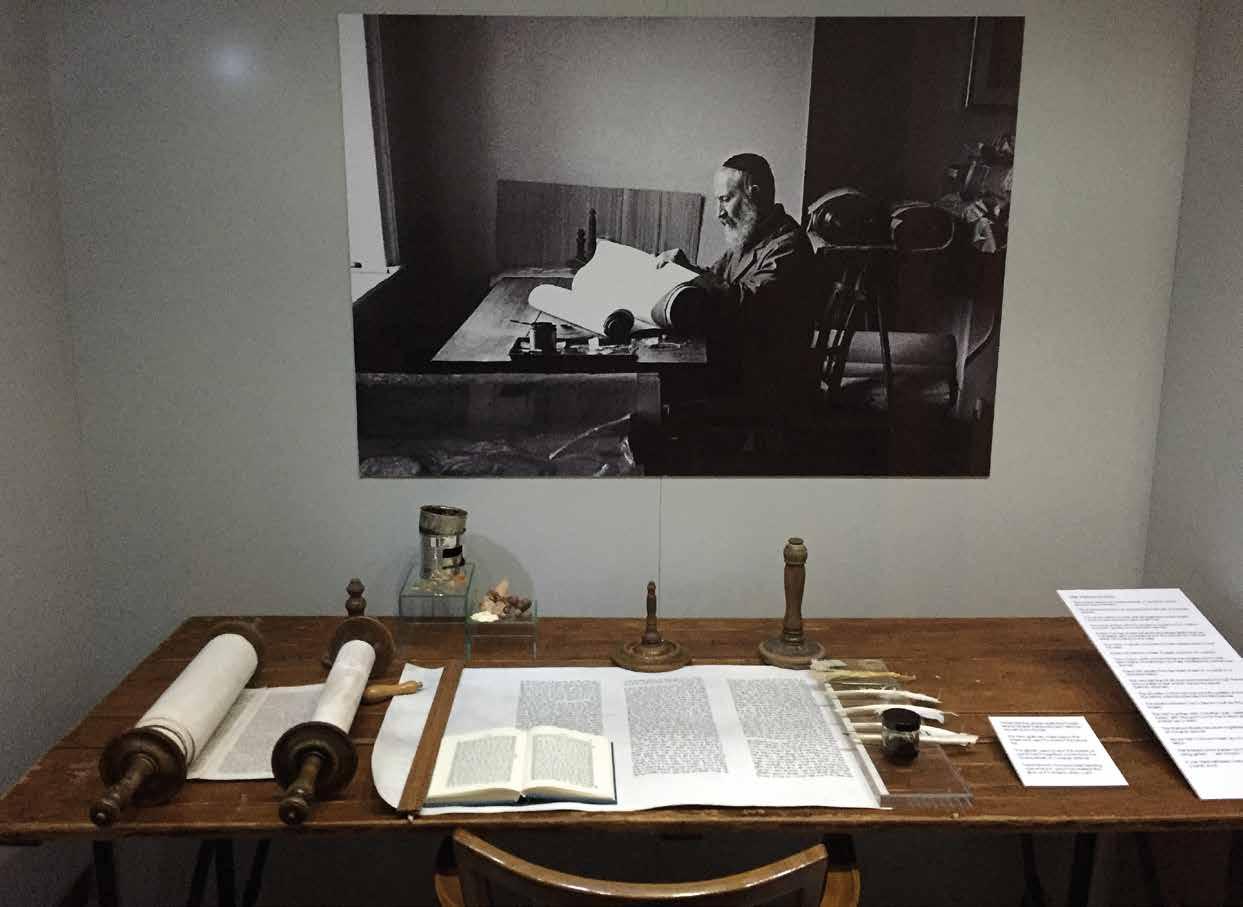
Their survival carried with it both a burden and a responsibility: how to ensure that these sacred objects would not remain mute remnants of the past, but instead continue to inspire the living.
In 1963, through the compassion and foresight of Ralph Yablon, a benefactor of Westminster Synagogue, the scrolls were purchased from the Communist government of Czechoslovakia and transported to London. There, in the heart of Westminster Synagogue, they found sanctuary and a new chapter began.
The mission was both solemn and hopeful: to honour the memory of destroyed communities by returning sacred objects to the rhythm of Jewish life. This was not merely an act of preservation,
but an act of renewal – transforming loss into legacy, absence into presence.
Soon after their arrival, a chance visit by David Brand, a master sofer (scribe), would unlock the future of these scrolls. Discovering 1,564 scrolls awaiting care, he committed himself to their restoration, dedicating over three decades to repairing and cataloguing them. Through his devotion, countless scrolls were brought back to life – not as artifacts in a museum but as Torahs once again read, studied, and cherished by Jewish communities around the world.
Over the past six decades, the Memorial Scrolls Trust has placed approximately 1,400 scrolls on permanent loan to
more than 1,300 communities worldwide – synagogues, schools, museums, and centres of learning. From North America to Australia, from South Africa to South America, the Czech scrolls have become enduring links between Jewish life in Central Europe and Jewish life flourishing across the globe.
These scrolls remain more than historical relics. They are living ritual objects, carried in processions, read during Shabbat services, and used as educational tools to teach new generations about faith, resilience, and the responsibilities of remembrance. Some have found extraordinary homes: at Yad Vashem in Jerusalem, within the Royal Collection at Windsor Castle, and even in the Crossroads of Civilizations Museum in Abu Dhabi, where they symbolize interfaith understanding and dialogue.
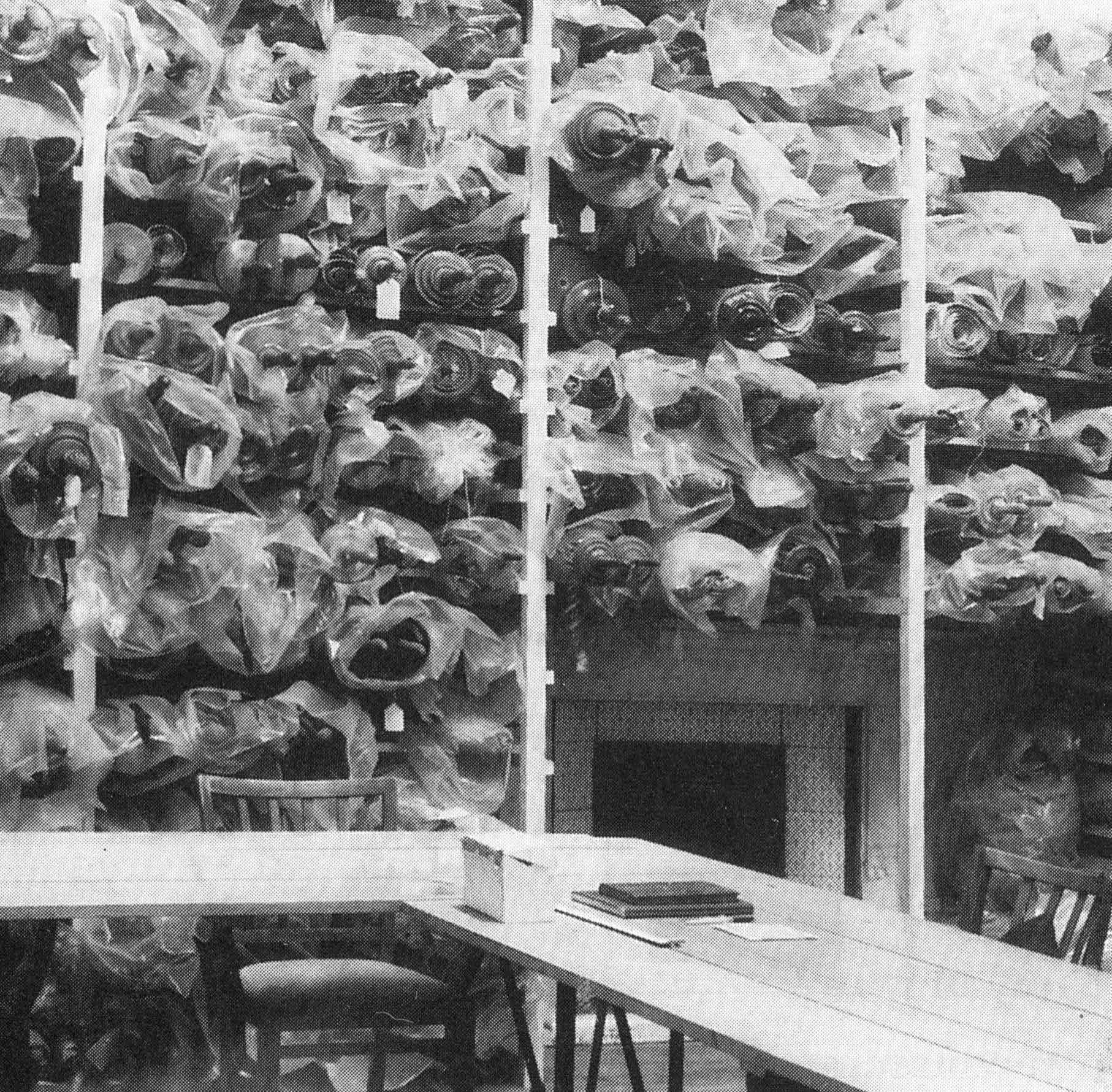
Whenever a community holding one of the scrolls closes or merges, the scroll makes its way back to London – ensuring continuous stewardship and an ever-renewing cycle of memory and care.
In recent years, the journey of these scrolls has come full circle. In the last decade, four Torah scrolls have returned to Jewish communities and institutions in
Czechia. The first was entrusted to Olomouc, followed by Ec Chajim, the Progressive Jewish Community of Prague, then to the community of Liberec, and most recently a non-kosher scroll was placed on display in the Czech Parliament as a symbol of remembrance and opportunity for education. Alongside these placements, a travelling exhibition in both English and Czech tells the story of the scrolls, allowing citizens and visitors to encounter this
history within the very landscapes from which these sacred texts once came. Each return is both a reminder of the rupture of Jewish life in Czech lands and a testament to the possibility of connection, dialogue, and renewal in the present.
Sixty years on, the Memorial Scrolls Trust continues its mission with humility and resolve. Each
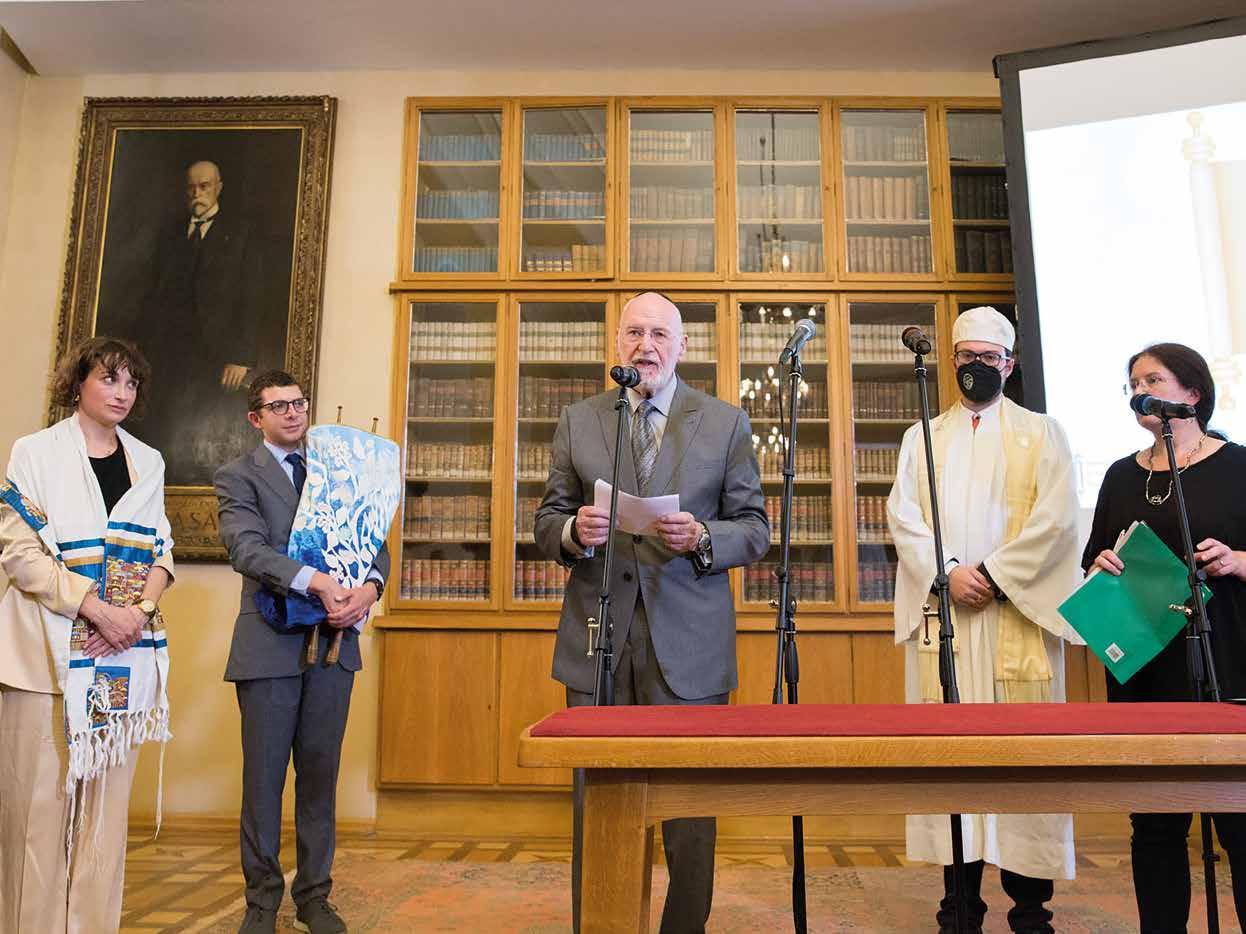
scroll carries the memory of a lost community, yet also embodies the resilience of the Jewish people and the universal human capacity to rebuild from tragedy.
To hold, read, or even simply stand in the presence of one of these Torah scrolls is to feel a thread of continuity that defies
destruction. It is to sense that memory need not be static – that it can be a source of life, of learning, and of renewed purpose.
In marking this milestone, we are reminded that the story of the Czech scrolls is not finished. It continues wherever they are read, wherever they are taught,
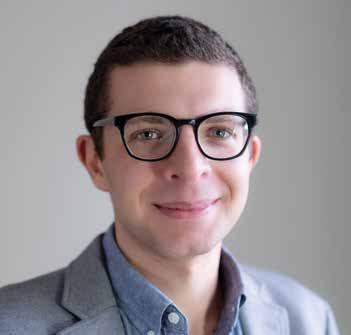
and wherever they inspire communities to affirm that even in the face of loss, Jewish life – and human dignity – endures.
is an American Israeli, based in Tel Aviv. He serves as Vice Chair of the Memorial Scrolls Trust and sits on the boards of several international Jewish organizations. With a background in data and digital technology, Andrew founded ESEK, a social enterprise supporting Israeli small businesses, in the aftermath of October 7th.
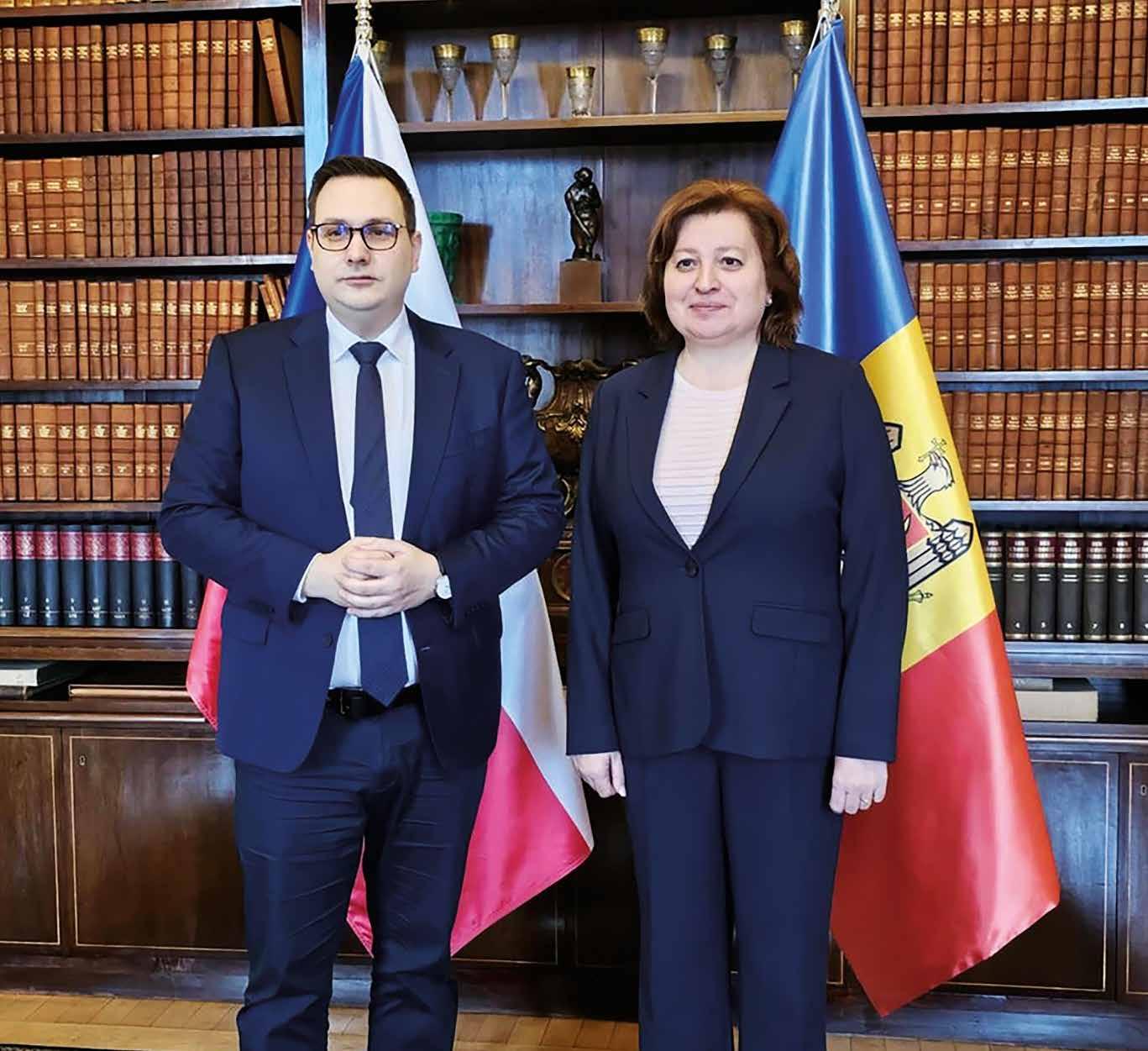
“The mission of a diplomat involves creating new bridges, opening doors and souls, creating a positive image of the country, and identifying new possibilities for cooperation. When people are honest, professional, and well intentioned, it’s a pleasure to interact with them,” says H.E. Ms. Gabriela Moraru, Ambassador of Moldova, for whom diplomacy has become a lifestyle, and who can’t imagine doing anything else. Regarding the relationship between Moldova and the Czech Republic, she describes the two as “friendly countries continuing to build a solid partnership”.
Can you share a bit about your background?
I was born in the Republic of Moldova. I graduated from the State University of Moldova, completed my studies at the National University of Political Studies and Public Administration in Romania, and finally received a master’s degree in international relations at the United World College of the Adriatic in Italy. I am a career diplomat.
Would you describe your country to our readers?
Located in Eastern Europe, the Republic of Moldova is a country with a rich tourist potential. Bordered by Romania to the West and Ukraine to the North, South, and East, this corner of the earth more than deserves the title of “a corner of heaven”.
Thanks to the four seasons, the surroundings look different every time – spring in the buds and aromas of flowers, summer in the gentle beat of the sun’s rays and the charm of fruits, autumn in the multicoloured leaves and of course in the taste of grapes, and winter in the purity of snow. Whatever time of year, the look is enchanting.
The pride of Moldova is in its natural landscapes, with places virgin and enigmatic; there are historical sites and fortifications that carry the breath of history; there are wines and cellars of rare quality; and there are the churches and monasteries in whose construction a soul was poured, thus becoming places of pilgrimage and healing of the soul. The pride of Moldova is also in its native people – who create the spirit of hospitality in our small country.
It looks like Moldova really has a lot to offer as a holiday destination.
The Republic of Moldova has a rich cultural heritage, which certainly may be of great interest to tourists. 140 cultural heritage sites may be included in the tourist circuit. The earliest visible remains of the built heritage are Geto-Dacian sites and Roman fortifications. The remains of medieval fortresses, as well as archaeological complexes such as Orheiul Vechi, cave monasteries, nobles’ mansions, and peasant houses offer a diversity of visitor attractions. Chisinau, the capital city, features a good number of cultural heritage monuments, fine examples of domestic architecture from the 19th and 20th centuries, which might be considered to be tourist attractions as well.
The Republic of Moldova has 87 museums, with rich collections of art. Additionally, museums are mostly housed in buildings of special architectural importance.
Part of the national tourist product is the variety of cultures represented across different regions of the country. The Republic of Moldova is a mosaic of many nationalities and cultures, featuring a variety of traditions, languages, folklore, cuisine, and more. There are over 880 folk music groups in the Republic of Moldova, most of which reflect the distinct traditions of their districts and ethnic origins. It is also worth mentioning the national craftsmanship, both for its cultural value and also because it provides souvenirs for tourists.
What drove you to become an ambassador?
I have always wanted and wished to contribute to the deepening and diversification of relations between my country and other countries, and to make Moldova known to the world. As you know, the mission of a diplomat involves creating new bridges, opening doors and souls, creating
a positive image of the country, and identifying new possibilities for cooperation. Diplomacy is the main instrument of foreign policy, which represents the broader goals and strategies that guide a state’s interactions with the rest of the world.
Could we say that being an ambassador fits well into your lifestyle?
I have about 30 years of experience in diplomacy. Diplomacy has become my lifestyle. I can’t imagine anything else. I am passionate about the country, I travel, I learn about culture and history, and I enjoy communication. Yes, it’s not easy being a woman diplomat, but, as my husband says, “a woman diplomat first of all looks good, and secondly, can bring added value to the position.”
Which countries have you served in so far?
I started in Hungary, served in the Slovak Republic, Bosnia and Herzegovina, the Republic of Croatia, the Republic of Slovenia, the Holy See, and then continued in Poland and Estonia. After that, I was an ambassador to Israel, and now to the Czech Republic.
You have been in Czechia for about a year. Would you share some of your impressions?
It is a great responsibility and honour for me to represent and serve my country in the Czech Republic. I have had a very good impression of the Czech Republic. Of course, I endlessly admire the capital, Prague. I was impressed by the beautiful landscapes, historic cities, and old castles with stunning architecture... and of course, a lot of intelligent people. When people are honest, professional, and well intentioned, it’s a pleasure to interact with them.
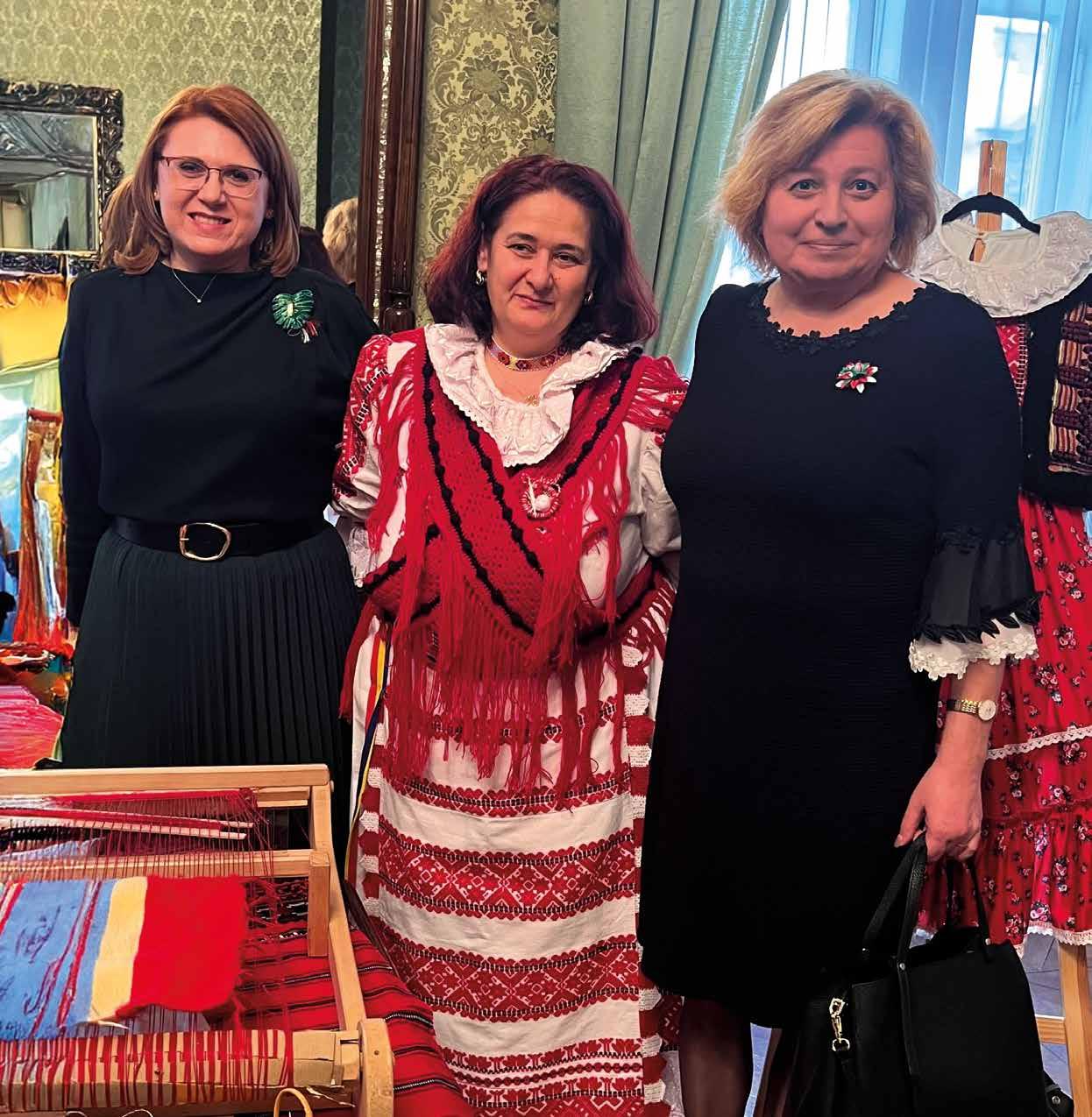
Moldova would like to join the European Union. What benefits do you expect to gain by this, and do you feel supported by Czechia in this respect?
Czechia knows better than anyone how much EU membership can change lives. The Czech Republic has long been a source of inspiration for Moldova; through its democratic transformation,
economic modernisation, and success toward European integration. And today, your country continues to be an example to follow. I met with Czech officials, from various ministries, who manage our country’s files, and have found that the Czech authorities show extraordinary openness towards my country for sharing experience in European integration, carrying out reforms in
various fields, and implementing development assistance projects in Moldova. Czech dignitaries have reconfirmed, during various meetings, their support for my country’s internal reforms and European agenda.
We have felt European solidarity when we needed it most. We have kept our direction and anchored our future in the values of peace

and well-being. A European future. This rapprochement also brings real economic results. Today, we have access to the largest market in the world: the European Union market. We already export most of our products to this vast, stable market that you can trust. Clear rules, competitive prices, serious partners – all of these give our producers the chance to sell more, earn better, and create jobs at home.
What is the current status of Czechia–Moldova relations?
The Republic of Moldova and the Czech Republic enjoy a friendly and comprehensive relationship in various areas. We value our close political dialogue on all
levels. The political dialogue is characterised by an upward dynamic; we provide an important impetus to the strengthening of bilateral relations and economic cooperation. The consolidation of Moldovan-Czech relations, as well as the openness of both states to expand bilateral cooperation, characterise, in essence, the current state of Moldovan-Czech relations.
This interview is done on the occasion of Moldova’s national day. What do you wish for your country, and for the Czech Republic?
The Republic of Moldova and the Czech Republic are friendly countries. We are united by common
values and the desire to offer our citizens a better life, more security, and more opportunities. In recent years, our relationship has developed rapidly, and for this, we are grateful. Today, together, we continue to build a solid partnership, which brings real benefits to our people. I wish it to continue only in this way, with much happiness and prosperity for the Czech and Moldovan people.
“A Dream I Had About Prague” is the title of a well-known Israeli song about the Warsaw Pact invasion of Czechoslovakia in 1968. But it is also a fitting title for summing up four years in this special city and country.
There are many possible explanations for the depth of CzechIsraeli relations – one can start with Tomáš Masaryk, the Czechoslovak assistance during Israel’s War of Independence, or even much earlier. The fact is that for Israel and Israelis, Czechia is a deeply friendly country — perhaps the friendliest country in the world. I do not know of an Israeli diplomat in Czechia who hasn’t felt this friendship and the openness of the Czech authorities and society at all levels.
My four years here coincided with the horror of the 7. 10. 2023 massacre of Israelis, the ongoing struggle for the release of the hostages held by Hamas, the 12-day war with Iran, and the tragedy of the continuous war in Gaza and its consequences. The support Israel received from Czechia and the Czech people was, and still is, overwhelming.
On November 1, 2023, during a huge rally in support of Israel, Prime Minister Fiala, among other things, promised to continue supporting Israel even when the tide of international public opinion shifts. He has definitely kept his word to this very day. This unwavering support for Israel is nonpartisan; we feel strong backing from leaders across

various parties. I assume that, whatever the outcome of the coming elections, the CzechIsraeli partnership will continue to grow and flourish in numerous fields — trade, science, education, and tourism.
On a more personal note, I will remember Prague and Czechia for its people and, of course, for its stunning beauty — hills and valleys, castles and palaces. Some places in Czechia give you the feeling of walking through film or theatre sets. I will end with an
excerpt from the Czech national anthem:
“Waters murmur across the meads Pinewoods rustle among the rocks Blooming orchards shine in spring; Paradise on Earth to see”
I will remember that the Czech land was, at least for these four years, partially my home too.
Anna Azari
Ambassador of Israel to the Czech Republic (August 2021 - September 2025)
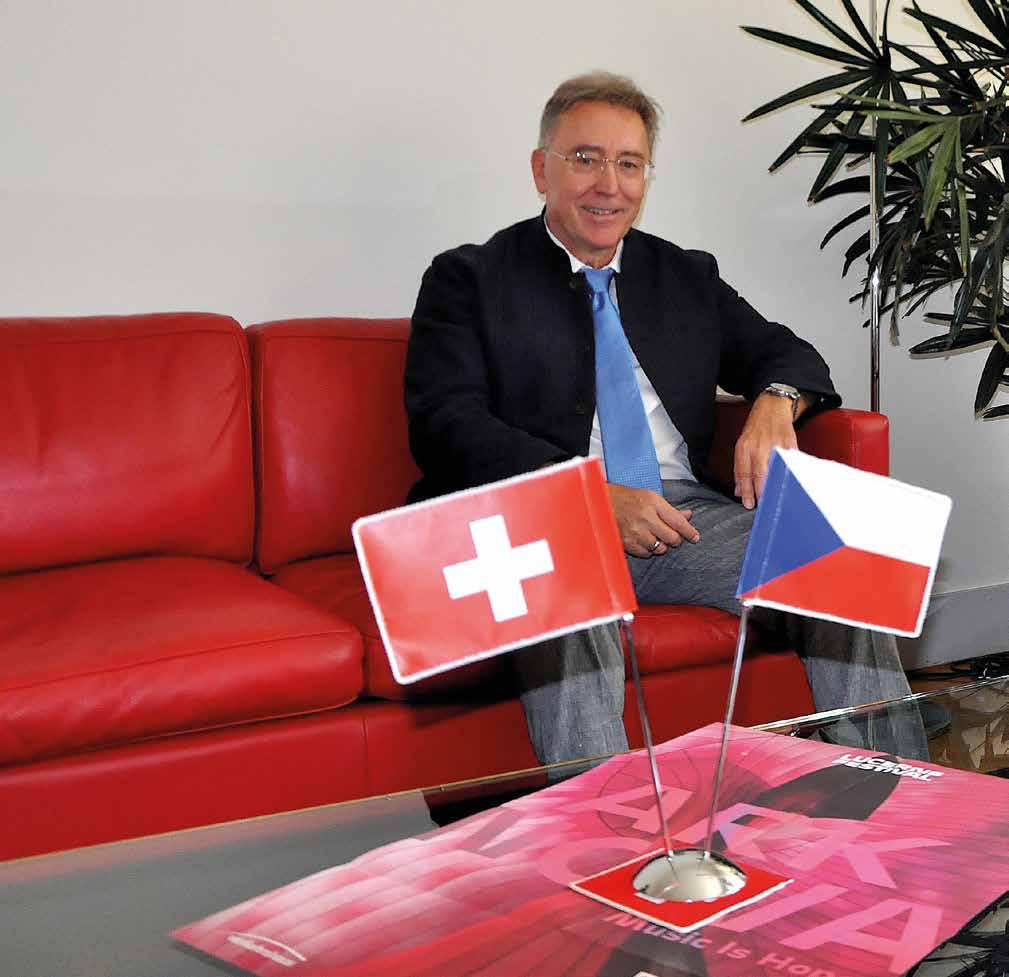
According to the recent survey of STEM, the Czech research institute monitoring the public attitude of the Czech Republic’s population towards selected countries in Europe and the world, Switzerland took the top position this year for the first time. For H.E. Mr. Urs Beat Bucher, Ambassador of Switzerland, it is “certainly very encouraging news”. The Ambassador evaluates the relations between the two countries as “outstanding across all spheres” and wishes us to “remain true to the values that shaped Europe’s foundation and to carry them forward in an evolving international landscape”.
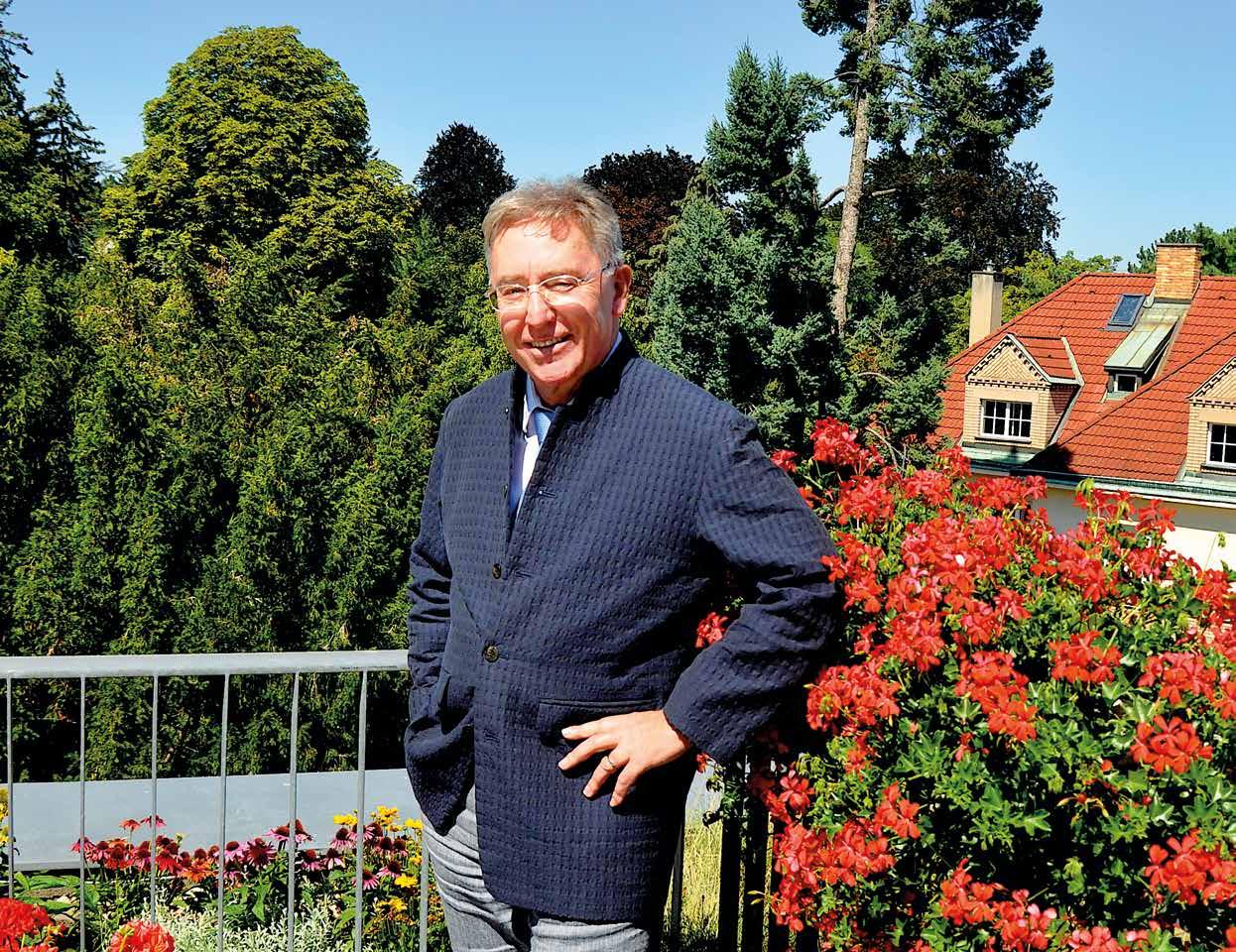
Let’s start with introducing yourself to our readers, shall we?
I grew up in Solothurn, a small baroque town in German-speaking Switzerland, and studied law in Bern. I entered the Swiss Foreign Ministry in 1990.
My first assignment abroad was Moscow, the Soviet Union. I have witnessed the collapse of the Soviet Empire and was then the first “desk officer” for the 15 states that emerged. I was then posted in Brussels / EU, at a time when European integration was in full swing. In 2001, I returned to the European integration headquarters office, and in 2004 took over its helm with the rank of Ambassador. I served as Ambassador in Japan, headed
the Swiss EU-Mission in Brussels, represented Switzerland in Israel, and, since fall of last year, I have the honour of representing my country in the Czech Republic.
My wife is from Geneva in the French-speaking part of Switzerland, and we have two grown-up kids.
Can you tell us about your country?
My home country, nestled in the heart of Europe, is known worldwide for its breathtaking landscapes, from majestic Alpine peaks to serene lakes and lush valleys. But beyond its natural beauty, Switzerland is a nation built on values of neutrality, democracy, and innovation.
We take great pride in our political system, which fosters direct
democracy, allowing citizens a strong voice in shaping our laws and policies. This participatory spirit is part of what makes Switzerland unique and resilient.
Economically, Switzerland is recognised for its excellence in precision industries, finance, pharmaceuticals, and cuttingedge technology. Our commitment to quality and sustainability drives progress while respecting our environment. Culturally, Switzerland is a mosaic of four official languages – German, French, Italian, and Romansh –which reflects the rich diversity and harmony among our regions. This diversity nurtures openness and tolerance, key principles that guide our engagement on the global stage. Switzerland’s tradition of neutrality also positions us as
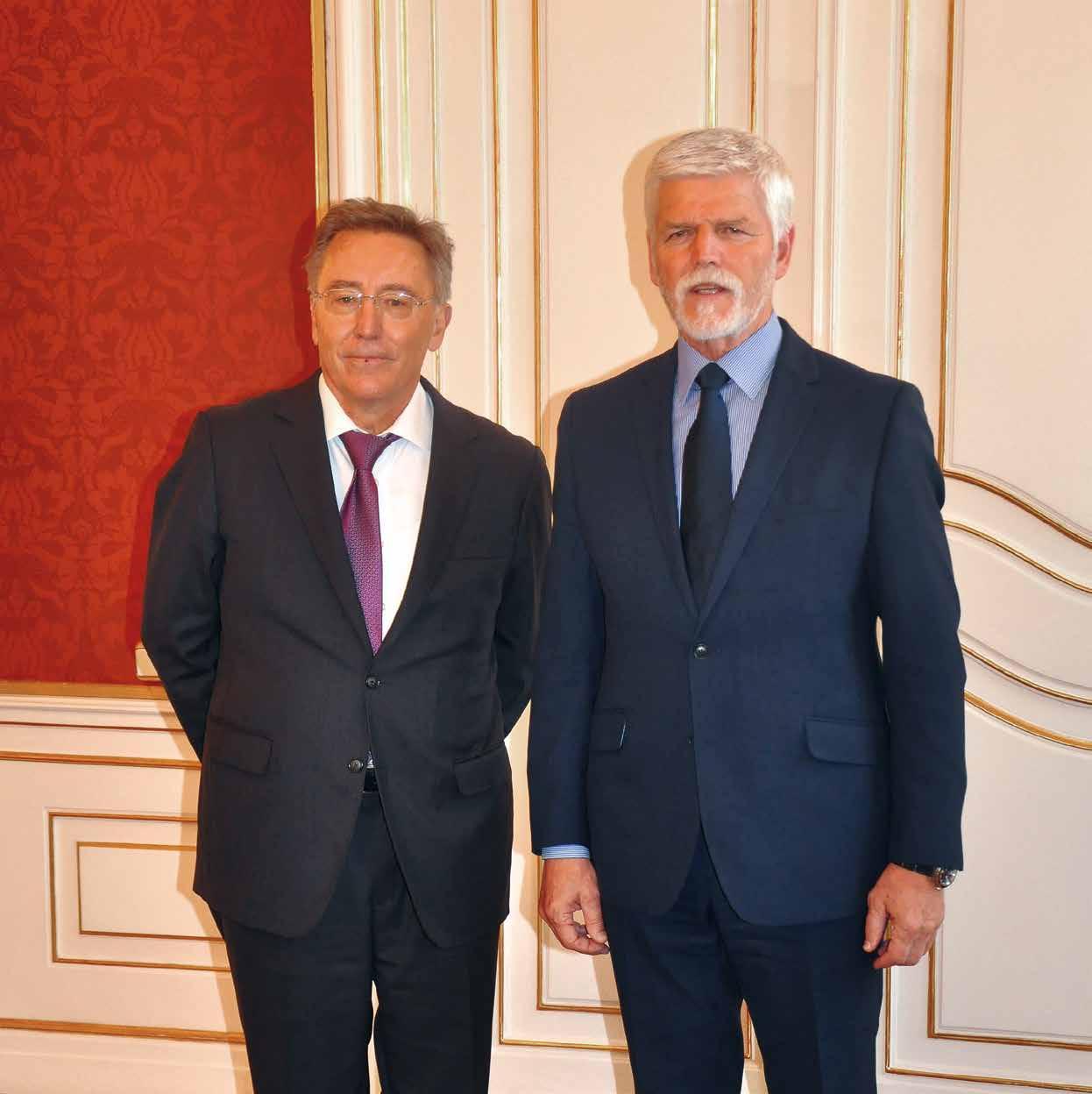
a trusted mediator in international affairs, promoting peace, dialogue, and humanitarian efforts worldwide.
Speaking of neutrality, what is Switzerland’s status with the EU and NATO?
Switzerland is neither a member of the EU nor NATO. Our country has always chosen a path of independence and neutrality,
which are core principles of our foreign policy.
However, Switzerland maintains a very close relationship with the EU through a series of bilateral agreements, which allow us to participate in key areas of the single market and contribute with our means to build a prosperous Europe. These agreements also serve as a solid legal base for our bilateral relations with Czechia.
Regarding NATO, even though our neutrality does not allow us to be a member, we do cooperate with the alliance in some areas – for instance, in the framework of the Partnership for Peace Program.
What made you become an ambassador?
As a young lawyer, I realised that I could best serve my country by defending the interests of society
rather than those of individuals. I have never regretted this decision.
How does being an ambassador fit into your lifestyle?
Obviously very well, otherwise I would have chosen another path.
The biggest challenge of a diplomat’s life is also what makes it so attractive: the political and cultural environment, as well as the people around you, change with every post. This may be exhausting – also for the family – but at the same time, it is impossible to get rusty!
Do you have a piece of advice for the next generation of ambassadors?
I can share a lesson, which I learned at the very beginning of my career – be mentally prepared that the unthinkable happens, for the good and the bad!
Back to talking about the Czech Republic. Having been here for about a year, can you share some of your impressions and highlights? What was your first impression upon arriving?
Not very surprisingly, my first impression of Czechia was marked by the stunning beauty of Prague. What has been achieved in terms of conservation and renovation of the historic substance of the city since my first visit in 1990 is amazing. Prague is not just beautiful, it offers an incredible quality of life in terms of safety, cleanliness, infrastructure – namely public transport – gastronomy, and culture. Traffic runs smoothly and quietly (I came from the Middle East), and people treat each other respectfully. My impression is that, strangely, locals are not really aware of how much Prague positively distinguishes itself from other big cities.
Professionally, my highlight was the state visit of President Pavel to Switzerland. It marked a very important moment in our common history and highlighted the excellence of our bilateral relations.
On the cultural side, I have been struck by how rich, vibrant, and diverse the cultural life throughout the whole country is. Events like Prague Spring, the Dvořák Festival, the book fair, the Karlovy Vary Film Festival, and also more personal experiences like hosting Adonxs, the Czech representative at the Eurovision, at the residence have made this year truly memorable. The Czech Republic has a vibrant cultural identity, and I feel fortunate to experience it up close.
What is the current status of Czechia–Switzerland relations?
Besides being rather small and landlocked European countries, Switzerland and the Czech Republic have a lot in common and enjoy outstanding relations across all spheres. Switzerland is among the biggest investors in Czechia – a clear signal of confidence. Economically, our relationship continues to grow steadily, with bilateral trade exceeding CHF 5 billion annually. The second Swiss contribution program further deepens our collaboration by supporting projects where experts from both countries work together on equal footing, ensuring that we achieve the best possible outcomes for both Switzerland and Czechia in fields like migration, health, education, and sustainable tourism.
According to a recent survey by STEM, Switzerland is for the first time also the most liked country among Czechs, which, for an ambassador, is certainly very encouraging news.
A significant cultural link is the large number of Czechs who
migrated to Switzerland after 1968. This community has helped both countries better understand and value each other’s cultures.
Overall, the relationship is not only rooted in strong economic links but also in fundamental shared values – together, Switzerland and the Czech Republic contribute to stability and prosperity in Europe.
How do you promote your country as a holiday destination here? It is already very popular among the Czechs.
Yes, Switzerland is definitely a popular holiday destination for Czech guests, and we see great potential for further growth. We promote our country as a premium, sustainable, and safe destination offering authentic experiences all year round –from breathtaking mountain landscapes to vibrant cities full of culture and culinary delights. Through tailored marketing activities, close cooperation with tour operators, digital campaigns, and inspiring storytelling, we want to show Czech travellers that Switzerland has much more to offer than just the classic icons. We focus on quality rather than mass tourism, and aim to distribute visitors across regions and seasons.
This interview is done on the occasion of your national day. What do you wish for Switzerland… and for Czechia?
You got this answer many times in previous interviews, but it is still the right one: peace and prosperity. And one more wish: that we all remain true to the values that shaped Europe’s foundation and carry them forward in an evolving international landscape!
Dear friends,
The best farewells are the brief ones; therefore I will keep it short.
Parting with Prague hurts, but still, this Ambassador leaves as a happy man. Much has been achieved during my time here. Shipping LNG to Czechia through the Dutch port of Eemshaven significantly reduced Czechia’s dependence on Russian gas after Russia invaded Ukraine: a great example of what bilateral diplomacy can accomplish. Another highlight is the joint effort to supply Ukraine with weapons and ammunition it needs to counter Russian aggression. Since 2022, the Netherlands is one of the main customers of Czechia’s defence industry. In 2023, we also joined the Czech ammunition initiative for Ukraine.
Perhaps even more important is the openness and trust we built with our Czech partners, enabled by like-mindedness and a shared understanding that in a rapidly changing world we must work together to stay ahead. While good bilateral relations remain the basis, much of Dutch-Czech cooperation is taking shape in the context of the European Union. During the Czech EU Council Presidency, I especially appreciated Czechia’s leadership in furthering Europe’s resilience in the face of increased global competition. It showed the ownership and engagement
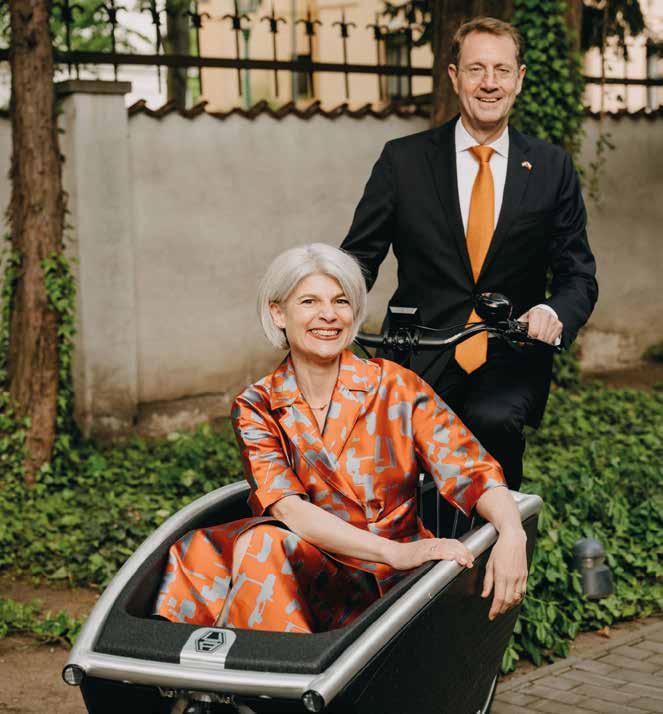
that we need for a successful European Union.
The cherry on the cake of my tenure in Czechia was the state visit of King Willem-Alexander and Queen Máxima. President Petr Pavel and the First Lady Eva Pavlová demonstrated genuine warmth in their hospitality as they welcomed our royal couple at Prague Castle and accompanied them during their two-day program, which included visits to People in Need and Radio Free Europe, and the inauguration
of the Freedom Bell in Saint Salvator Church.
My wife and I leave Czechia fulfilled and energised, ready for new discoveries in Türkiye, but also with a pang in our hearts as we leave many wonderful friends behind in the country we were honoured for four years to call “domov můj”.
Daan Huisinga
Ambassador of the Kingdom of the Netherlands to the Czech Republic (August 2021 – August 2025)
Last year, Czechia and Chile celebrated 100 years of diplomatic relations. Reflecting on his first year in the Czech Republic, H.E. Mr. Victor Abujatum, Ambassador of Chile, says that he has had “the opportunity to travel beyond Prague, meet with authorities, business leaders, academics, and artists, and witness a genuine interest in building closer ties with Latin America – and with Chile in particular”, and that “Chile values its relationship with the Czech Republic very highly”.
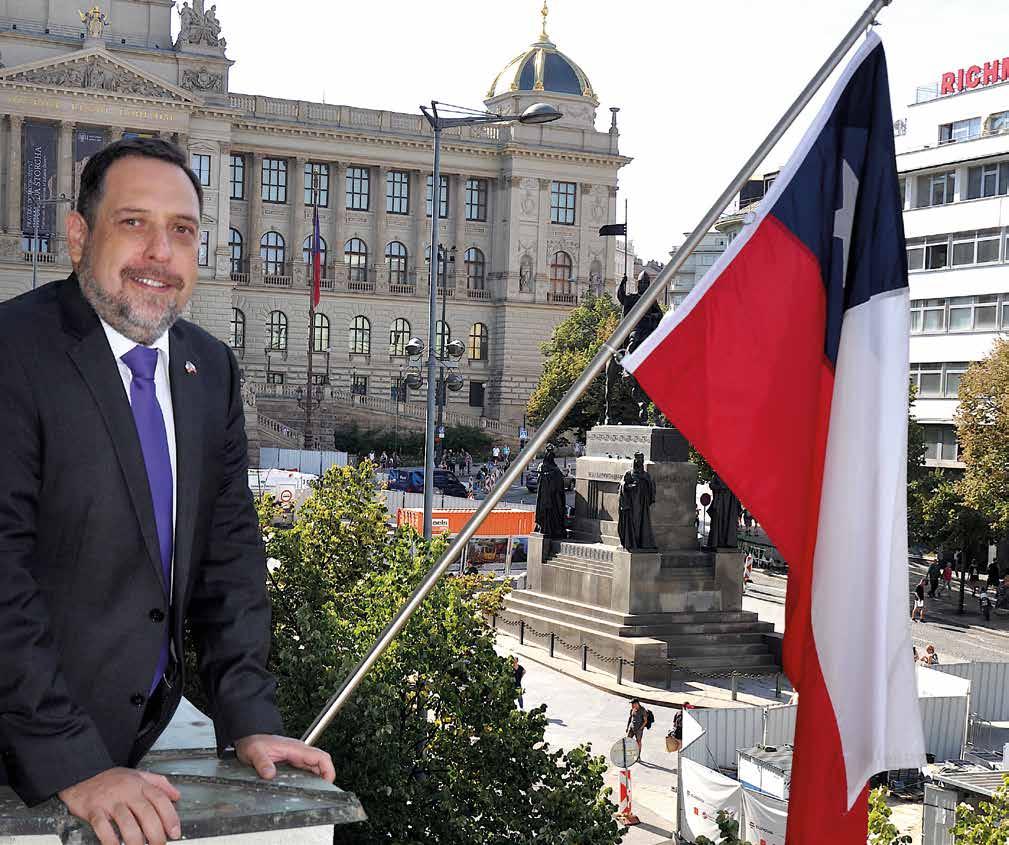
Can you start by sharing a bit about yourself?
I am a Chilean diplomat with a strong sense of public service and a professional career, who is dedicated to strengthening
Chile’s ties with the international community.
I spent my childhood in Germany, as my father was a political exile. Upon returning to Chile, I experienced a fairly normal
adolescence. After completing secondary school, I was drawn to study Public Administration at the University of Santiago. Before finishing my studies, I had the opportunity to begin working at the Ministry of Foreign Affairs,
which later led me to apply to the Diplomatic Academy of Chile to formally begin my diplomatic career.
I am passionate about history, culture, the arts, and the dialogue between nations. I firmly believe that diplomacy is essential for fostering peace, mutual understanding, and international cooperation. Outside of work, I value spending time with my children, reading, listening to music, attending the theatre, and going for walks outdoors.
And what can you tell us about your country?
Chile is a remarkably diverse and fascinating country. Its geography is defined by its unique shape, stretching over 4,270 kilometres between the Andes Mountains and the Pacific Ocean. Historically, Chile has been a peaceful and democratic nation, known for its political stability, stunning landscapes, and strong literary tradition. We are often identified internationally through our copper exports, world-class wines, tourism in Patagonia and Rapa Nui, and our astronomical observatories.
In recent years, Chile has increasingly prioritised clean energy and technological innovation as key pillars of its development, capitalising on its natural advantages and institutional strength.
What did your path towards becoming an ambassador look like?
From a young age, I was drawn to international affairs, intercultural understanding, and the role that a country like Chile can play on the global stage.
Becoming a diplomat allowed me to channel that vocation for public service in an international context, which has been profoundly
enriching – particularly through my work in embassies and consulates abroad.
I began working at the Ministry of Foreign Affairs in 1997, so being appointed Ambassador has been a natural outcome of a professional journey dedicated to representing Chile with commitment, strategic vision, and a deep sense of service. It is both an honour and a responsibility, enabling me to build bridges, create opportunities, and promote Chile’s values and interests across different settings.
How many countries have you served in?
Throughout my diplomatic career, I have had the privilege of serving in a variety of Chilean missions abroad. I have been posted to Ankara (Turkey), Miami (United States), and Berlin (Germany) –each within different bilateral and consular frameworks that have broadened my understanding of international dynamics and strengthened my representational skills.
These have been incredibly enriching and diverse experiences, both professionally and personally. Each posting has left a lasting mark on my heart, not only for what I learned, but also for the people, cultures, and challenges that shaped each chapter of my journey.
Does being an ambassador easily fit into your lifestyle?
Being an ambassador is both a great responsibility and a privilege. It is a role that demands dedication, political sensitivity, attention to detail, and – above all – a strong capacity for adaptation and empathy to truly understand other realities and cultures.
This position allows me to live in accordance with my values: engaging with people from
diverse backgrounds, promoting dialogue, building connections, and proudly representing Chile.
I strive to maintain a balanced lifestyle, with time set aside for wellbeing, reading, physical activity, personal reflection, and staying closely connected with my children and loved ones. I believe that empathy, calmness, and an open-minded view of the world are essential qualities for practising diplomacy with authenticity.
It’s been about a year since you arrived at your post in the Czech Republic. Can you share some of your impressions?
I had already visited Prague as a tourist several years ago and was deeply impressed by the city’s beauty and serenity, as well as the way its history is so vividly present in every corner. I was also struck by the high degree of organisation and by the excellent quality of life in the country. I have always admired the rich cultural depth that characterises Czech society.
This first year in the Czech Republic has been intense and deeply rewarding. I have had the opportunity to travel beyond Prague, meet with authorities, business leaders, academics, and artists, and witness a genuine interest in building closer ties with Latin America – and with Chile in particular.
What I value most is the warm reception and interest shown towards my country and its culture, as well as the opportunity to strengthen bilateral ties in many areas. On a personal level, it has been a year of great learning, and of building relationships based on trust and mutual respect.
What do you do in your free time?
In my free time, I enjoy activities that allow me to reconnect with
myself and unwind from the demands of work. I greatly enjoy walking, particularly in natural settings or places with distinctive architecture.
I also listen to music, read, and, whenever possible, attend cultural events and art exhibitions – Prague offers a wealth of such opportunities.
I deeply value simple yet meaningful conversations, spending time with friends or colleagues in relaxed settings, and discovering new corners of the city or the country.
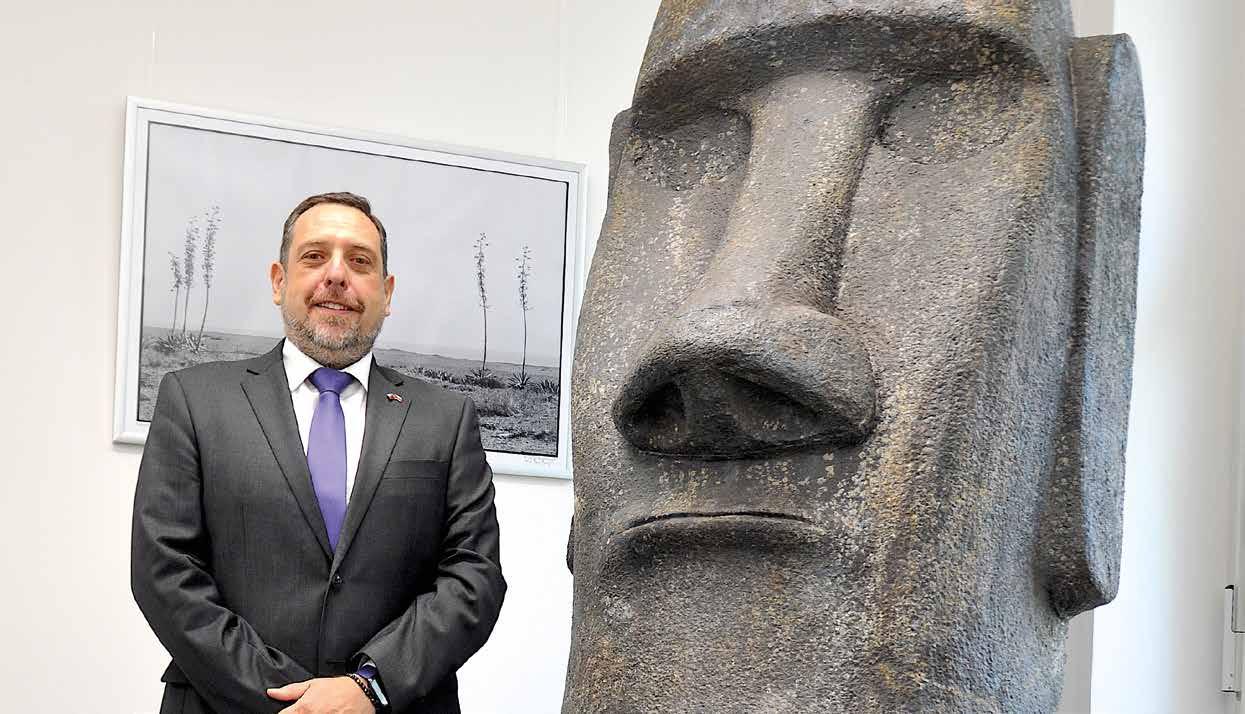
Most importantly, I always strive to remain closely connected with my children, who do not live with me in Prague but are an essential part of my life.
How do you see the economic situation in Chile right now?
Chile has historically maintained a very open and relatively stable economy, supported by strong macroeconomic fundamentals and active integration into global markets. Our extensive network of free trade agreements is a clear expression of that openness.
Like many upper-middle-income countries, we face structural challenges such as reducing inequality, boosting productivity, and respon-
ding to demographic changes such as population ageing. At the same time, we have significant opportunities to transition towards a more inclusive, sustainable, and innovative economy.
Priority sectors include energy transition, green hydrogen, lithium production, and technological and scientific development. Chile is also working to diversify its productive base and strengthen its social fabric, with the aim of achieving growth that is both economically sound and humanly inclusive.
Is Chile viewed as a holiday destination for Czech people? How do you promote your country?
Yes, Chile is increasingly seen as an attractive destination for Czech travellers – particularly those seeking breathtaking natural landscapes, authentic experiences, and a connection with a rich and diverse geography and culture. In that sense, Czech visitors find strong resonance with what Chile has to offer.
The highlights include Patagonia, the Atacama Desert, Rapa Nui, glaciers, national parks, astronomical observatories, and worldrenowned vineyards.
At the embassy, we promote Chile through various initiatives, including cultural events, partnerships with universities and research centres, and participation in tourism and
business fairs. We also use digital platforms and social media to highlight Chile’s attractions and reinforce its image abroad.
Our aim is for Chile not to be perceived solely as a distant country, but as a welcoming, modern, diverse, and culturally vibrant destination, offering truly memorable experiences.
What is the current status of Czechia-Chile relations?
Chile and the Czech Republic enjoy excellent relations, underpinned by a strong alignment of values, including a shared commitment to democracy, human rights, multilateralism, and sustainable development. We are what are often referred to as like-minded countries, which facilitates dialogue and cooperation across a wide range of areas.
Last year, we celebrated 100 years of diplomatic relations, a milestone that reflects the depth and continuity of our ties. In this context, we were honoured to receive the recent official visit of
Chile’s Minister of Foreign Affairs, Mr Alberto van Klaveren, to Prague – an important moment that reaffirmed our shared commitment to an active, outward-looking, and cooperative foreign policy.
Our current cooperation spans education, science, clean energy, trade, human rights, technological innovation, and Antarctic research – an area where both countries share a long-term vision and environmental responsibility. We are also witnessing an increase in cultural and academic exchanges, which help bring our societies closer together. Chile values its relationship with the Czech Republic very highly, and we are fully committed to further strengthening our ties and exploring new avenues for bilateral and multilateral cooperation.
This interview is done on the occasion of the National Day of Chile. What would you wish for both countries on this special day?
This September, I wish for Chile to achieve unity, social justice,
internal cohesion, and a form of sustainable development that is inclusive and respectful of the environment and future generations. I hope we continue to be a country that defends democracy and human rights, values its diversity as a form of strength, and seeks to promote peace across the globe. I also wish that we would always be able to overcome our internal challenges through dialogue, responsibility, and mutual respect.
To the Czech Republic, I wish for stability, prosperity, and continued openness to the world, along with the preservation of its rich democratic and cultural heritage. It is a remarkable country, with an admirable history, and a society deeply committed to its identity and its role in Europe.
And to both Chile and the Czech Republic, I wish for ever-stronger friendship and cooperation – built on mutual respect, shared values, and a long-term vision grounded in trust and solidarity.
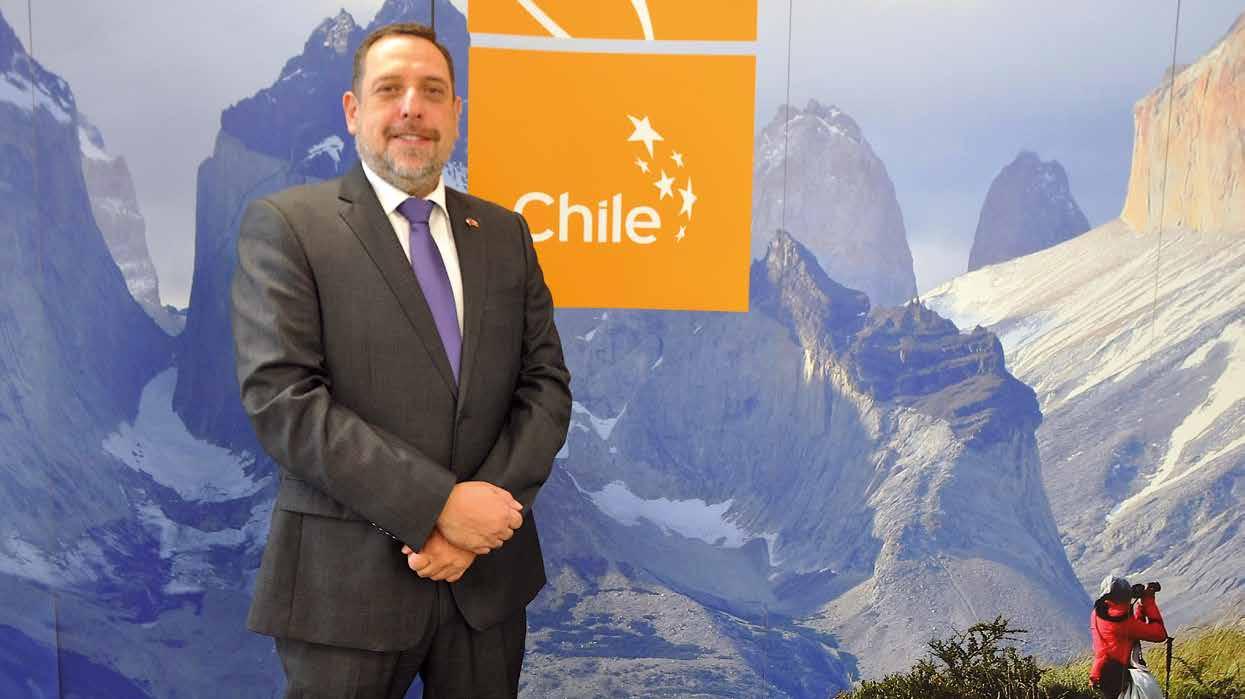
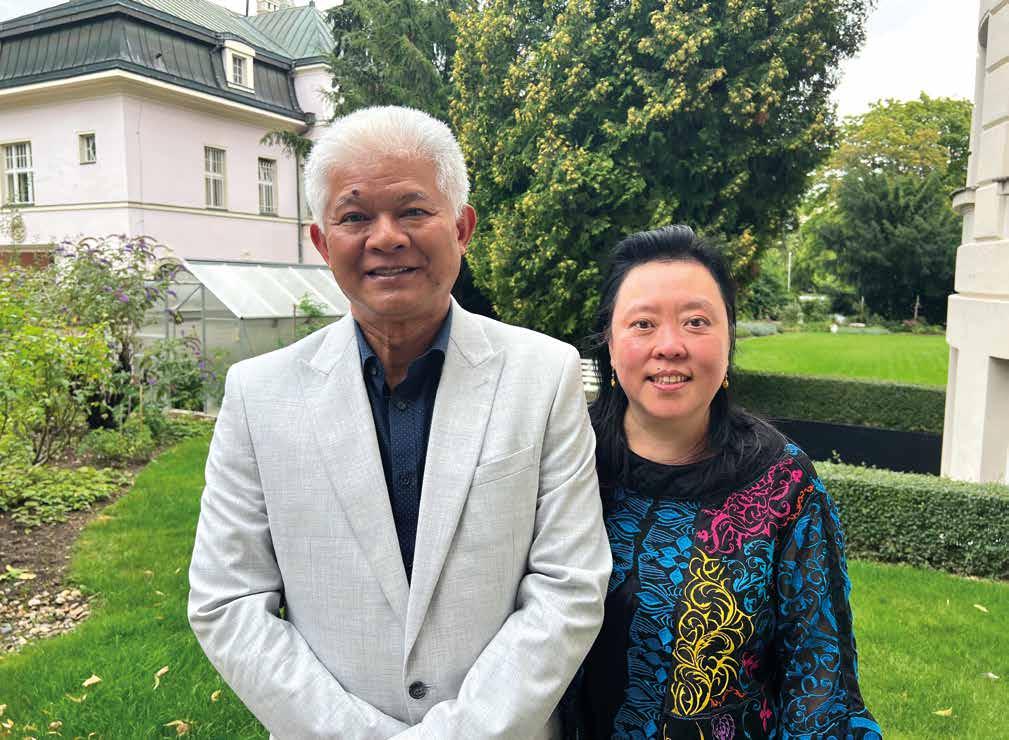
As my diplomatic career comes to an end, I would like to take this opportunity to express my sincere gratitude to the Government of the Czech Republic, authorities, colleagues, and all friends for the excellent support, cooperation, hospitality, and most importantly the friendship kindly extended to me.
As Ambassador to this country, I was very proud when we celebrated the 50th Anniversary of
diplomatic relations between the Kingdom of Thailand and the Czech Republic, which began on March 15th, 1974. The relationship has always been friendly and strong. Looking to the future, there are still many areas open for cooperation, such as education, science and innovation, start-up business, the automobile industry, and space technology. I believe we are going to do more to serve the economic potential currently existing between our two countries.
It has been a great honour to spend time in the Czech Republic, where memories were made every day. Saying goodbye to Czechia is never easy, but, for my wife and I, we will cherish all these memories forever.
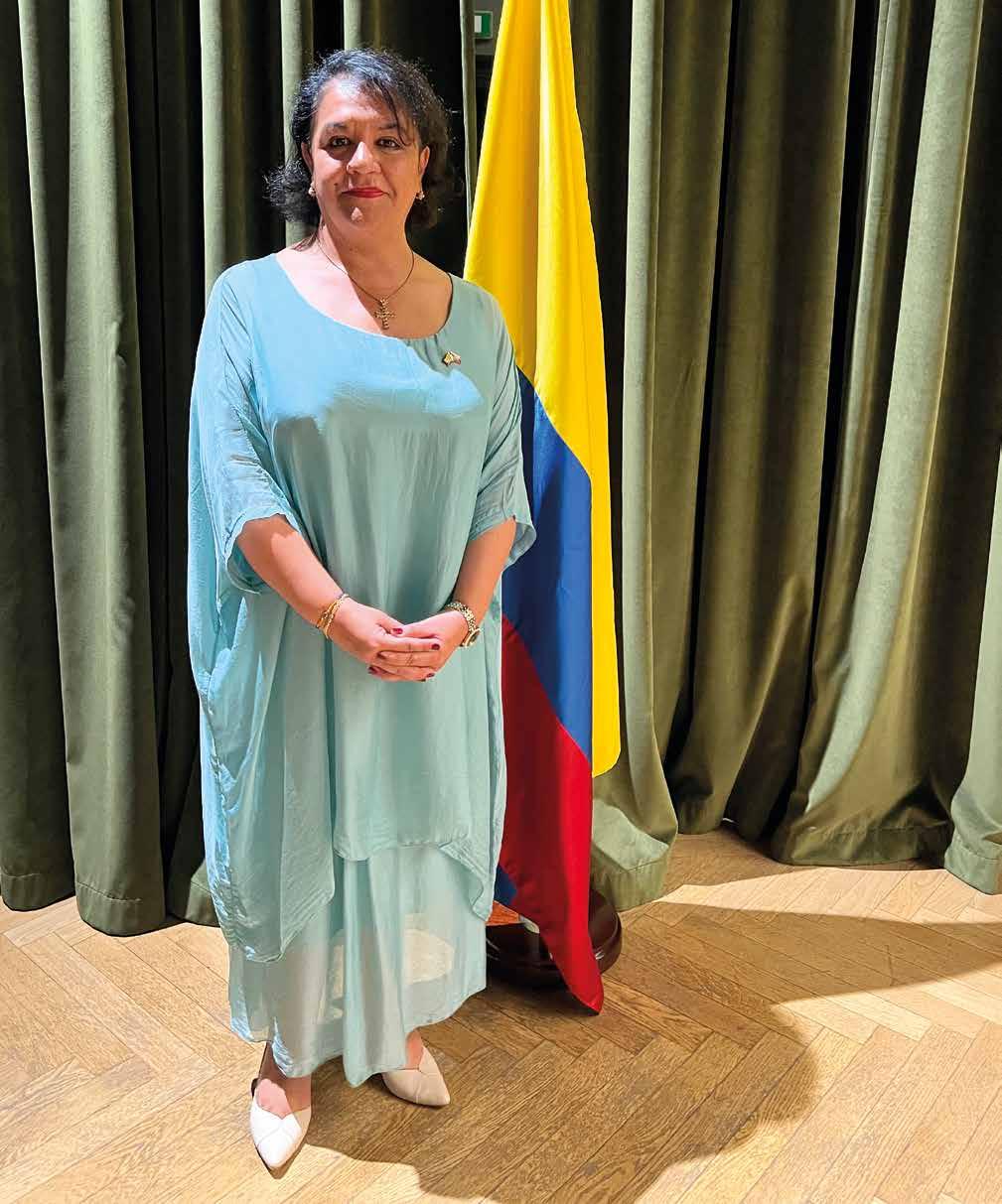
Colombia celebrates its 215th anniversary of independence this year, and just a year ago, Prague welcomed the first resident Ambassador of Colombia in the Czech Republic, H.E. Ms. Solangel Ortiz Mejia. We asked her about her country, her impressions of Czechia so far, and, of course, the relations between the two countries.
Can you tell us a bit about yourself first?
I was born in Bogotá. I am a lawyer and have worked for the State for 32 years, of which 27 have been as a career diplomat.
I have served in Chile, the Netherlands, Jamaica, Costa Rica, and now as ambassador in the Czech Republic. Additionally, I was Director of Oceanic Affairs and Legal Advice at a subregional international organisation –the Permanent Commission for the South Pacific (CPPS). In Bogotá, I held positions as Legal Chief and Director of Migratory, Consular, and Citizen Service Affairs.
What made you become an ambassador?
My interest in international affairs, the opportunity to work in different areas of international relations, and my desire to better
understand the world through my work.
And now, can you introduce your country?
Colombia is located in the northwest of South America, with coastlines on both the Pacific Ocean and the Atlantic Ocean. It is the only country in South America with access to both oceans. Its population exceeds 53 million inhabitants. It is the second most biodiverse country in the world, the fourth in animal destinations, and the best for birdwatching.
It has immense cultural and gastronomic richness. This year, on 20th July, we celebrate the 215th anniversary of our independence.
How do you promote Colombia as a tourist destination?
As I just pointed out, Colombia is a country of natural and cultural
diversity. The second most biodiverse country in the world, the fourth in animal destinations, and the top for birdwatching. We have the greatest variety of butterflies, whale-watching opportunities, many beaches on two oceans, the Amazon rainforest, deserts, and developed cities with a rich gastronomic scene, plus the charm and friendliness of the Colombian people.
What is the current economic state of Colombia?
We have a growth rate between 2.5% and 3%, an inflation of 4%, and a GDP per capita of US$6,500. We face many challenges to reverse inequality in Colombia, which is why we promote market openness and opportunities – through exports, attracting investments, and tourism.
Colombia enjoys a special status with NATO. Can you explain how it works?
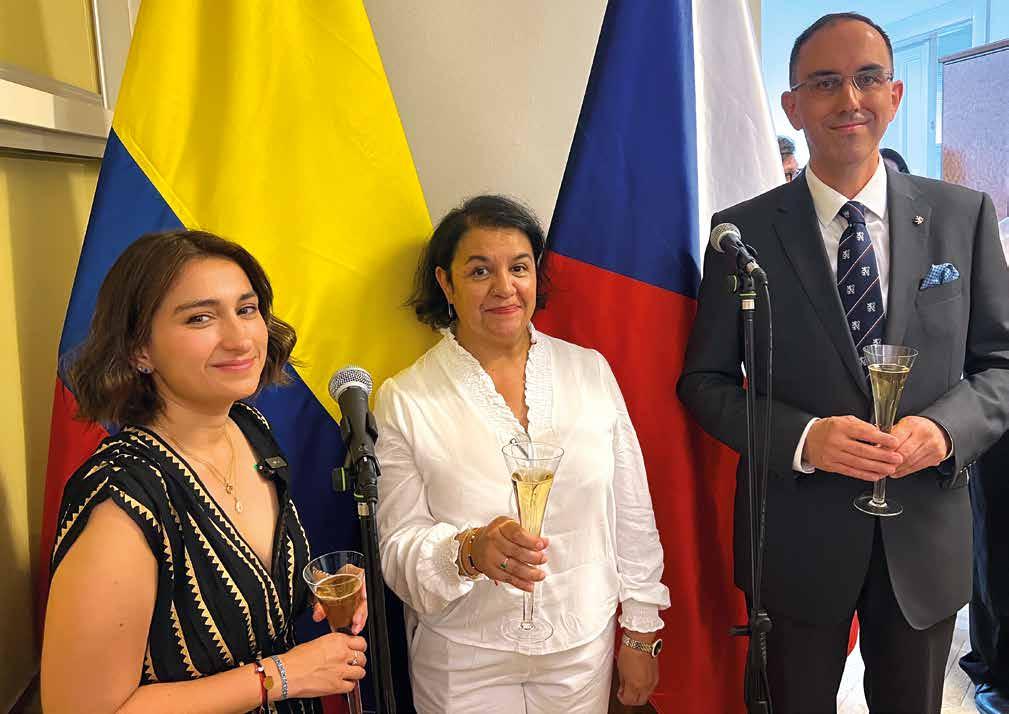
Colombia is not a member of NATO, but since 2018 it has been a global partner of the organisation. This status allows Colombia to collaborate with NATO in areas such as defence, maritime security, and technology, as well as participate in information exchange and experience-sharing processes.
Colombia is the only Latin American country with this designation.
You are the first resident Ambassador of Colombia in the Czech Republic. Can you share some impressions from your first year here?
I knew the Czech Republic as a tourist, and I have always found it a country rich in history, that preserves its symbols and architecture, and is consistent with its values.
Returning to the Czech Republic as an Ambassador has been interesting – it is a country with a lot of history, in a privileged geographic position – like Colombia – and with an interesting relationship with its neighbours, and, in general, with the European Union countries.
What is the current status of Czechia–Colombia relations?
With the opening of the Colombian embassy in the Czech Republic last year, we now have embassies in both countries and are advancing cooperation projects. This relaunch of relations will deepen efforts to explore other commercial and diplomatic opportunities that benefit both nations.
This interview is conducted on the occasion of your national day. What are your wishes for both your country and the Czech Republic?
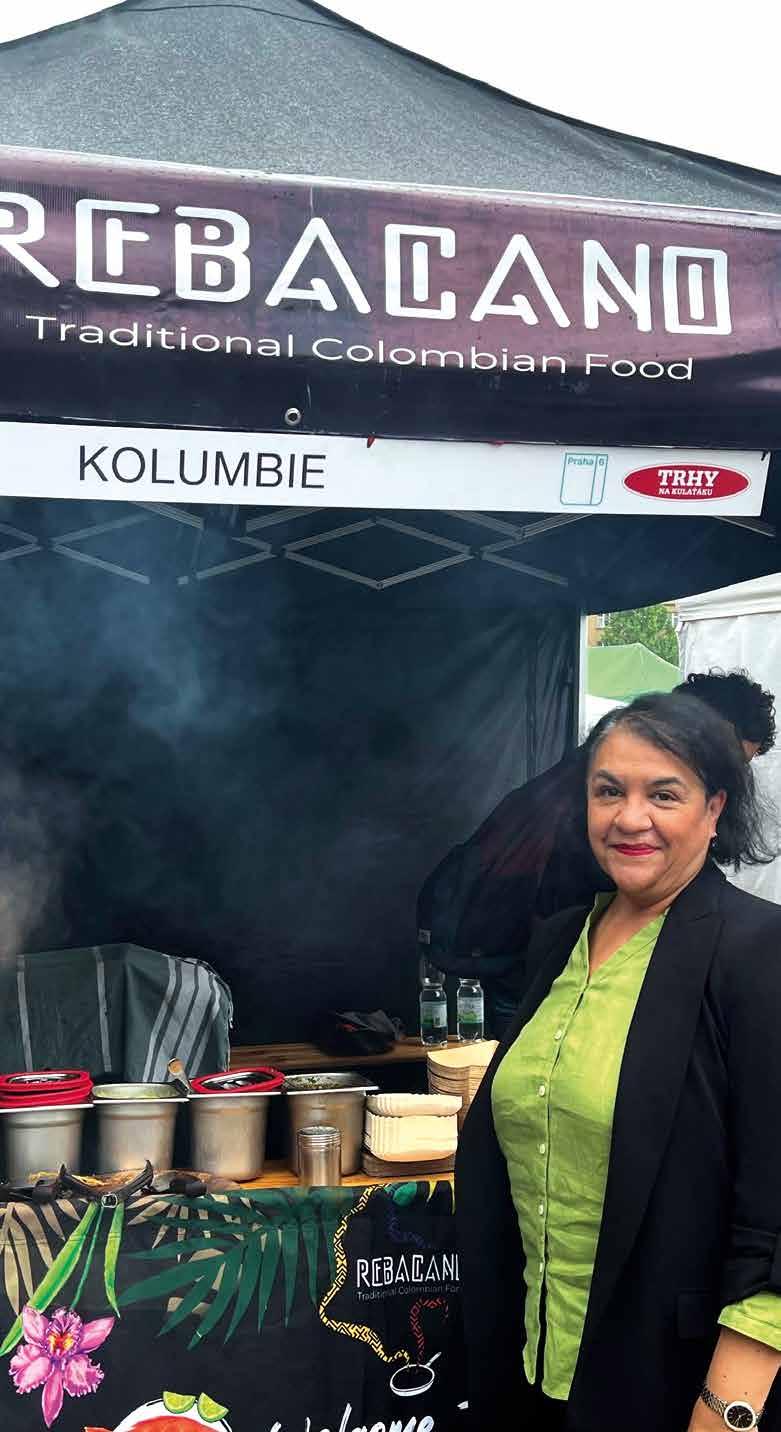
For Colombia, I wish that peace processes are implemented and achieved with all involved actors, which will allow for better development and wellbeing for Colombians.
For the Czech Republic, I wish it to continue being a safe country, with peace and good relations with its surroundings.

As my term in the Czech Republic has come to an end, I want to thank all my dear friends, colleagues, and partners, and reflect on my Czech experience. It has been a privilege to serve in Prague; promoting my country’s interests here. Diplomacy is about people. I am confident that the strong bonds we have established will continue to flourish, contributing to peace, prosperity, and mutual understanding.
I feel lucky to have met so many interesting personalities and characters during my months in Czechia. Thank you all for a great cooperation, many pleasant and giving conversations, and inspiring meetings with you. I also had the fortune of getting out of Praha, visiting many of the regions of Czechia. You have to get out of the capital to really understand a country. That is true also of Czechia. The view of Prague might be different from inside the city and from the more remote areas of this beautiful country.
I wish to take this opportunity to express my deepest gratitude for
the warm welcome, unwavering support, and fruitful collaborations that I have experienced during my time here. It has been an honour and a privilege to serve in this vibrant country, and I am sincerely grateful for the meaningful relationships I have built with individuals, institutions, and organizations across Czech society.
My term in the Czech Republic has been an enriching journey marked by numerous opportunities to foster bilateral relations. From the very beginning, I was impressed by the Czech Republic’s rich history, cultural diversity,
and commitment to democratic values. These qualities have made my diplomatic mission both inspiring and rewarding. The location of Czechia in the middle of Europe makes Praha an excellent observation tower for both European and global policies. The terrible war in Ukraine and a new president in the United States have of course influenced my tenure here.
The good cooperation between Norway and Czechia is based on shared values such as democracy, human rights, and sustainable development. This cooperation has only deepened over the past years. We are both parts of the European internal market, and the cooperation in the European Economic Area is extensive and wide. Through the EEA and Norway Grants programs we cooperate closely in research, education, environment, health, social affairs, civil society, and minorities rights (just to mention a few).
Throughout my appointment, I had the pleasure of engaging with Czech government officials, business leaders, academia, and civil society. These interactions have reinforced my belief in the importance of dialogue and cooperation in achieving common
objectives. Likewise, I am grateful to the Norwegian companies and organizations operating in the Czech Republic for their dedication and contribution to economic ties and cultural exchange.
Cultural diplomacy has also played a vital role in my mission. I had the fortune of attending numerous events here such as those with Norwegian musicians, writers, and filmmakers, which contribute to building bridges that last beyond political and economic interests. I am proud of all these cultural events, exhibitions, and academic exchanges.
The many Norwegian students in Czechia and the many young Czechs studying the Norwegian language in Praha and Brno also contribute to building relations, as well as enhancing the understanding between our countries. These initiatives are investments in the future. The partnership between Czech and Norwegian universities encourages research, innovation, and shared learning.
Looking back, I feel lucky to have served in Prague during exciting times. The geopolitical shifts require continued collaboration and resilience. We live through a period in Europe and in the world with less predictability.
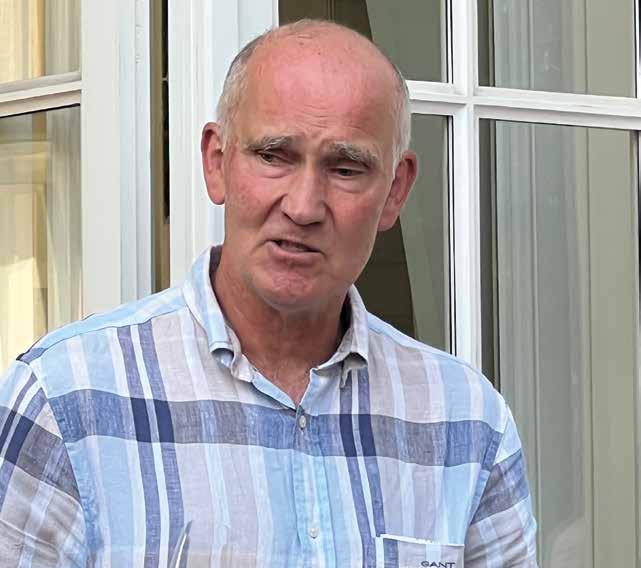
Nobody knows what will happen tomorrow. To meet the challenges, we have to work together. It is not up to one leader to dictate to all the others. Diplomacy is probably more needed than ever, both in Europe and in the world.
In closing, I want to express my heartfelt gratitude for the kindness, trust, and camaraderie extended to me throughout my service here. To my colleagues in the diplomatic corps, government institutions, academia, and civil society, thank you for your partnership and support. To the citizens of the Czech Republic, thank you for embracing the Norwegian presence and making my time here truly special, both in the cities and towns, but also in the fabulous nature here.
I am confident that the strong bonds we have established will continue to flourish, contributing to peace, prosperity, and mutual understanding. I carry with me the fondest memories of my time here, and look forward to witnessing the continued friendship between our countries.
TEXT:
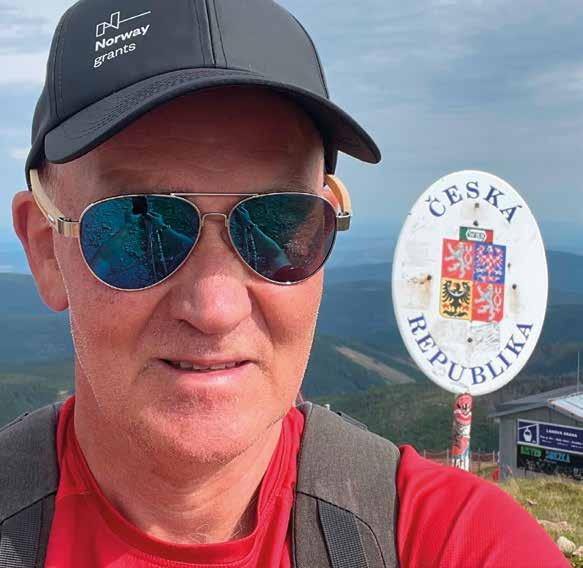
Having held his position for 18 years, H.E. Mr. Tan Soo Khoon, Ambassador of Singapore, is one of the longest-serving ambassadors to Czechia. “I am happy to be accredited to the Czech Republic, with which Singapore enjoys a warm and friendly relationship”, he assures us. It appears he is not the only Singaporean with a positive view of our country, as he adds that “Prague is high up on the list of places to visit for many Singaporeans”. What else did he share with us about his country and Singapore-Czechia relations?

Can you introduce yourself and describe your path to becoming an ambassador?
I was born in Singapore in 1949, and graduated from the University of Singapore in 1971 with an Honours Degree in Business Administration. I was first elected as a Member of Parliament in 1976, and contested in seven general elections. Parliament elected me as Speaker for three terms, starting in 1989, and I served in this position for 13 years until 2002, when I returned to the back bench for another term. I retired from politics in 2006.
I run a family business and serve as the Chairman of the Board of a property and investment company listed on the Stock Exchange of Singapore. I have been the Honorary Patron of the Down Syndrome Association of Singapore since 2007.
When I retired from politics, the then-Minister for Foreign Affairs asked if I would like to be the Ambassador to the Czech Republic. I am very happy to take up this appointment, as it is a great honour to be able to represent my country in such an important position. I am particularly happy to be accredited to the Czech Republic, with which Singapore enjoys a warm and friendly relationship.
In my free time, I like to be with my family and friends and to read up on current affairs. I also enjoy listening to pop music and watching movies.
You have been accredited to the Czech Republic for an amazing 18 years. What has been your impression of the country during this time?
During this period, I have been able to observe the Czech Republic emerging as a country with one of
the highest GDP per capita in the Central and Eastern European region. The Czech Republic’s economy is underpinned by its manufacturing and ICT sectors, which are among the most advanced in the Central and Eastern Europe region. The Czech Republic is also investing in developing its high-tech industries, with growing strengths in the niche areas of nanotech and medtech.
As one of the longest-serving ambassadors to the Czech Republic, what advice would you give to your future successors?
Czech people across all segments of society are friendly, approachable, and always receptive to dialogue, particularly on topics of mutual interest. By expressing their views with honesty, sincerity, and respect, all foreigners, be they ambassadors or otherwise, will likely foster positive and productive interactions.
The name of your country, Singapore, means Lion City, and is known as one of the Four Asian Tigers. Can you tell us about your country?
Singapore is a small city-state located on the southern tip of the Malay Peninsula. We used to be a British colony, and gained independence in 1965. Since then, Singapore has developed into a global hub for trade, manufacturing, and finance, bridging East and West. In fact, Singapore’s trade volume is three times our GDP. Our ports and airports are among the busiest in the world, and Singaporeans are proud of our country’s safety, cleanliness, and efficiency.
Despite our small size, we are home to around 6 million people from many different backgrounds. Our multicultural country has four official languages: English,
Chinese, Malay, and Tamil. Malay is our national language, and English is our working language. Singaporeans of different ethnicities and religions live together and often come together to celebrate different festivals like Chinese New Year, Deepavali, Hari Raya, and Christmas. We respect all religions and cultures, and this diversity is a big part of our identity.
Do you work on attracting more Czech tourists to Singapore?
As Ambassador to the Czech Republic, I’m proud to promote Singapore as a holiday destination. But before promoting Singapore, I want to share that as much as the Czech people love visiting Singapore, Singaporeans love visiting the Czech Republic as well! Prague is high up on the list of places to visit for many Singaporeans. In fact, the Czech Republic is known in Singapore as a deeply historic, cultural, beautiful, and unique country.
As a small city-state, people might think of Singapore as an urban metropolis. However, Singapore has much more to offer, including lots of green spaces and nature. Singapore’s “Garden City” vision, introduced by our founding Prime Minister Lee Kuan Yew, who wanted to transform our city-state into a vibrant urban environment with abundant greenery, has now transitioned into a “City in a Garden” vision, aimed at integrating greenery into the daily lives of Singaporeans. Today, we have many green spaces and parks spread throughout the country that both tourists and locals can enjoy, such as Singapore Botanic Gardens (a UNESCO World Heritage Site), Gardens by the Bay, Fort Canning Park, Jurong Lake Gardens, and many more.
Our geographic location also makes us a gateway between Asia and the West. Tourists can see
stunning skyscrapers beside places of worship, bustling street food markets beside large shopping complexes, and peaceful green spaces in the heart of the city, all in a single day. They can even visit Buddhist temples, Islamic mosques, and Hindu temples all on one street! We have many different vibrant neighbourhoods for tourists to explore. From lively areas like Haji Street and Joo Chiat to cultural districts like Chinatown and Little India, tourists can get a flavour of the many different cultures within our country. While exploring Singapore, tourists can also enjoy affordable and delicious hawker food all around the island. Food is a big part of
our identity – our hawker centres are known for cheap, yet amazing dishes influenced by cuisines from all over the world. Singapore’s hawker culture has been recognised by UNESCO as a unique intangible cultural heritage.
Czech citizens can visit Singapore for up to 90 days without a visa. We enjoy summer all year round, so you can visit us to escape winter! We’re open to visitors of all ages. Whether you’re interested in shopping, history, nature, wildlife, adventure, or nightlife, there’s plenty for everyone to discover. Singapore is also perfect for families with young children,
who can enjoy the thrilling rides at Universal Studios Singapore, interactions with animals at the Singapore Zoo, or fun water slides at Adventure Cove Waterpark, among many other attractions.
Can you evaluate the current status of Czechia-Singapore relations?
Singapore established diplomatic relations with the Czech Republic over 50 years ago in 1973, and since then Czechia-Singapore relations have grown from strength to strength. As like-minded small countries, we share common interests in promoting free trade, multilateralism, and upholding

a rules-based international order. Our strong relationship includes many areas of sectoral cooperation, including trade and business, defence, digitalisation, and cybersecurity. We work together at international organisations, including the United Nations. Singapore was delighted to welcome Speaker of the Chamber of Deputies Markéta Pekarová Adamová in 2024, Prime Minister Petr Fiala and Minister of Transport Martin Kupka in 2023, and thenPrime Minister Andrej Babiš in 2019.
We welcome Czech businesses to leverage Singapore as a gateway and launchpad to access opportunities in the vibrant and fast-growing Southeast Asian and Asian markets. Singaporean companies are also interested in tapping into the Czech Republic’s strategic location in Central Europe. Singapore and the EU have concluded agreements such as the EU-Singapore Free Trade Agreement (EUSFTA) and the EU-Singapore Digital Trade Agreement (EUSDTA). Since the EUSFTA entered into force in 2019, bilateral trade in goods between Singapore and the Czech Republic has grown by over 50%, exceeding S$2.1 billion in 2024, while bilateral trade in services has grown by nearly 120%, exceeding S$200 million in 2023. The signing of the EUSDTA in May 2025 reflects our shared commitment to a modern, open, and rulesbased digital economy. We look forward to further opportunities to deepen business-to-business linkages, as well as to enhance digital connectivity between our two countries.
Czechia-Singapore relations are constantly evolving. New areas of cooperation, such as AI and technology, are emerging and have become especially relevant given the Czech Republic’s leadership in innovation and the knowledgedriven economy. We are seeing more and more exchanges
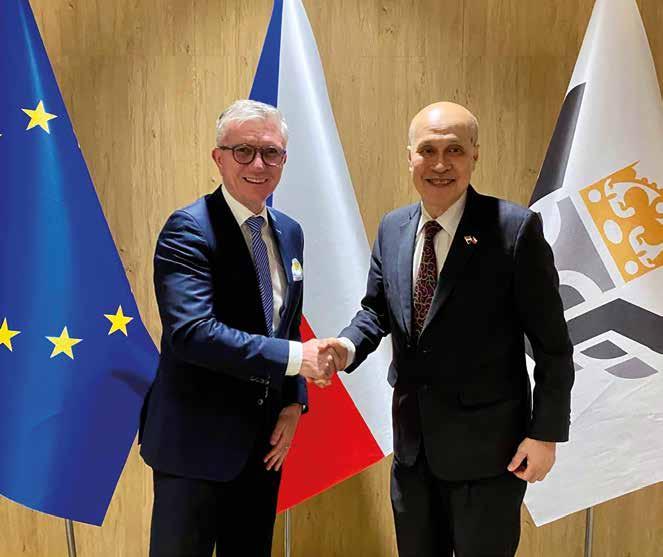
between Czech and Singaporean businesses in these fields. For example, a business mission led by the Czech Association of Artificial Intelligence participated in Singapore’s AI Week in June 2025 and met many Singaporean businesses.
Cultural exchanges are another highlight of Czechia-Singapore relations. For example, the Singapore Symphony Orchestra (SSO) has had several Czech musicians, such as Pavel Prantl, who was the SSO’s first concertmaster from 1981 to 1993. More recently, Victoria Concert Hall in Singapore hosted Czech pianist Karel Košárek in July 2025, who enthralled the audience with the music of Czech composers Bedřich Smetana and Bohuslav Martinů. The European Film Festival 2025 in Singapore also featured Waltzing Matilda, directed by Czech director Petr Slavík. Film and music aside, the Czech Republic and Singapore enjoy good educational exchanges on internships, scholarships, and academic exchange programmes. Such interactions foster deeper connections between our peoples.
You celebrated Singapore’s national day in August. Would you like to take this opportunity to share your wishes for your country and the Czech Republic?
Czechia-Singapore bilateral relations are deeply rooted in shared beliefs, mutual interests, and strong cooperation in various sectors. However, I believe that we still have many more areas of potential collaboration that we can explore together, both bilaterally and via ASEAN and the EU. These include sectors such as cybersecurity, high-tech industries, and sustainability. Despite being thousands of kilometres away from each other, the Czech Republic and Singapore should continue to enhance their ties for the benefit of both our peoples. On the occasion of Singapore’s National Day, I wish for even stronger bilateral relations between our two countries, and for our two countries to continue to prosper!
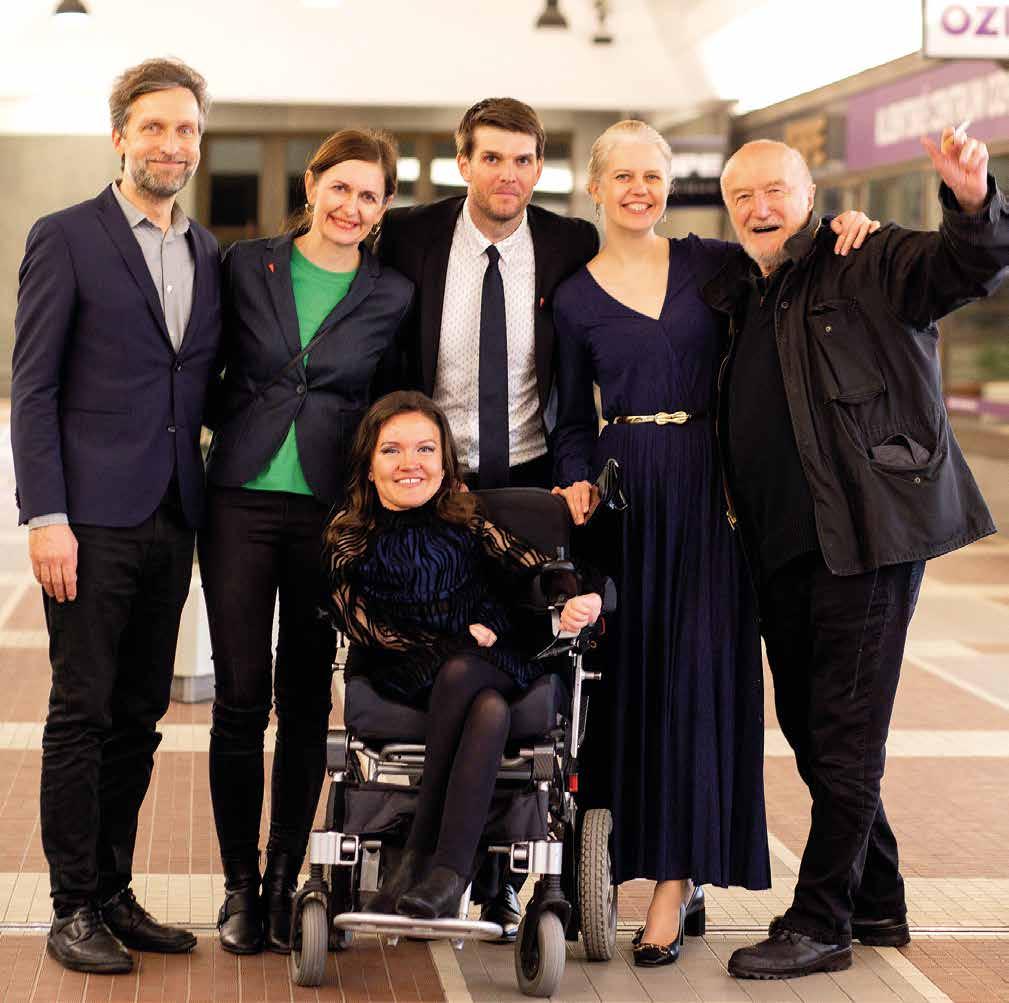
To begin, could you tell us a bit about yourself?
I am originally from Lithuania, but I’ve been living in the Czech Republic for over 30 years. I enjoy travelling, reading, listening to
music, and, of course, spending time with my dog Bertík, who brings a lot of joy into my life.
I’m also interested in sustainable living, and try to incorporate environmentally friendly habits into my everyday life.
The Committee of Good Will – Olga Havel Foundation is one of the first non-profit organisations established after the Velvet Revolution. Over the past 35 years, it has distributed almost one billion CZK, and has helped over 60,000 people in need. Monika Granja, the director, has been working for the foundation for almost 20 years.
“As society evolves, our assistance evolves too,” she says. “I believe Olga Havel would be very happy to see how many people are now involved in the work of the Committee of Good Will, and how it has remained a vibrant and active institution.”
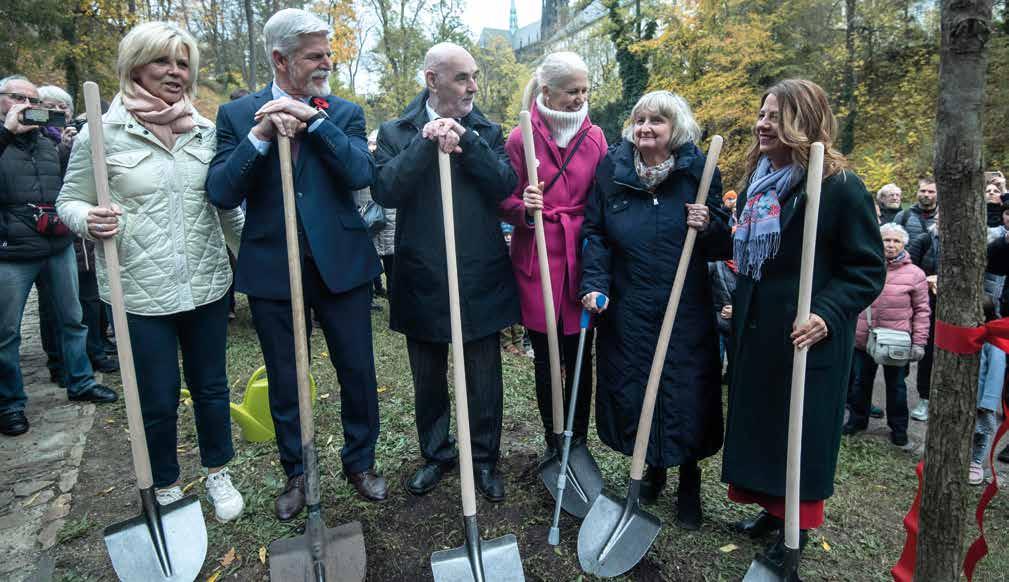
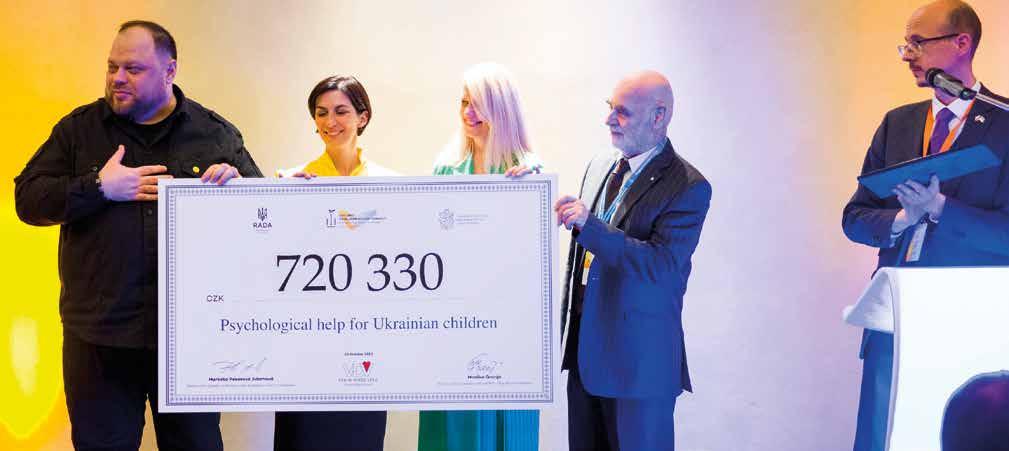
from a fundraiser for psychological
Tell us about the foundation.
It has been almost 20 years since I began working for the Committee of Good Will – Olga Havel Foundation. One of the first non-profit organisations established after the Velvet Revolution, it was founded by Olga Havel together with her friends from the
dissident movement. In the early years, when the civic sector was just being formed, our activities were very broad – from delivering humanitarian aid from abroad, to supporting hospitals and institutions, as well as helping individuals directly. Today, our work is more focused, but we continue to provide assistance throughout the
Czech Republic, supporting both organisations and individuals.
What is unique about the foundation’s activities?
We follow Olga Havel’s principle: to help where no one else helps, or where help is insufficient. Our aid is always quick and targeted –
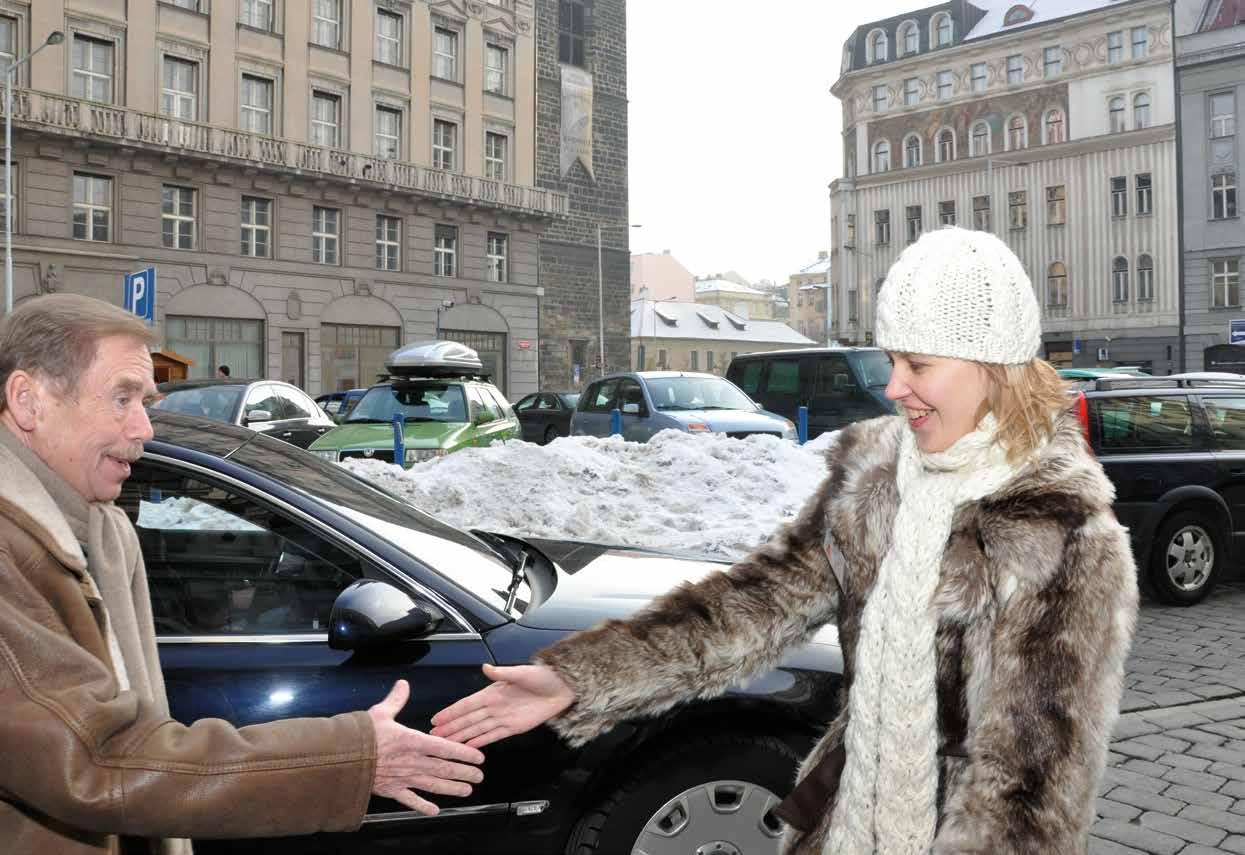
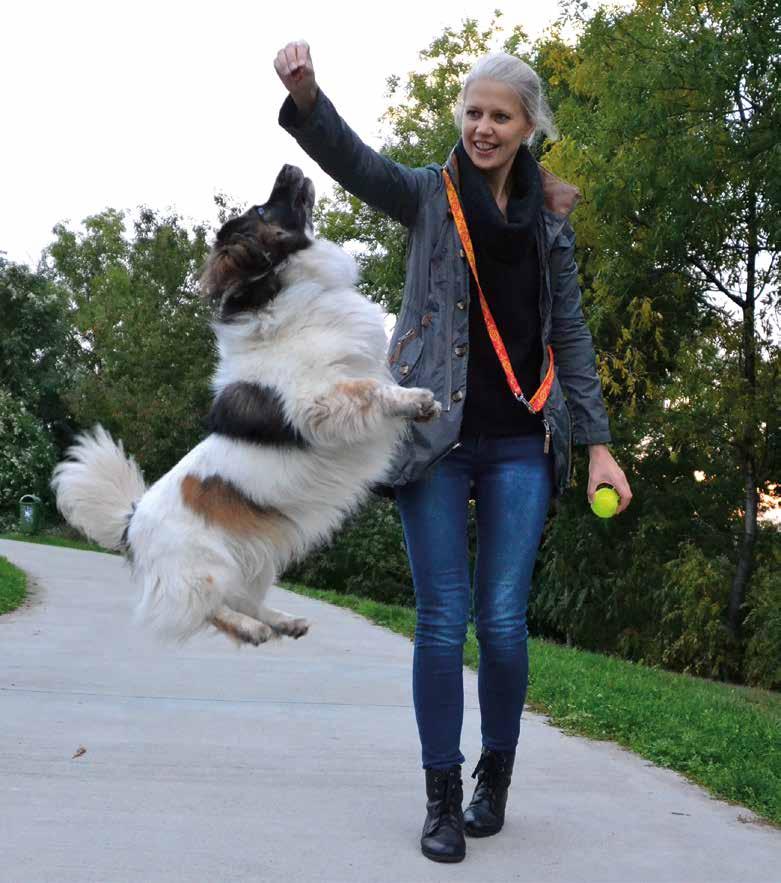
as the saying goes, he who gives quickly, gives twice.
This year marks the 35th anniversary of the Committee of Good Will. Can you share some highlights?
Over the past 35 years, we’ve distributed almost one billion CZK and have helped over 60,000 people in need. Many of our key projects still carry Olga Havel’s personal legacy – such as “Paths to Integration” for people with disabilities, the Education Fund supporting disadvantaged students, and our Senior Program. As society evolves, our assistance evolves too. In recent years, we’ve expanded our work to include support for palliative care, help for homeless people, and psychological support for children from Ukraine. We’re also actively involved in developing civil society – through a consortium with the OSF Foundation and the

Scout Institute, we’ve supported various projects, with a total of 300 million CZK.
You are from Vilnius, Lithuania. Why did you choose to settle in the Czech Republic?
I came to what was then Czechoslovakia after finishing high school in Vilnius. I was awarded a scholarship to study law at university, with the condition that I learn Czech and pass the entrance exams in the Czech language within a year. So, I spent a year at the language and professional preparation centre in the castle in Poděbrady and then successfully passed the entrance exams for the Faculty of Law at Charles University. Interestingly, I later found out that Václav Havel
and Miloš Forman had studied at the same castle years before me.
You have worked in the non-profit sector for over 25 years. How has it changed over time?
The non-profit sector is constantly evolving, responding to new needs and often coming up with innovative solutions. What remains unchanged is its flexibility, diversity, and the passion of the people working in it. Many times, I’ve seen non-profit organisations step in during crises when the state was hesitating. Just remember how much support NGOs provided to seniors and other vulnerable groups during the COVID-19 pandemic, or to Ukrainian refugees more recently. The sector
plays a critical role during every humanitarian crisis.
The foundation helps many people. Could you give us some examples?
One example is our Education Fund, which helps young people overcome barriers to education. Our scholarship holders are students with disabilities, from socially disadvantaged backgrounds, or those who have experienced institutional care. At this year’s Olga Havel Award ceremony, several current or former scholarship recipients performed – including pianist Tomáš Kačo, a young Romani man whom we supported during his studies at the Academy of Performing Arts in Prague. Tomáš
not only had great talent but also a big dream – to conquer the world. And he did! He’s one of the few Czechs who performed at Carnegie Hall, and he now lives and performs in the United States.
The Committee of Good Will was founded by Olga Havel, the first wife of President Václav Havel, in 1990. If she were with us today, what would she be proud of?
I believe Olga Havel would be very happy to see how many people are now involved in the work of the Committee of Good Will,
and how it has remained a vibrant and active institution. She would certainly be pleased to see that goodwill continues to spread and has, perhaps without us fully realising it, become one of the pillars of Czech national identity. And that simple, everyday acts of kindness are gradually changing the social atmosphere for the better.
What are the goals of the Committee of Good Will for the next 10 years?
For us, it’s essential to always be there for those who need our
help, no matter what form that help takes. And we want to be here not only for the next 10 years but for the next 20, 50, or even 100 years. That’s why we focus on building and maintaining strong, sustainable foundations for our organisation, so that we can continue Olga Havel’s mission well into the future.

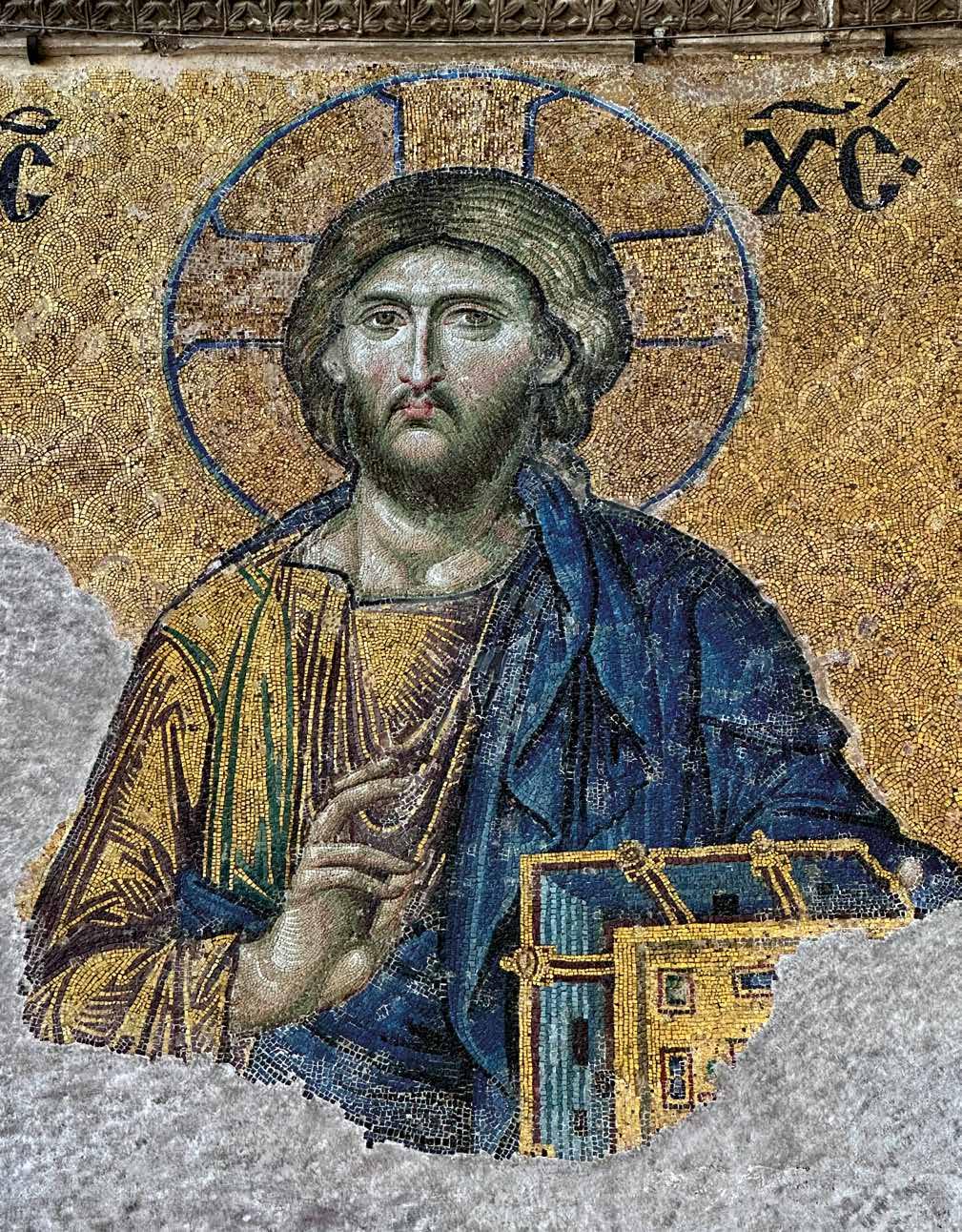
At the gracious invitation of His Excellency the Ambassador of the Republic of Türkiye and his esteemed spouse, historian and orientalist Lukáš Kubín delivered an engaging and thought-provoking lecture titled “Istanbul: Three Cities, Three Stories”. The event brought together members of the diplomatic community, scholars, and cultural figures for an evening dedicated to one of the world’s most fascinating cities—a place where empires have risen and fallen, and where cultures, faiths, and ideas have met for millennia.
Drawing on expertise honed at Oxford University and enriched by years of travel and research, Kubín offered the audience a vivid journey through time, from the founding of Byzantium, through
the splendor and turbulence of Constantinople, to the vibrant metropolis of modern Istanbul. He emphasized that Istanbul is not merely a city, but a living symbol of continuity and reinvention, standing at the meeting point of Europe and Asia, of the past and the future. Kubín began by reflecting on the city’s mythical and historical origins. According to legend, the founding of Byzantium was guided by an oracle of Delphi. As a modest colony of Megara, Byzantium thrived on trade, thanks to its strategic position along the Bosphorus. It was, even then, a place of crossroads— where mariners, merchants, and warriors from diverse lands met and mingled.
The lecture then turned to the Roman and Byzantine eras, with
particular attention to the refounding of the city as Constantinople by Emperor Constantine the Great in 330 CE. Kubín illuminated how Constantine’s vision transformed Byzantium from a provincial city into a capital worthy of empire—a new Rome that sought to unite the Christian faith with imperial power. The city became a magnificent stage upon which religious, political, and cultural dramas unfolded. The construction of Hagia Sophia, the Hippodrome, and the formidable city walls reflected both ambition and resilience. Kubín highlighted how Constantinople, while becoming a center of Christian faith, also retained layers of its earlier traditions. The city’s religious landscape was, for a time, eclectic: the memory of pagan gods

lingered in its streets and monuments, even as churches rose in place of temples. It was, as Kubín noted, a place where “the past was never entirely erased, only rewritten.”
The audience was drawn into tales of siege and survival, from the onslaught of Persians, Arabs, and Crusaders to the final dramatic fall of the city to the Ottomans in 1453. With the rise of Istanbul, Kubín showed how the city once again reinvented itself. Under the Ottomans, it became not only a political capital, but a spiritual heart of the Islamic world, and a beacon of artistic and architectural achievement. Yet the layers of history remained visible, with mosques rising beside ancient forums, and markets thriving where imperial processions once passed.
What distinguished Kubín’s lecture was not simply his command of historical detail, but the way he invited his audience to reflect on deeper questions: What does a city like Istanbul teach us about power, identity, and resilience? How does a city at the crossroads of worlds navigate the tensions of change? In his conclusion, Kubín proposed that Istanbul is, above all, a city of lessons. It teaches that power is fleeting, but culture endures. That the strongest cities and civilizations are those that absorb, adapt, and transform rather than resist the tides of change. That history is not linear, but layered—and that those layers, far from being a burden, are what gives a city its richness and meaning.
The evening left a lasting impression on the diplomatic audience,

many of whom serve in cities with similarly layered identities and shared histories of dialogue and conflict. Kubín’s lecture served as a reminder of the importance of cultural understanding and historical perspective in today’s interconnected world.
As the lecture drew to a close in the elegant surroundings of the ambassador’s residence, there was a shared sense that Istanbul’s story is not only the story of a city—but a metaphor for the shared human experience: of survival, transformation, and the endless search for belonging at the meeting place of worlds.
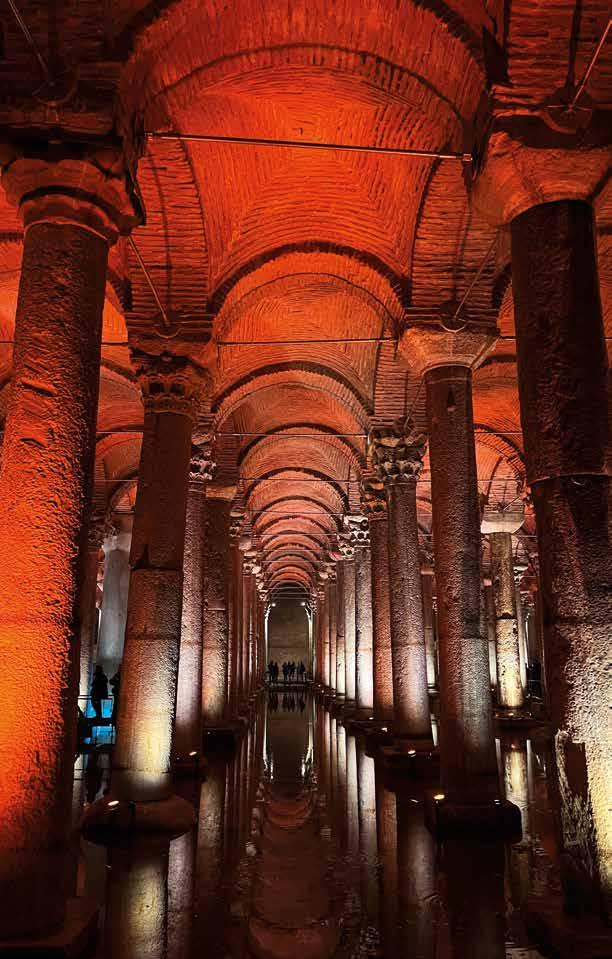
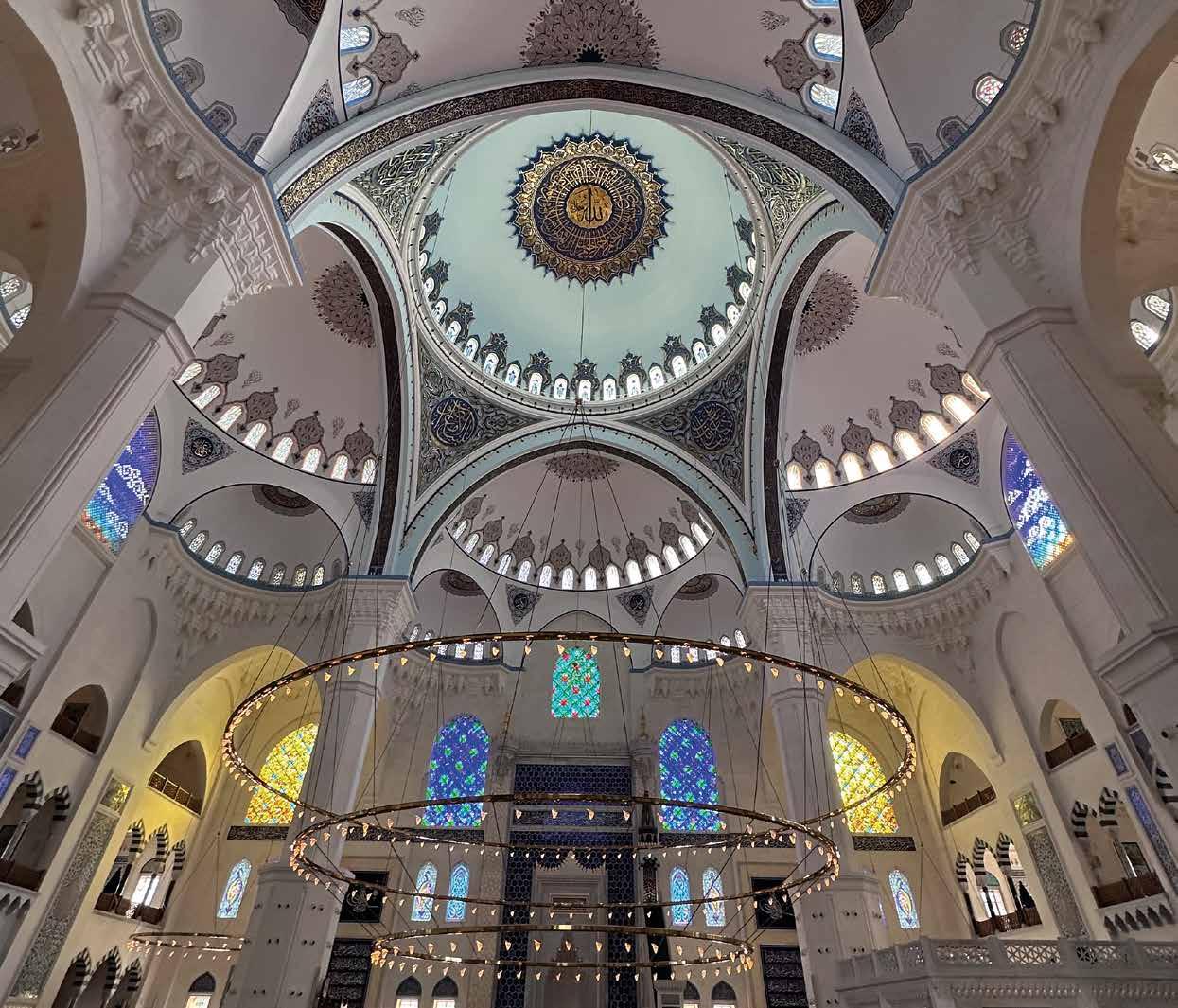
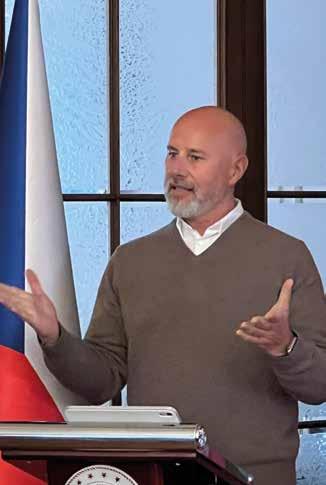
is a historian and orientalist specializing in the cultural and architectural legacies of the Islamic world and the Mediterranean. He studied in Prague, Nagoya (Japan), and at Oxford University, where he focused on Islamic art, architecture. He has also held a fellowship at the University of Cambridge, further deepening his research into cross-cultural connections.
Kubín is a passionate advocate for cultural exchange and the popularization of history. His work explores the intersections of East and West. He contributes regularly to international lectures, publications, and cultural initiatives that promote greater understanding across cultures.
Lasvit is a design and glass company based in Nový Bor, the Czech Republic, with 12 successful ateliers around the world. The name was created by combining the words “love” and “light” (“láska” and “svit” in Czech), reflecting the belief that love is the foundation of all great design. Their exceptional craftsmanship and leadership have resulted in numerous bespoke installations worldwide, including iconic cultural institutions, retail spaces, hotels, private residences, and public spaces. There has never been any doubt that the Bohemian glass tradition belongs on the UNESCO List of Intangible Cultural Heritage. What makes Lasvit truly unique and immensely valuable is its success in reigniting interest in Czech glassmaking on the modern world stage through its fresh approach. We had an opportunity to speak with Lasvit’s founder and driving force, Leon Jakimič.
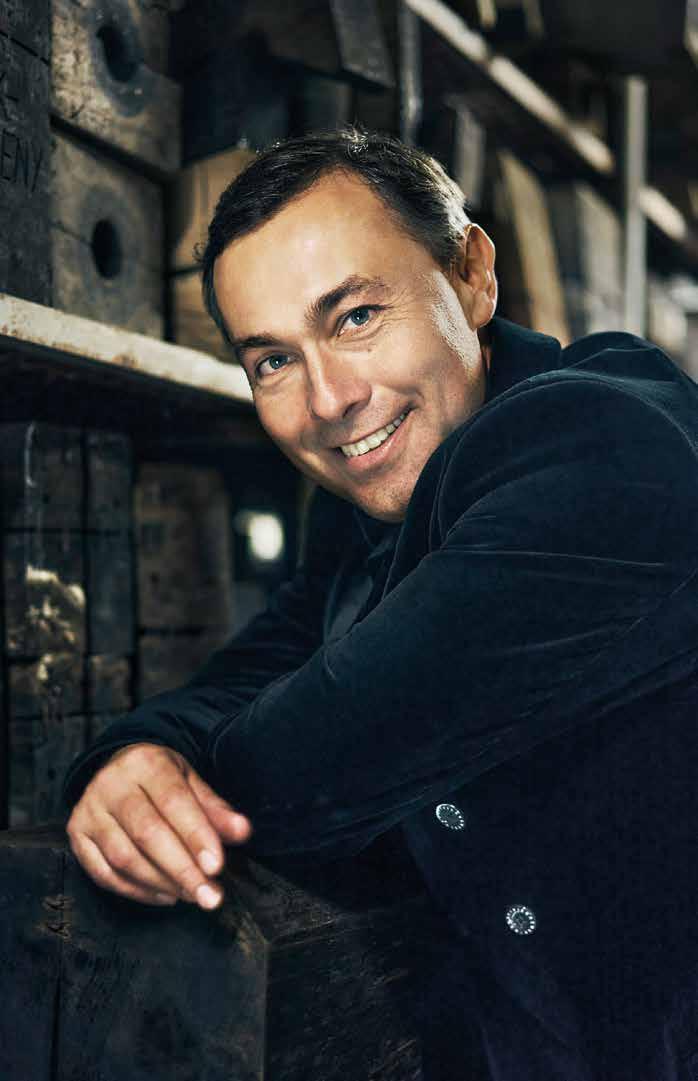
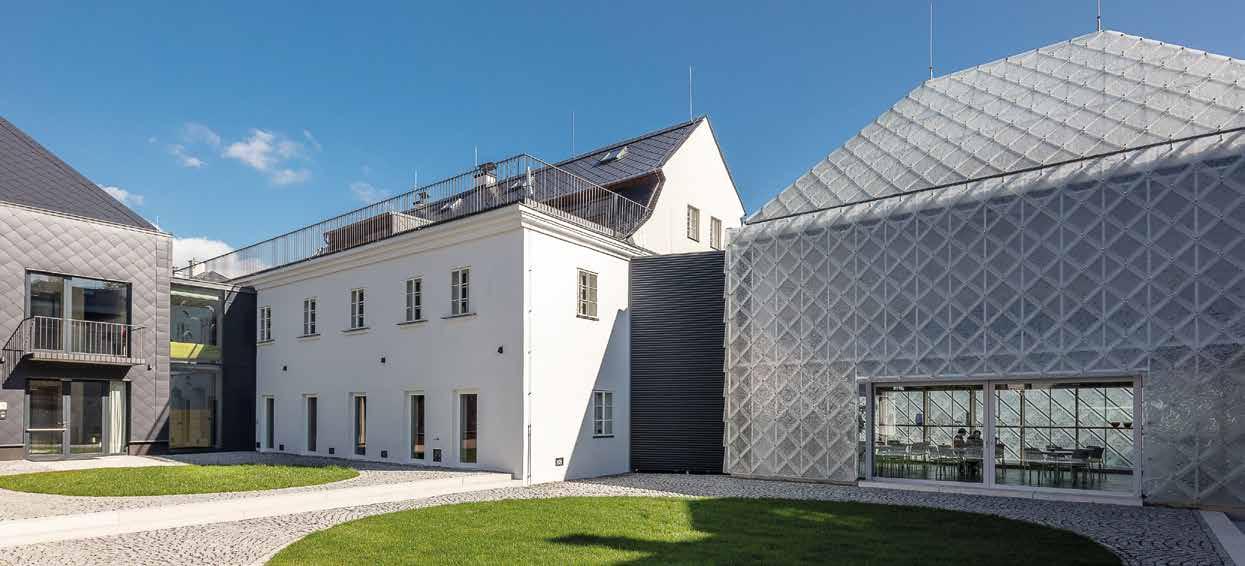

Can you share a few words about yourself and your family?
I come from Liberec in Northern Bohemia, a place surrounded by forests, mountains, and a strong tradition of sport, craft, and architecture. That place shaped who I am.
I lived abroad for many years, but in 2020 I moved back to Liberec with my wife Lucie and our five children. It felt natural. I never stopped feeling at home there.
What made you become an entrepreneur?
I believed Czech glass deserved a stronger voice in the world. It’s a beautiful tradition with real depth.
One of my private missions for founding Lasvit in 2007 was to save and evolve the craftsmanship in Bohemia by re-connecting it with the world’s most imaginative designers and architects.
Tell us about your company, Lasvit.
Lasvit connects traditional Bohemian glassmaking with contemporary design. We produce bespoke lighting, architectural installations, and design collections of lights and glassware. Everything we do is handmade and rooted in craftsmanship. But we’re not here to repeat the past, we want to move the story forward.
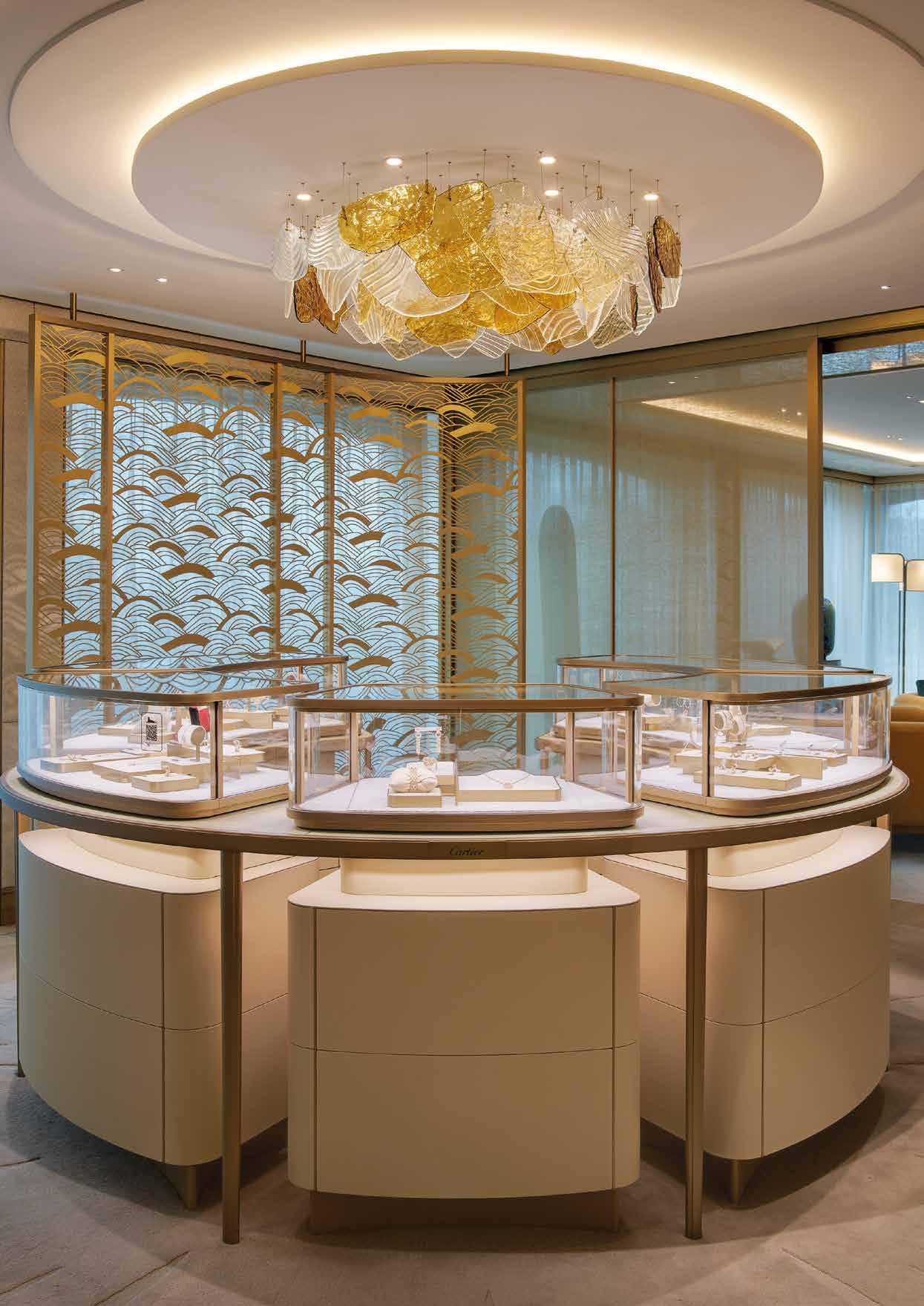
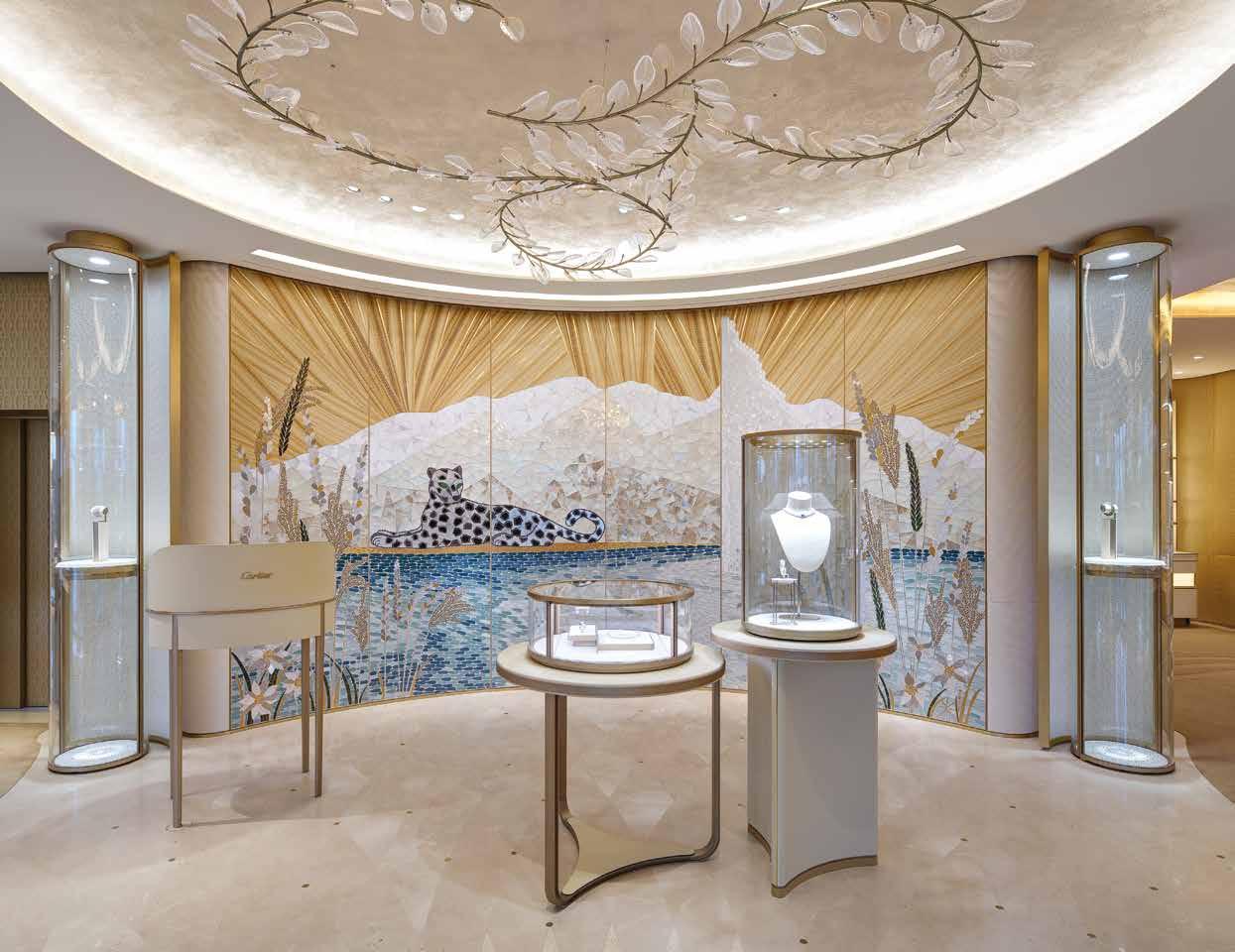
I feel so passionate about glassworks, but mostly about glassmakers, who wake up at 4:30 am every day and then inject their love and passion into the molten silica sand we call glass.
Lasvit is a big international player in designer lighting fixtures, glass architectural elements, and glass art objects. How come?
Because we said yes to ideas that others thought were too difficult or too ambitious. We’ve worked hard, taken risks, and kept our standards high. We stayed close to the craft, while always moving forward.
Also, we wanted to see how the world’s best designers, like Nendo, Alessandro Mendini, or Zaha
Hadid, would express their vision through glass. That curiosity pushed us forward.
Is the role of artistry in society still important in today’s digital world?
Absolutely important, since, in the age of AI and robots, one of the few fields where humans will be indispensable is artistry and craftsmanship. By its definition, it must be human-made, perhaps imperfect, but radiating love and passion, which is a key tool of every artisan.
You and your spouse are involved in charity work. Please tell us more about that.
We started the Lasvit Foundation to support our region. We focus
on three paths: preserving the heritage of Czech glassmaking, supporting our local community, and encouraging movement and vitality through sport. We want to spark curiosity in young people, and show them how even a simple material like glass can hold meaning and transformation. We support those going through hard times, and invest in the energy of our region. When people are encouraged to see more, feel more, and create more, something truly meaningful begins to grow.
You have five children. Do you know which one will follow in your footsteps?
They’re still growing, each with their own passions. I don’t expect them to follow my path. But they’ve all spent time in the glassworks,
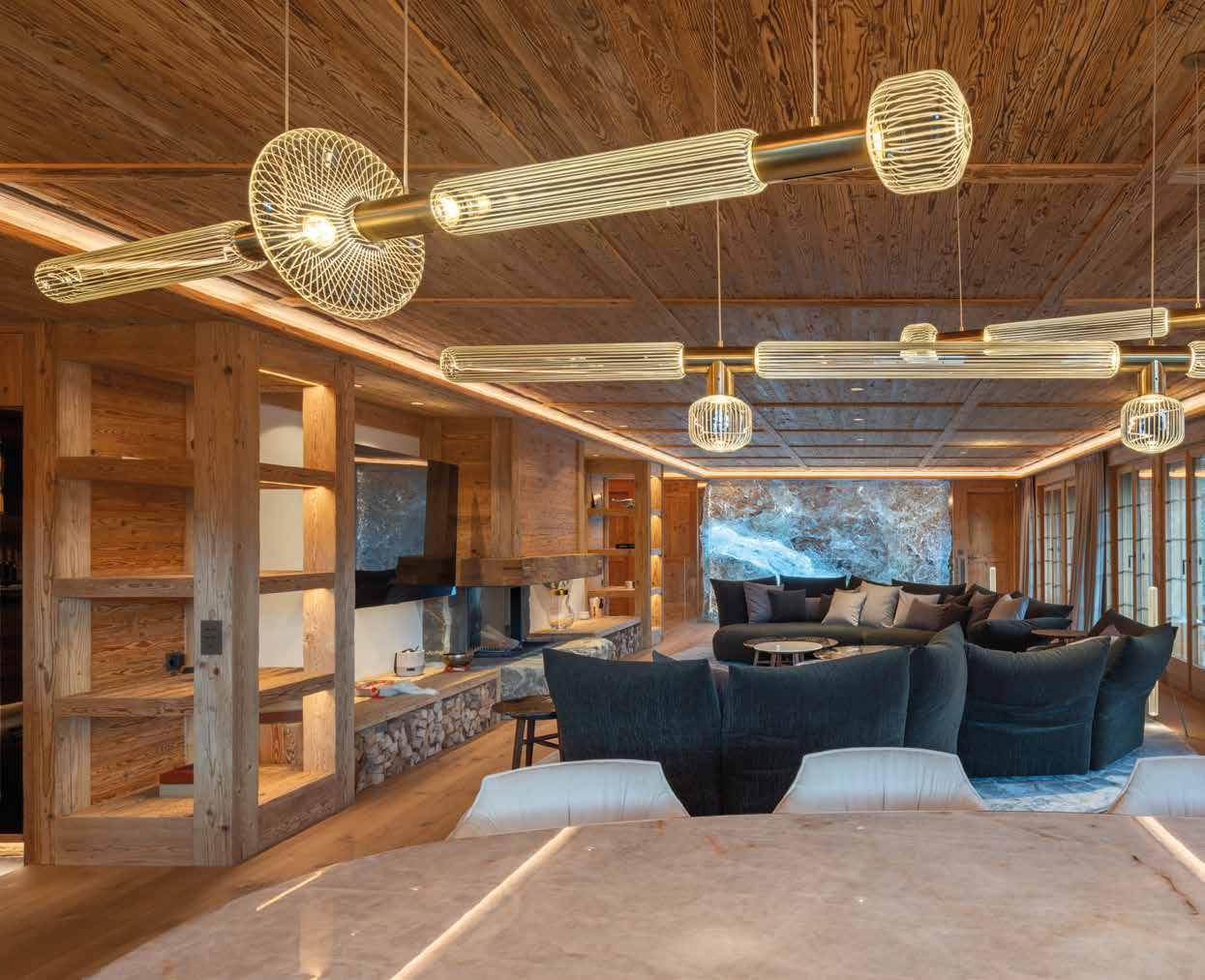
and I see how the material speaks to them. Maybe one day, one of them will take the torch. Or not. That’s up to them.
Where do you see yourself and Lasvit in 10 years?
Still creating, still learning. I hope Lasvit becomes more of a cultural brand, not just a design brand. And personally, I hope I’ll be spending more time in nature, in the Liberec region as well as worldwide.
Can you choose the best projects Lasvit has done up until now?
The Glaciero sculpture for a private residence in Gstaad, and the
Cartier Geneva glass ice cave. I guess I like ice as my inspiration :)
How do you spend your free time?
I play tennis, ski, and enjoy hiking. But I especially love joining my kids at their tennis tournaments, which they are very passionate about.
What is the best adventure you have had?
Every year in June, I and seven close childhood high school same-age friends go canoeing on a different river in Czechia. We take a three-day trip, sleeping in tents alongside the river, enjoying each other’s company.
What is the weirdest thing you have dealt with?
Diving with sharks in Fiji.
Finally, can you wrap up by giving a piece of advice to the next generation?
Always look on the bright side of things, never give up on your dreams, and don’t worry about negative comments from people who don’t know you.
TEXT: Archive PHOTO:
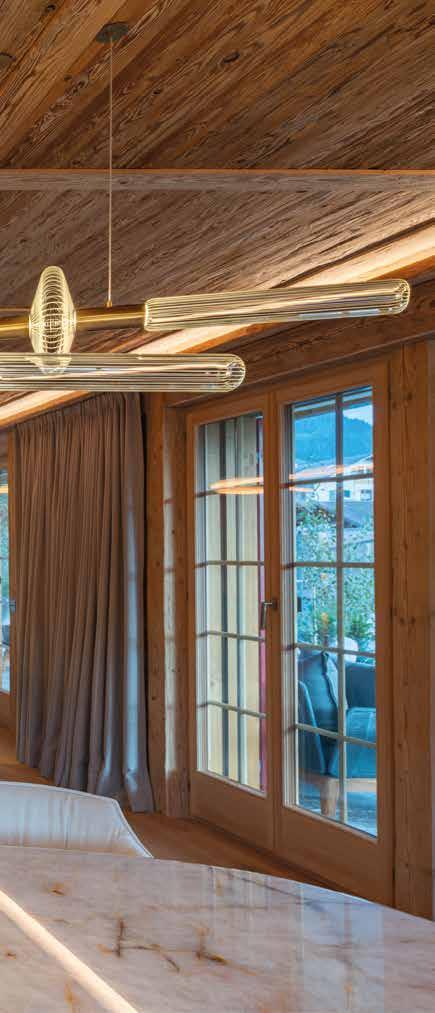

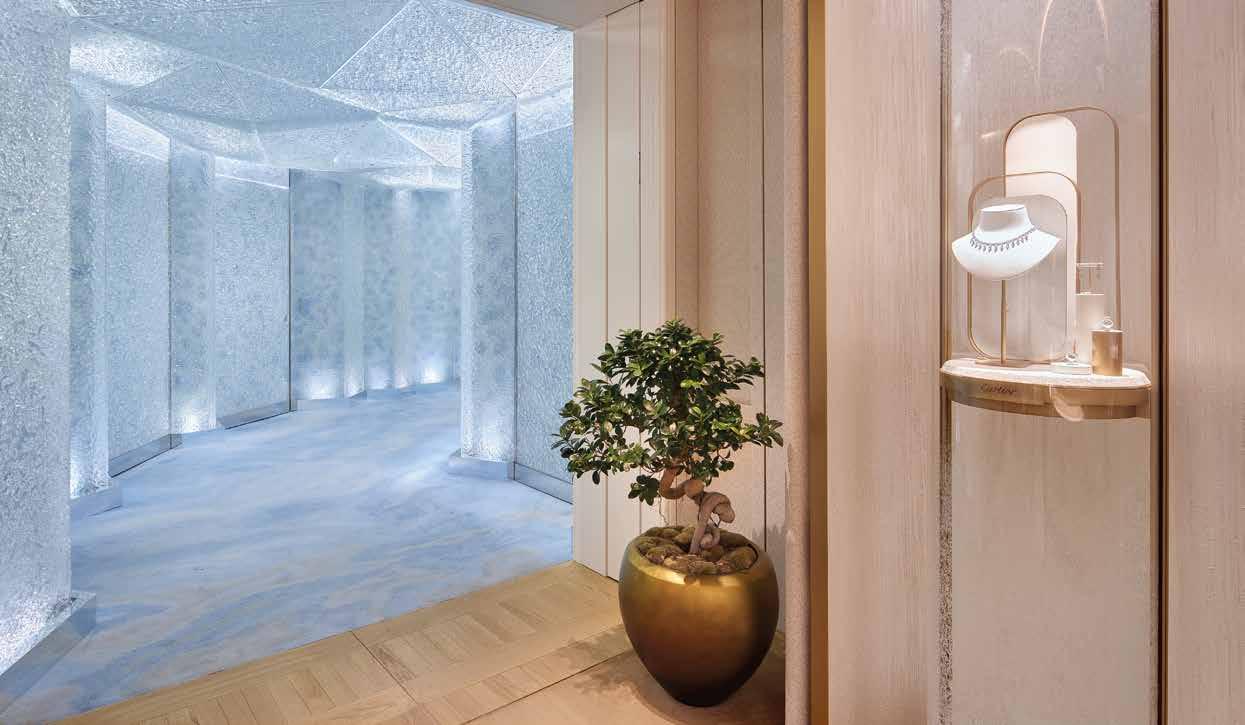
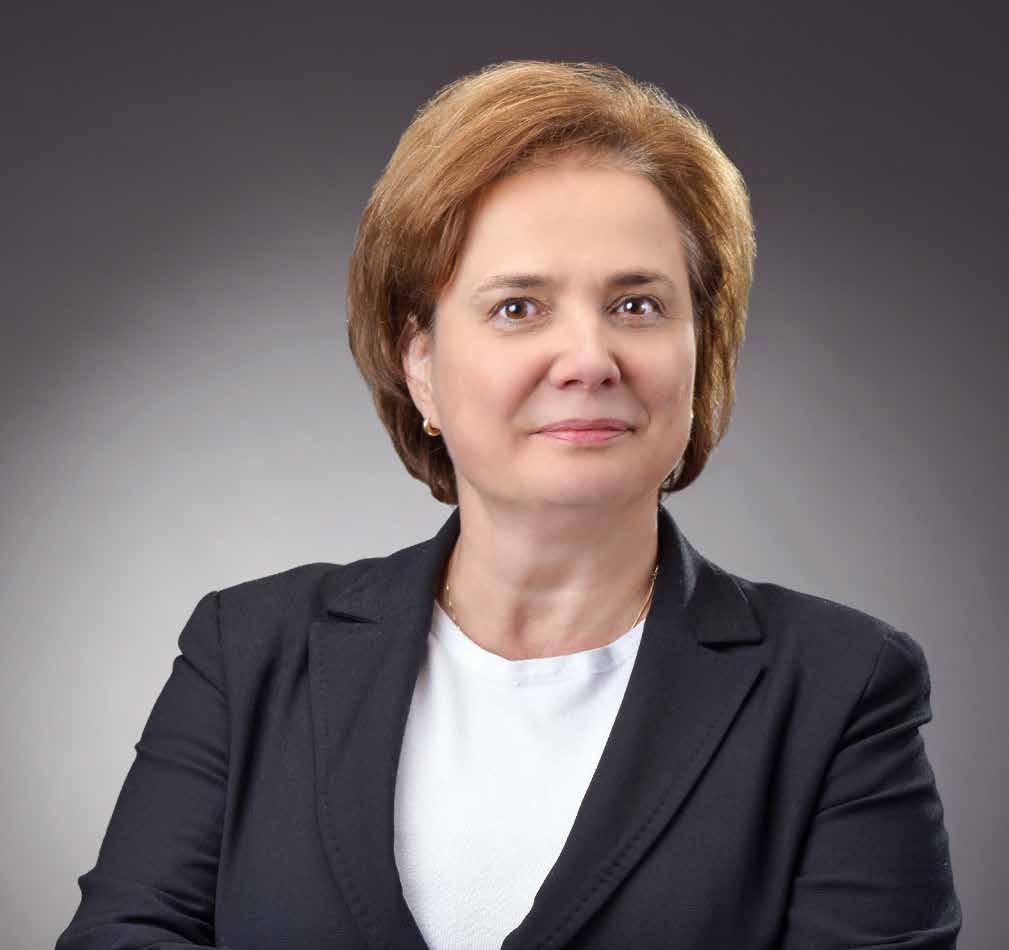
The Lord works in mysterious ways. A case in point is the story of Monika Ruprechtová, a Czech businesswoman whose career path has been anything but straightforward. I first met her over 20 years ago, when she was my first tax advisor in the Czech Republic. Recently, I had the pleasure of reconnecting with her – only to discover that she had just successfully sold her business. It took some skill to persuade her that an accountant’s story could be interesting enough to publish, but she finally agreed to share her unconventional professional journey with our readers.
Monika is from Prague, and graduated from the University of Economics in 1988 with a degree in Economic Information and Control. There is no such field today. It was basically accounting and enterprise financial management, but in the context of a socialist economy with centralised planning. Interesting jobs were hard to find in such an environment.
Under the influence of Soviet perestroika (a set of political and economic reforms in the USSR penned by Mikhail Gorbachev), some national enterprises began to consider the possibility of setting up their own export department – instead of securing exports abroad through stateowned foreign trade enterprises. One such progressive enterprise

was Koh-i-noor, a manufacturer of patches, pins, and other small haberdashery, which enticed the young graduate. However, she had no idea that, starting in September, the enterprise would mobilise its administrative staff to meet socialist production targets, with younger employees working night shifts to fulfil plans. The establishment of the export department was postponed.
Monika, therefore, left Koh-i-noor soon after and joined Chemapol’s foreign trade business, where the Velvet Revolution caught up with her a few months later. “My colleagues and I founded the Civic Forum, dismantled the local Communist Party organisation, and tried to change the manage -
ment of the company,” she recalls. But the structures proved quite resilient, and the changes were initially difficult.
Young people of her generation, including Monika, had the desire to start a business. Yet, establishing a limited liability company required a capital of CZK 200,000, which was not possible on a salary of CZK 1,650 gross per month. There was therefore no choice but to fly with the “Wind of Change” (as the Scorpions sing about) under the auspices of employment. “Branches of foreign companies began to appear on the market, offering salaries many times higher than our standard at that time”. Monika seized the opportunity and accepted a job as an assistant
at Air Products, an American company supplying technical gases. It was the first time she could work with foreign colleagues, the first time she was able to go on a business trip to Western countries, and the first time she found out about the consulting firm Ernst & Young, when she handled her colleagues’ mail. She recalls the envelopes from this sender were always marked “private & confidential”, adding an air of mystery to the company.
When Air Products relocated its office to Děčín, Monika approached Ernst & Young’s Prague office, where she joined as an assistant to the Managing Partner. However, the head of the tax department, who was
suffering from a lack of Englishspeaking colleagues, recognised Monika’s language skills and approached her to work with him. It was a struggle at first, as it was impossible to build on her knowledge from school, but eventually Monika advanced to become Manager of Expatriate Services at EY for several years.
“The job in the mid-nineties was literally a builder’s job, everyone wanted to show what they could offer, to be able to stand comparison with their colleagues in the West,” says Monika. “It was a lot of fun, a lot of effort, countless hours of overtime, but on the other hand there was the experience gained in tax and immigration issues, experience in managing people, and the satisfaction of a job well done”.
This was followed by more work experience, this time in the field of taxation. Monika passed the tax advisor exam, took a year-long backpacking trip to Southeast Asia and Australia, had children, and then, when the children grew up, it was finally time for the longed-for business – becoming her own boss!
In 2012, Monika and her former colleagues founded EDM Utilitas, a company offering audit and tax services. Under market pressures, the ladies expanded the scope of their services to include accounting, and by 2025 they had already achieved annual sales exceeding 50 million CZK under the brand Clarkson Hyde Czech Republic. But one does not get younger, and as the saying goes, “it is an art to know when to leave”.
The shareholders of Clarkson Hyde Czech Republic reached an agreement with the consulting group RSM, represented by Monika Marečková, and in June 2025 successfully completed the sales transaction of Clarkson Hyde Czech Republic.
Monika will continue to work under the new brand to ensure a smooth transition for employees and clients. Only then, will she be able to focus on previously neglected activities – such as playing the piano, and serving on the executive board of Clarkson Hyde Global, a London-based association of independent auditors, tax advisers, and accountants.
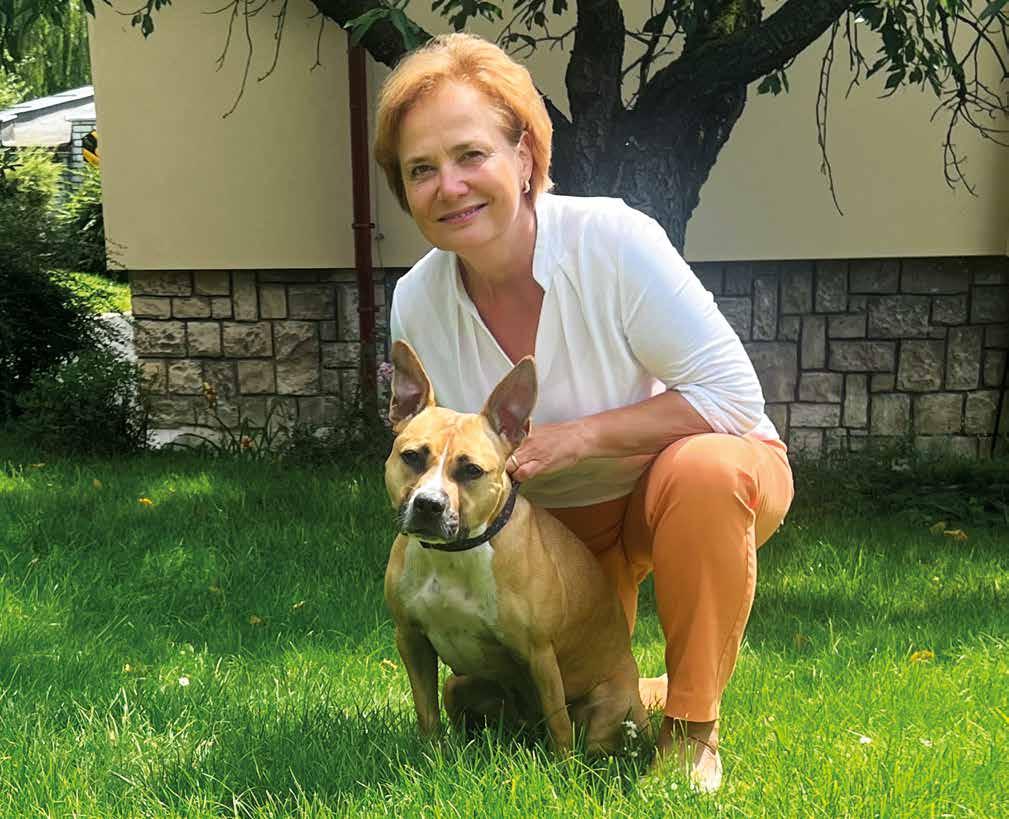
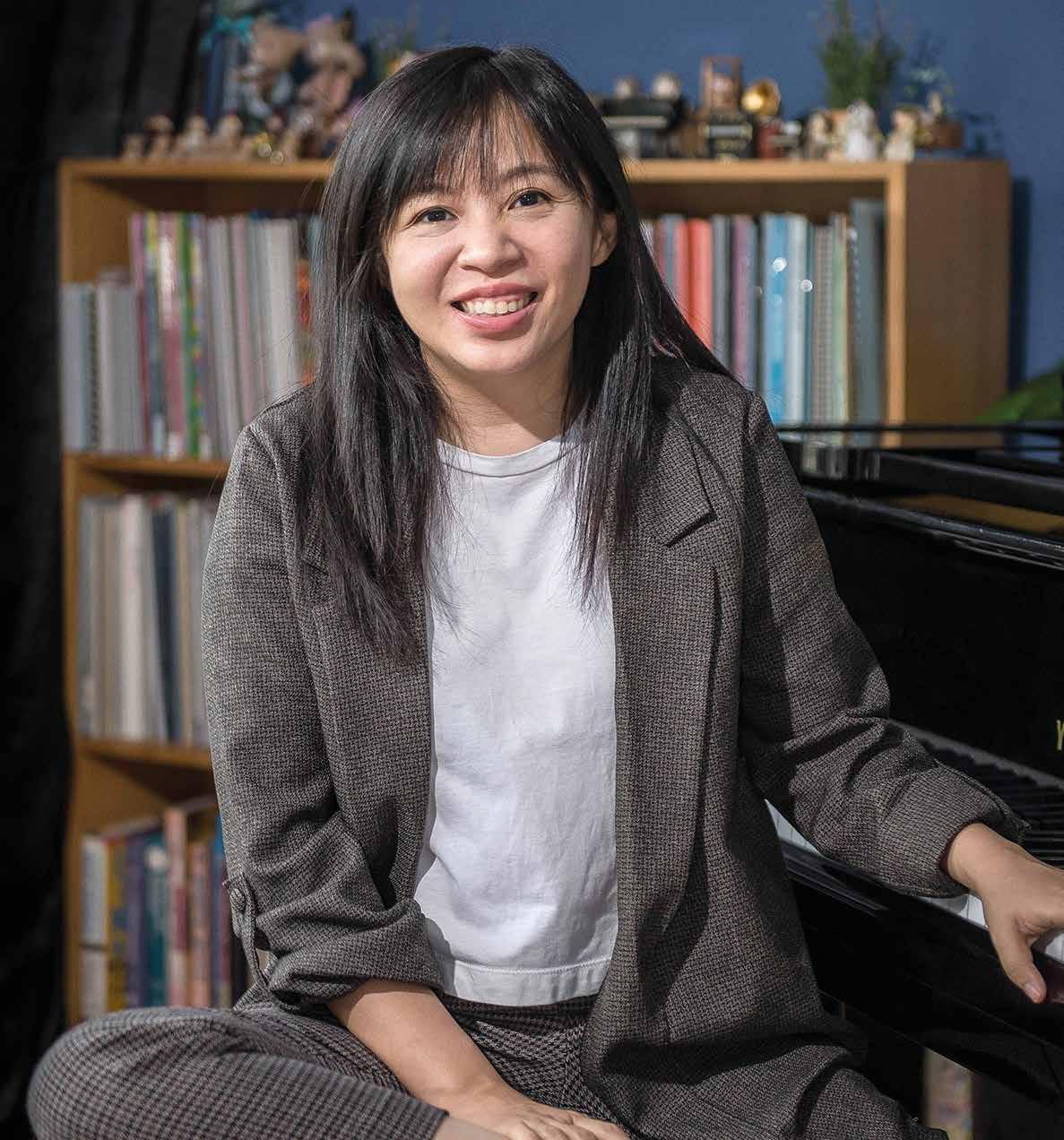
Nathania Karina was trained as a classical pianist and holds a doctorate in musical arts. In her role as Conductor and Music Director of the Trinity Youth Symphony Orchestra, an Indonesian non-profit organisation with over 120 members, she has visited Prague as part of a concert tour. “I’ve always loved music,” says Dr. Karina. Through her work, she hopes to “nurture and sustain the growth of orchestral music in Indonesia. The potential is immense, we just need the right foundation to thrive.”

Can you tell us a bit about yourself, please?
I was trained as a classical pianist and hold a doctorate in musical arts. I was unexpectedly asked to conduct this church ensemble simply because there was no one else, and somehow, everything just fell into place. In my spare time, I enjoy travelling, writing music, and reading.
I attended my first piano lesson at the age of four and have never left music since. Coming from a non-musical family, I feel incredibly blessed that my parents have always supported my musical journey. I’ve always loved music, but I never initially imagined becoming a full-time musician.
You are the Conductor and Music Director of the Trinity Youth Symphony Orchestra. Can you explain what this orchestra is about?
Trinity Youth Symphony Orchestra (TRUST) is a non-profit foundation founded in 2013, which dedicates all its funds to support concerts, masterclasses, and festival participation.
In the summer of 2024, TRUST toured the UK, performing at the Royal Conservatoire of Scotland, in London, and at the Edinburgh Festival Fringe – where they received the Outstanding Young Performer 2024 award from The Asian Arts Awards. Most recently, they earned a Gold Award at the 2025 World Orchestra Festival in Vienna.
Now, with over 120 members aged 11 to 35, TRUST stages at least three high-demand public concerts a year, often selling out within 10 minutes and providing a fun, intensive environment that nurtures musical growth and industry readiness.
Unlike traditional youth orchestras, TRUST performs a wide range of genres from jazz and pop to rock and folk, and is best known for its signature movie soundtrack series “The Legends”.
You, as well as the orchestra, come from Indonesia. How do you see your home country through the eyes of a musician?
Indonesia is a fascinating country, especially when it comes to its vibrant music scene. The music industry here is one of the most dynamic in Southeast Asia, filled with countless talented individuals. Piano remains a popular instrument, and in recent years orchestral instruments, particularly strings, have begun to gain wider appreciation.
However, despite this growing interest, Indonesia still lacks a national orchestra and a proper,
purpose-built symphonic concert hall. Organising symphonic orchestra performances remains a significant challenge. Although the appeal of orchestral music is growing today, just a decade ago we often faced criticism for not strictly adhering to the “classical” repertoire.
But we’ve always believed in a broader vision: to create an orchestra that’s for everyone. That means embracing not only classical music but also allowing diverse genres to be part of the concert experience. Music, after all, should be inclusive and accessible to all.
How many countries has TRUST performed in?
We’ve been fortunate to perform in remarkable cities around the world – Sydney, Vienna, Kuala Lumpur, Prague, London,
Edinburgh, and Glasgow, for which we are truly grateful. However, one of our biggest challenges remains touring our own country. Despite our international appearances, we’ve only been able to visit a handful of cities across Indonesia. It’s a bittersweet reality, and frankly, quite a shame, considering how much we’ve achieved abroad. We believe Indonesian audiences everywhere deserve access to high-quality orchestral performances, and we hope to bring our music to more corners of the archipelago in the future.
What do you think is the most difficult part of being a musician?
Personally, I’ve loved every moment of being a musician. I feel incredibly fortunate that my work is also my passion—what more could I ask for?
For the TRUST Orchestra, however, one of our biggest ongoing challenges is keeping both our members and our audience continually inspired. Striking the balance between delivering high-quality programs and keeping them fresh and engaging is no easy task. The orchestral landscape in Indonesia is vastly different from that in European countries, where the ecosystem is more established and supported. We truly hope that in the future, there will be greater support from the government to help nurture and sustain the growth of orchestral music in Indonesia. The potential is immense, we just need the right foundation to thrive.
This is your first time in Prague. What was your initial impression?
Prague is simply beautiful! Especially the old town area. Fortunately, it’s actually not my
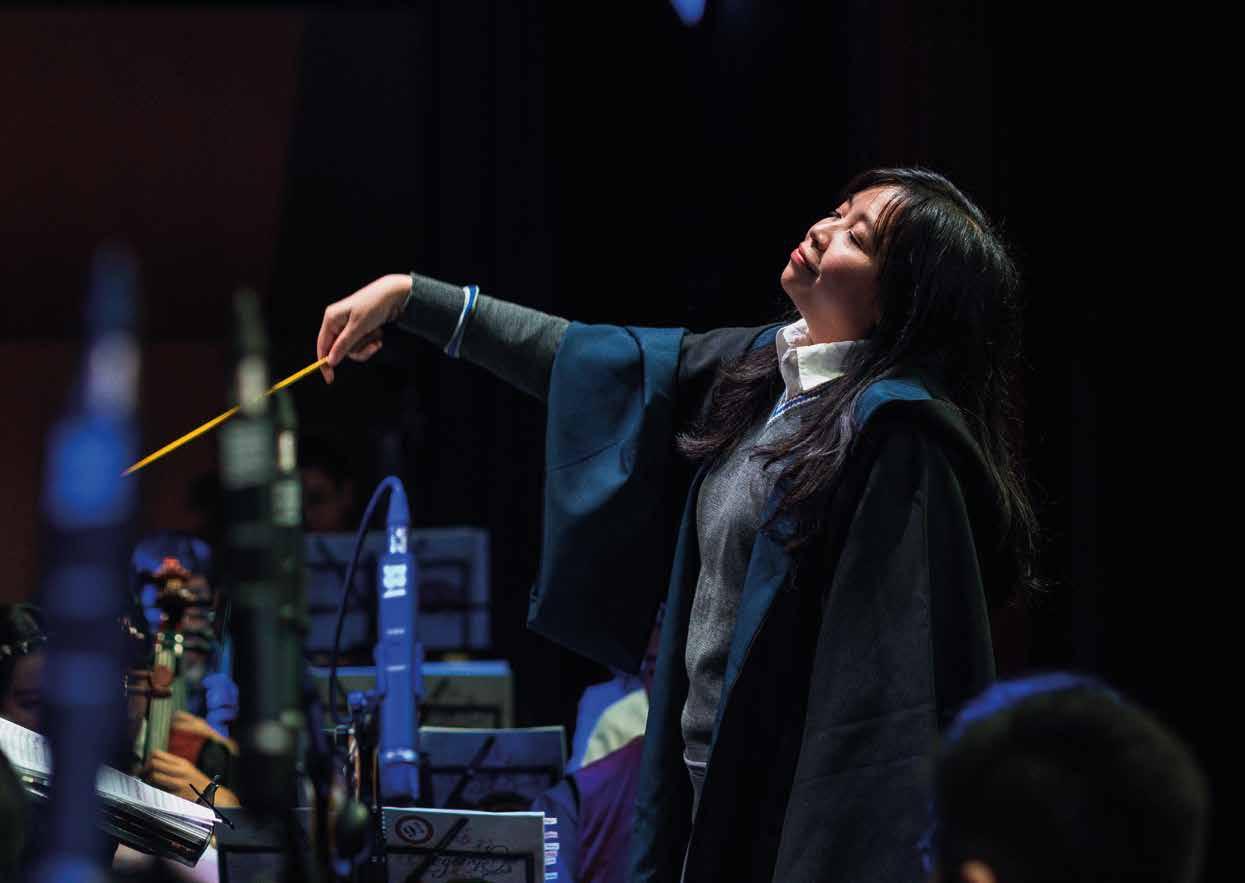
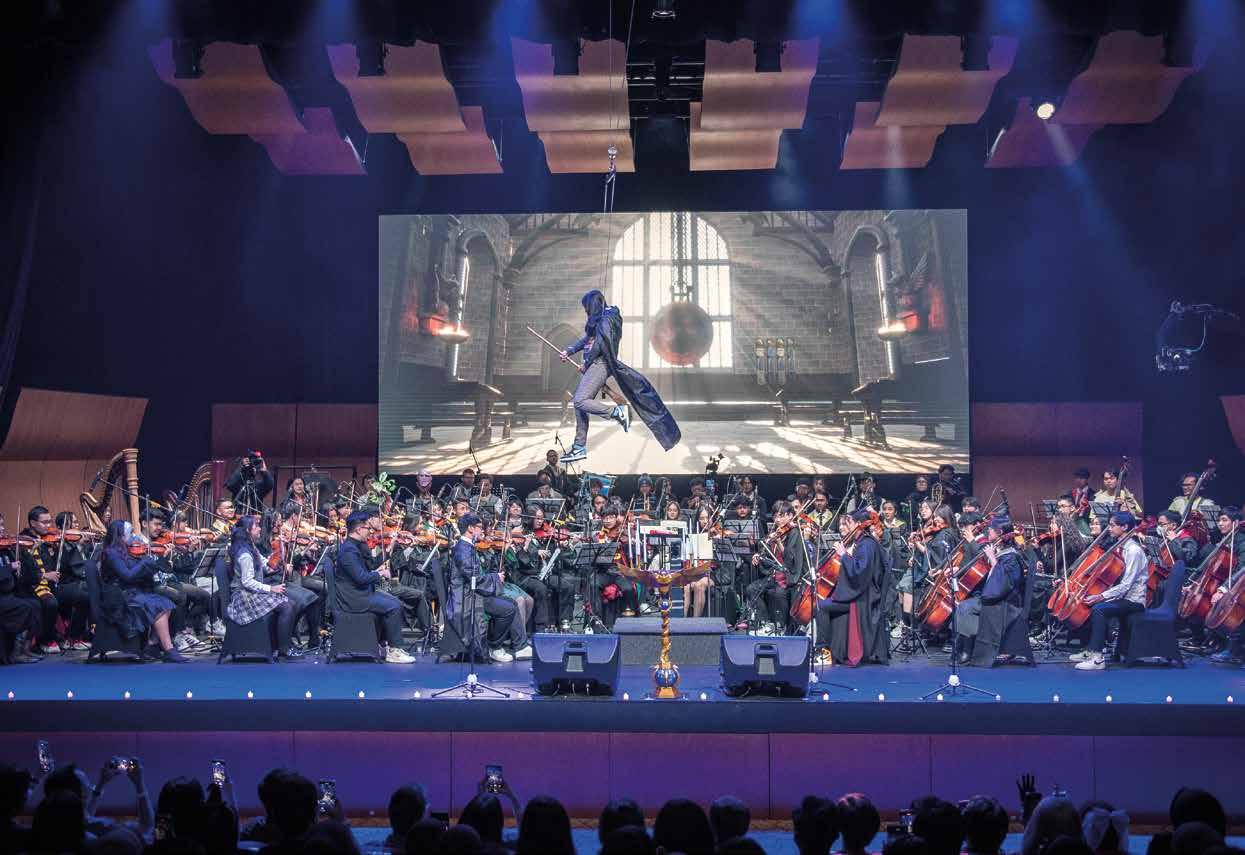
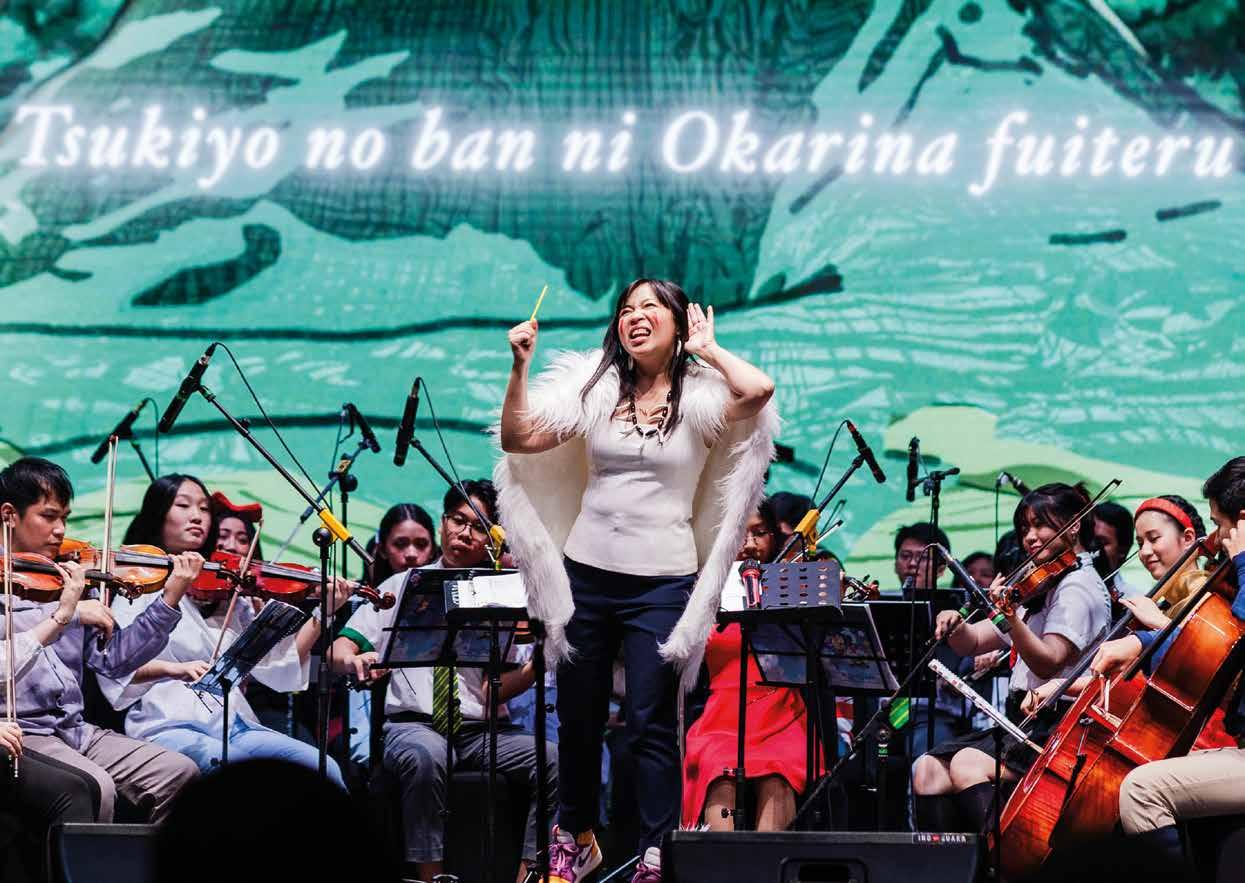
first time in Prague – but the charm is there. For most of the members of the TRUST Orchestra, it is their first time. And I’m very happy to be able to give a short lecture on Smetana and Dvořák along the river Vltava itself!
I can imagine it was a remarkable lecture for young musicians. Can you give a piece of advice to the next generation of musicians?
The future generation will grow up in a world shaped by rapid technological advancement, constant change, and uncertainty. As musicians, they will face unique challenges navigating a digital landscape, staying relevant, and finding their own voice amidst the noise. But with these
challenges come opportunities. Embrace technology as a tool, not a threat. Stay true to your identity, and, most importantly, pursue your craft with passion. In a world that’s always shifting, authenticity and dedication will always stand out.
What are you, as a representative of your country, expecting from your tour?
We hope to introduce Indonesian folk music to international audiences, not only to showcase the richness of our cultural heritage but also to spark curiosity and appreciation for the stories and traditions behind it. Who knows, it might even inspire people to learn more about Indonesia, and perhaps
one day visit and experience our vibrant culture firsthand. Music has the power to connect people across borders, and we believe our folk heritage deserves a place on the global stage.
Looking ahead again, where do you see yourself in 10 years?
In 10 years, I truly hope I can continue doing what I love today. With the same heart, the same passion, and the same sense of purpose. No matter where the journey leads, I want to stay grounded in the joy and meaning that music brings to my life.
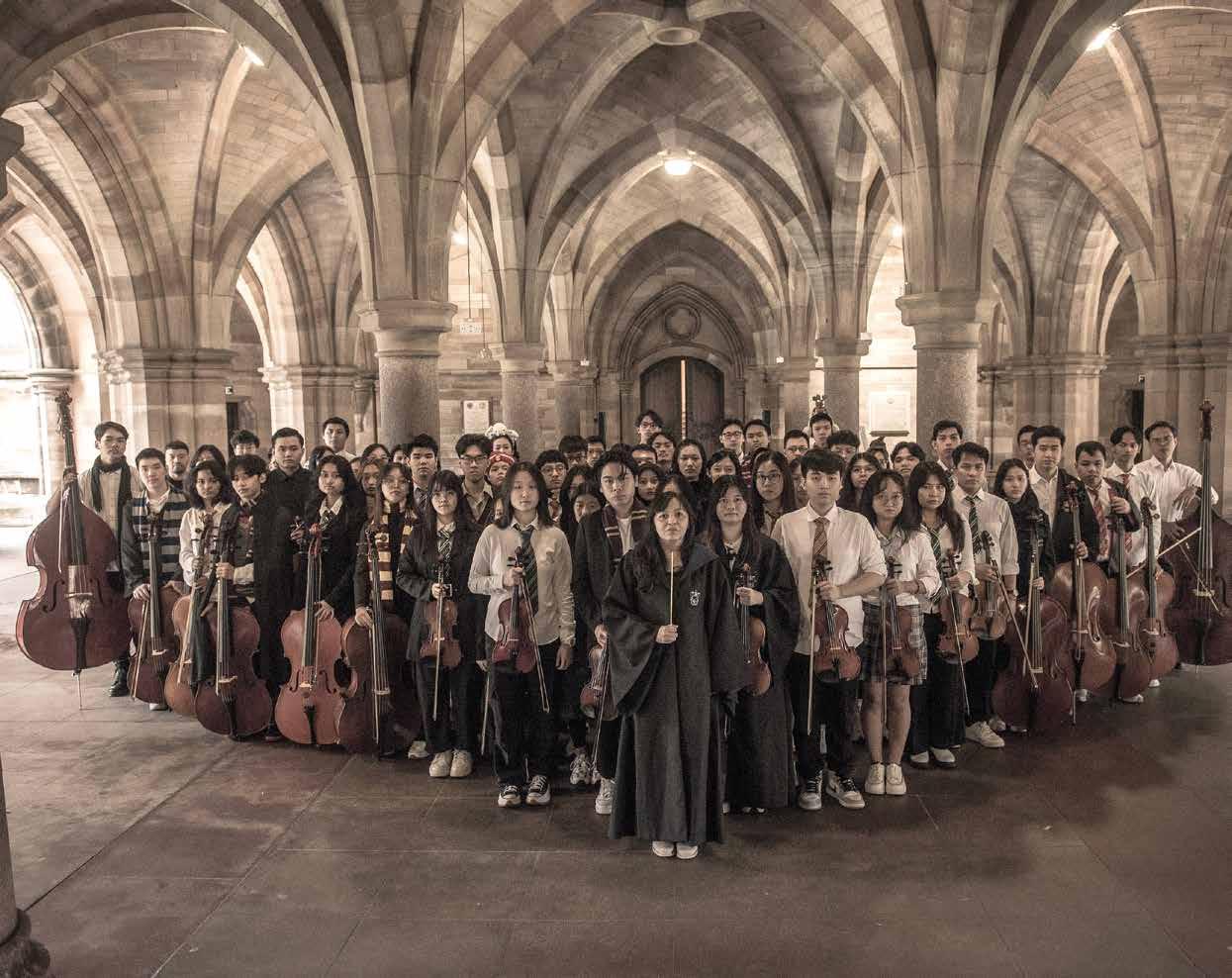
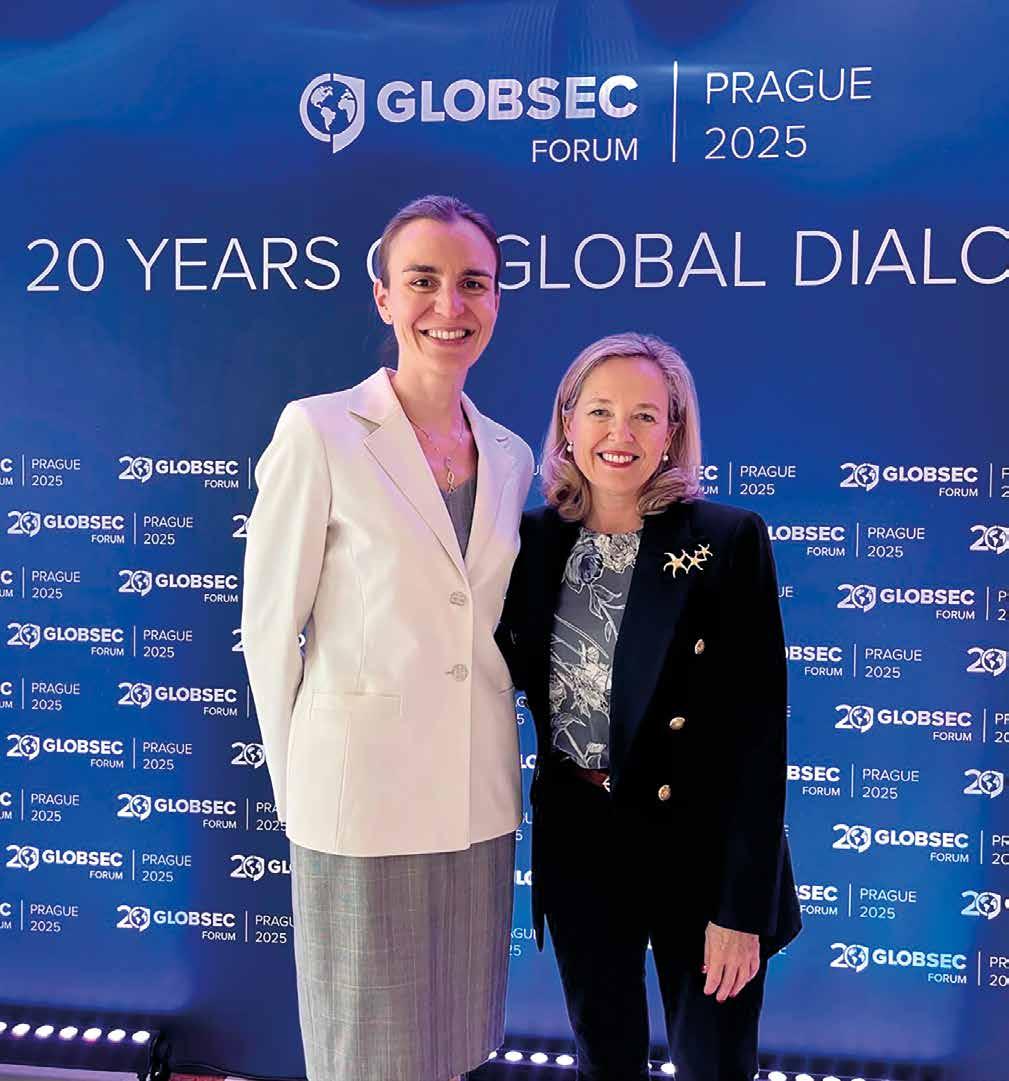
In today’s rapidly evolving geopolitical landscape, close cooperation among European institutions is not just beneficial, it is essential. As global power dynamics shift and the principle of “might makes right” increasingly overshadows rules-based international order, the European Union must act with greater unity and determination than ever.
To secure its place in a changing world, Europe must become a stronger, more autonomous and competitive player. This requires deep institutional cooperation and a shared sense of strategic purpose.
The Czech Republic contributes actively to this vision. Prague hosts several key European
institutions: the European Commission Representation, the European Parliament Liaison Office, the European Investment Bank (EIB) Group Office, and the EU Agency for the Space Programme (EUSPA). Together, we have initiated Team Europe Prague, which is a local platform designed to foster cooperation, share information about current
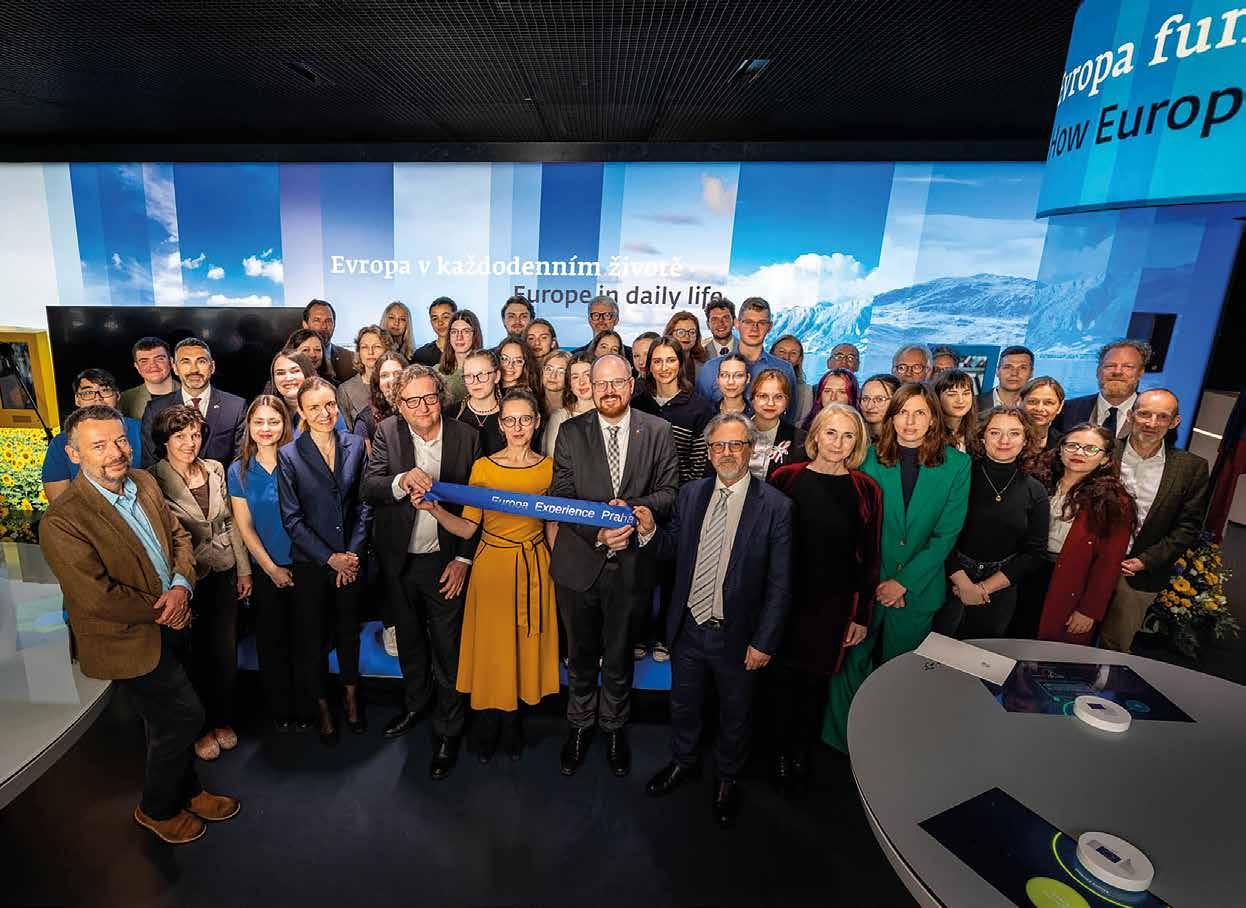
initiatives, and identify opportunities for joint action. It reflects our core belief that when we work closely together we amplify the EU’s impact and build trust among citizens.
Each actor brings their own unique mission
The European Commission Representation ensures that EU policies are effectively implemented on the ground, while also feeding local perspectives into the Brussels policy-making process. The European Parliament Liaison Office promotes democratic engagement by connecting Czech citizens with their elected representatives. At the EIB Group, we provide financing and advisory for projects that support the EU’s strategic priorities, be it climate action, innovation, cohesion, or competitiveness. EUSPA plays a critical role in buttressing
Europe’s space capabilities, ensuring the operational excellence and commercialization of flagship programmes such as Galileo and Copernicus.
The cooperation between the European Commission (EC) and the EIB Group at the EU, as well as at the local level, has always been very strong. The EC is represented on the EIB’s Board of Directors, and can provide feedback on every project submitted to the Board for approval. It is also one of the shareholders of the European Investment Fund. The European Parliament and the EIB Group are also very close partners.
How do we experience this cooperation in the Czech Republic?
Since last summer, the Prague offices of the European Commission,
the European Parliament, and the European Investment Bank Group have finally come together under one roof at Palác Dunaj, which we now proudly call the European House. This consolidation brings significant benefits to all three institutions.
The institutional ecosystem in Prague is more than the sum of its parts, and our cooperation delivers tangible results. We organise or sponsor various events that help the EU and the Czech Republic achieve its ambitious goals in areas such as green transition, digitalisation and technological innovation, and security and defence. The regional roundtables “How can Europe better support the modernisation of the region?”, organised by the local European Parliament Office, are a very good example of our cooperation. The last regional roundtable
that took place in Brno in April brought together representatives of our institutions and regional stakeholders to discuss how EU policies and funding can better address local needs. Topics ranged from cohesion policy and innovation to defence capabilities, climate resilience, and agricultural adaptation.
Another example of our effective collaboration is the partnership between the EIB and EUSPA. In 2022, the two institutions jointly published the first Global Navigation Satellite Systems (GNSS)
Investment Report, highlighting a €100 billion market potential for satellite-based services. The report identified key investment gaps and emphasised the need to mobilise both public and private capital. It also underscored the EIB’s readiness to finance companies working on GNSS technologies, infrastructure, and services that support Europe’s digital transformation and strategic autonomy. Demonstrably, local representations of EU institutions play an active role in shaping discussions at the local – as well as the EU – level,
ensuring that EU policies respond effectively to the challenges of individual Member States.
As security and defence move to the forefront of everyone’s political agenda, all EU institutions have been increasingly stepping up their efforts in this area, realising that institutional collaboration is now more important than ever. At critical junctures like these, it is trust that forms the foundation of any successful cooperation.
As the EIB President Nadia Calviño

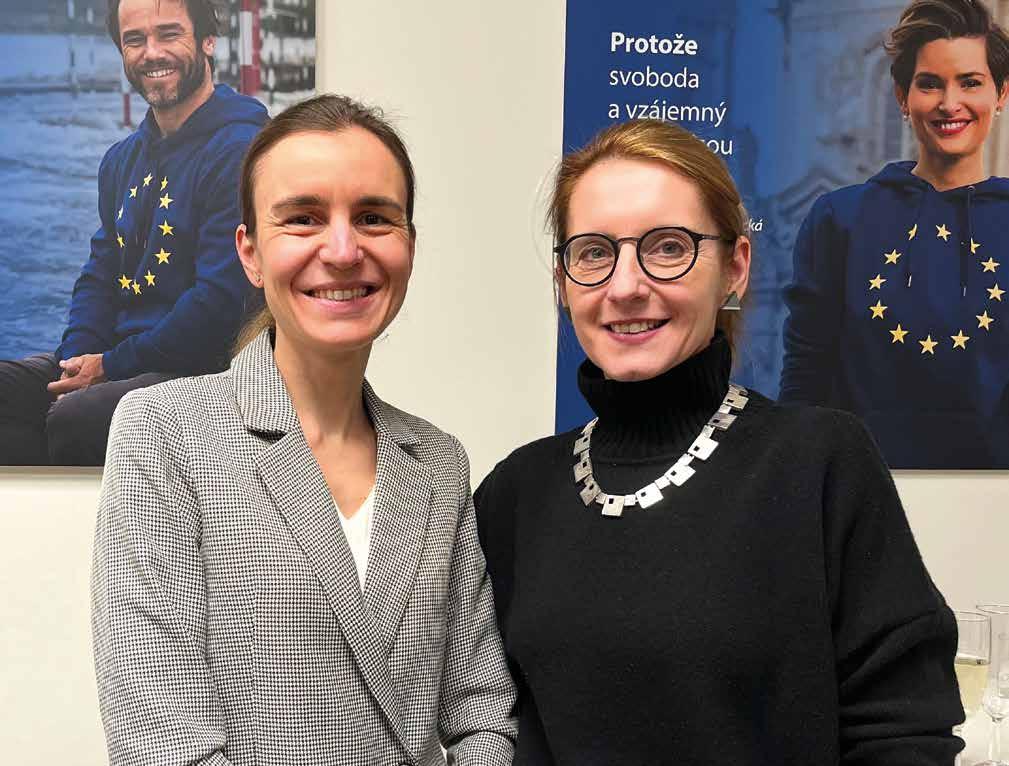
aptly put it during her last visit to Prague: “When everything, everywhere, all at once, is changing, trust and confidence gain value.”
Recent global events remind us just how fragile even long-standing partnerships can be. The July pivotal meeting between Commission President Ursula von der Leyen and U.S. President Donald Trump in Scotland, which resulted
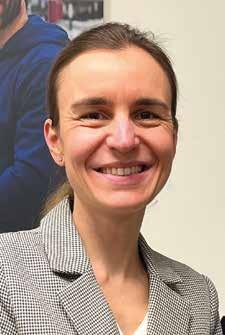
in a trade agreement that narrowly averted a catastrophic tariff conflict, illustrates this harsh reality. It was a positive outcome, but also a clear reminder that even the most established and trusted alliances can no longer be taken for granted.
In this context, cooperation among EU institutions is not just a matter of internal organisation.
It is a strategic necessity. By working together, we can enhance Europe’s credibility, resilience, and influence in the world. Strength comes from within. Team Europe Prague is ready to contribute to this effort.
is the Head of the European Investment Bank Group Office in the Czech Republic. Prior to returning to the Czech Republic last September, she worked at the EIB Group in Luxembourg for ten years. During her time at the EIB, she was responsible for business origination across various products and geographies. She also oversaw the implementation of institutional mandates deployed by the EIB, such as the European Fund for Strategic Investments.
It has been ten years since Vít Hofman became the spokesperson for the City of Prague at the age of 23. That makes him both the youngest and longestserving Prague spokesperson in Czech history. He has worked under three different mayors, and with three very-politically-different coalitions. “My role is simply to remain apolitical, fair, and to do everything I can to contribute to the city’s positive image – and I believe that’s the right approach,” he says.
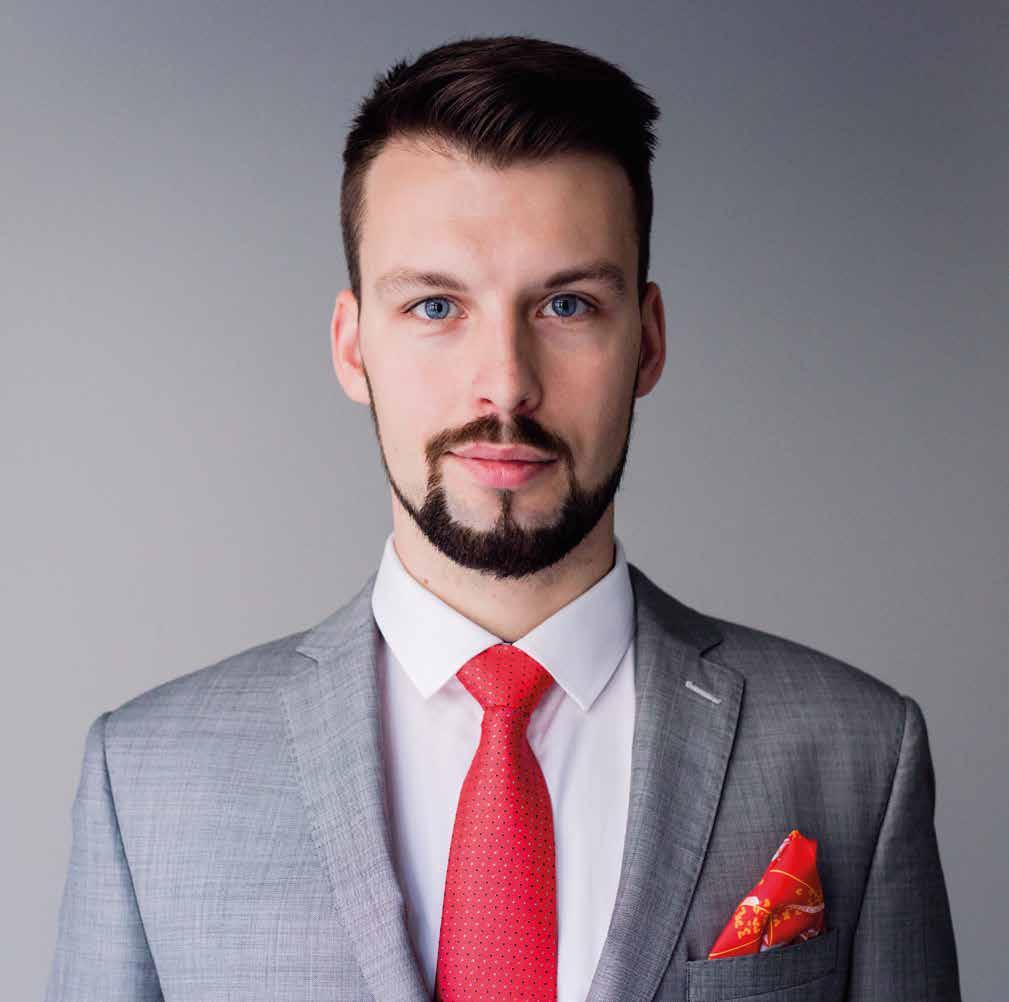
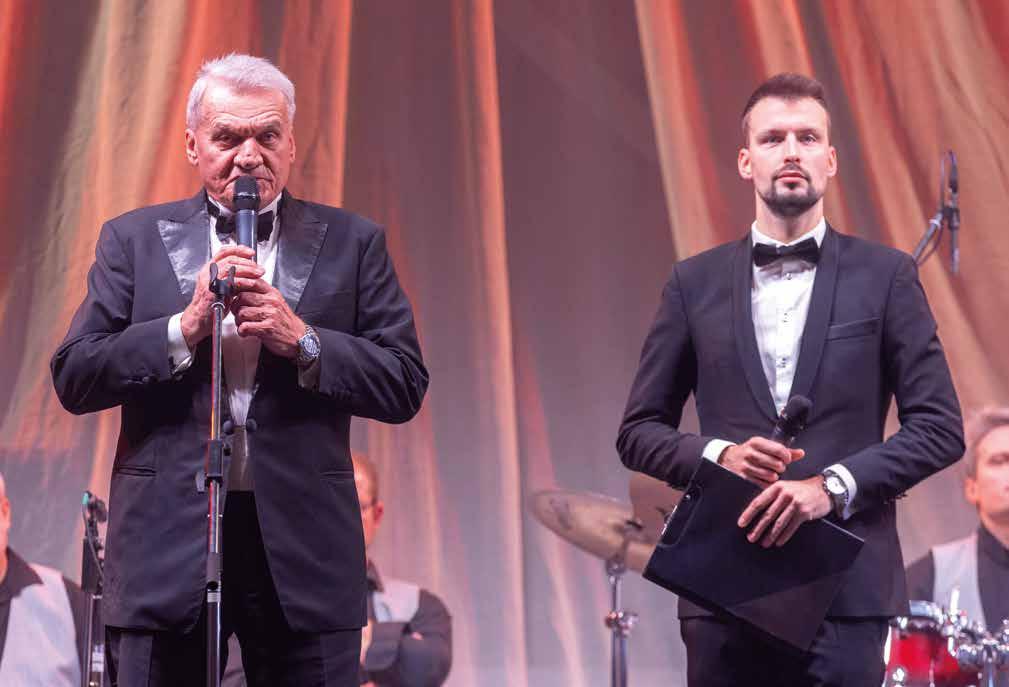
How did you decide to become a spokesperson?
It’s a long story that probably started back in high school, where we had subjects like media education and rhetoric. Even then, I realised that this was the direction I enjoyed and wanted to pursue. I gradually started hosting various events in my hometown, and at the age of eighteen I became the spokesperson for a project supporting vocational education in Prague.
I continued on this path, successfully managing a campaign in the municipal elections in my hometown. Then, thanks to a bit of luck that seems to follow me through life, and by chance, I ended up at the Prague City Hall. Here, I must thank my two current friends, with whom I wasn’t very familiar at the time, for their trust. They gave me the opportunity to start as the spokesperson for the City of Prague at just 23 years old.
Are you from Prague?
Like a true spokesperson for the capital city of Prague, I actually come from the Central Bohemian Region (smiling). I live in a small town called Nové Strašecí, which has about 5,500 inhabitants. It’s where I was born, went to both elementary and secondary school, and where I still have friends and family.
The connection to Prague is great – it takes me only an hour from my front door to my office door by bus and metro. I can get some work done on the way… or take a quick nap.
I also believe that not living in Prague helps me stay neutral in my job – not least because I don’t vote in municipal elections there.
Do you remember the first moment you came to the municipality?
Yes, I was 23 years old when the
then-head of the department, Vladimír Řepka, took me to be introduced to the mayor at the time, Adriana Krnáčová. I had always looked a bit older than I actually was, but for that meeting I had freshly and carefully shaved, which made me look noticeably younger. The mayor turned to Vladimír and said, “Well, if you say so, Vladimír... ” That was probably the moment Vladimír himself realised just how young I really was.
Now, it’s been ten years since I became the spokesperson for the City of Prague, and for nearly seven and a half of those, I’ve also served as head of the media department. That makes me –for some time now – the longest-serving spokesperson, and also the longest-serving head of media since the founding of the Czech Republic.
I sincerely hope I haven’t disappointed the trust that Vladimír and Karel placed in me when I started.
This happened ten years ago. Can you briefly walk us through some distinctive highlights of what followed?
Over the years, I’ve worked under three different mayors and with three very-politically-different coalitions. I’ve driven a tram, rode up in the front operator cabin of the metro, stood on scaffolding above the roof of the Old Town Hall tower during its reconstruction, filmed a spot with Chris Hemsworth (who plays Thor in the Marvel movies), and generally had the chance to enjoy some great moments, visit many fascinating places, and meet a lot of amazing people.
Of course, there were also some tough times – the refugee crisis caused by the war in Ukraine, the COVID-19 pandemic, the collapse of the Troja footbridge, floods, and taxi driver strikes that blocked the airport. But there were also major milestones like
the launch of the Lítačka transport card, the introduction of residential parking zones, the opening of the Blanka Tunnel Complex, and more.
Over the years, you have worked under three mayors from different political parties. How did you manage to make it work?
In my opinion, the work of a spokesperson is largely based on diplomacy. I consider myself someone who can get along with everyone, and can talk to anyone about virtually anything. On the other hand, I try to treat everyone equally, show no favouritism, and resolve potential conflicts before they escalate. I also try to separate the political aspects from the administrative functions of the office. My role is simply to remain apolitical, fair, and to do everything I can to contribute to the city’s positive image – and I believe that’s the right approach.

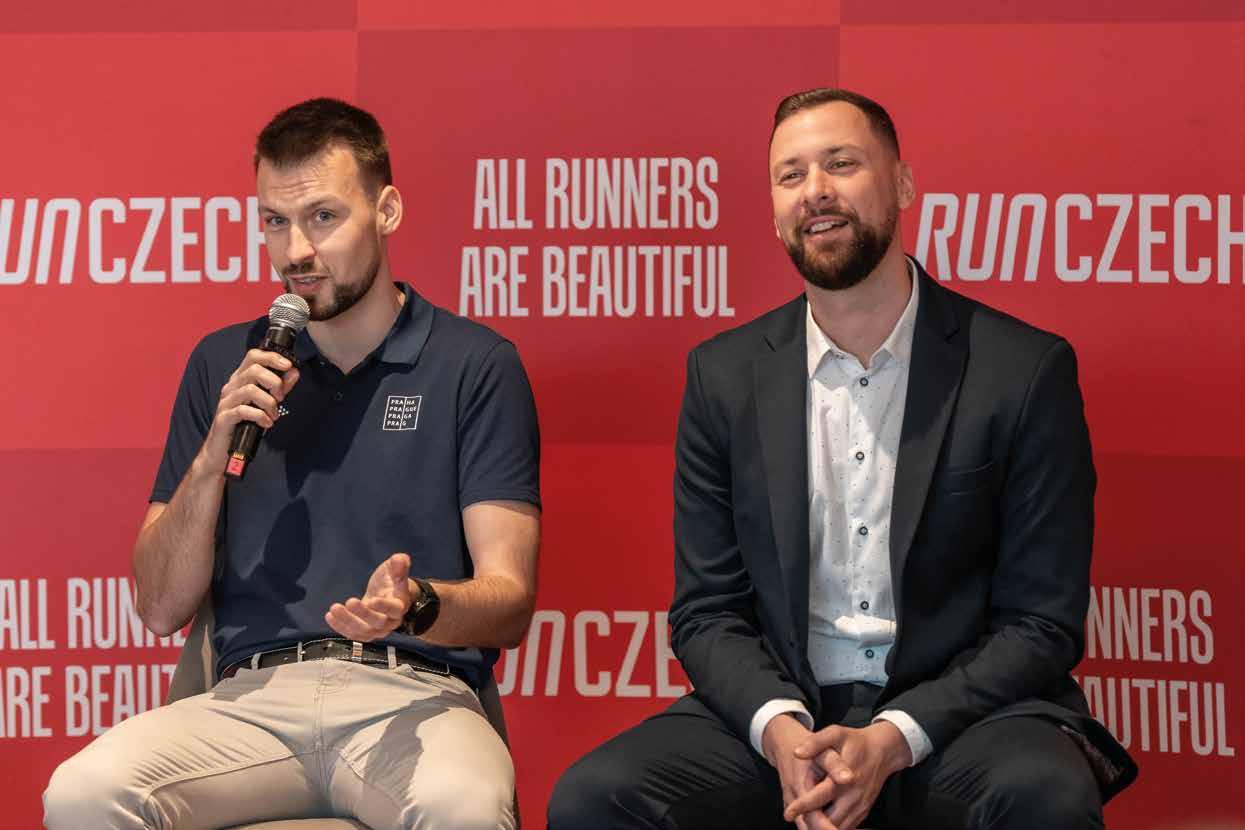
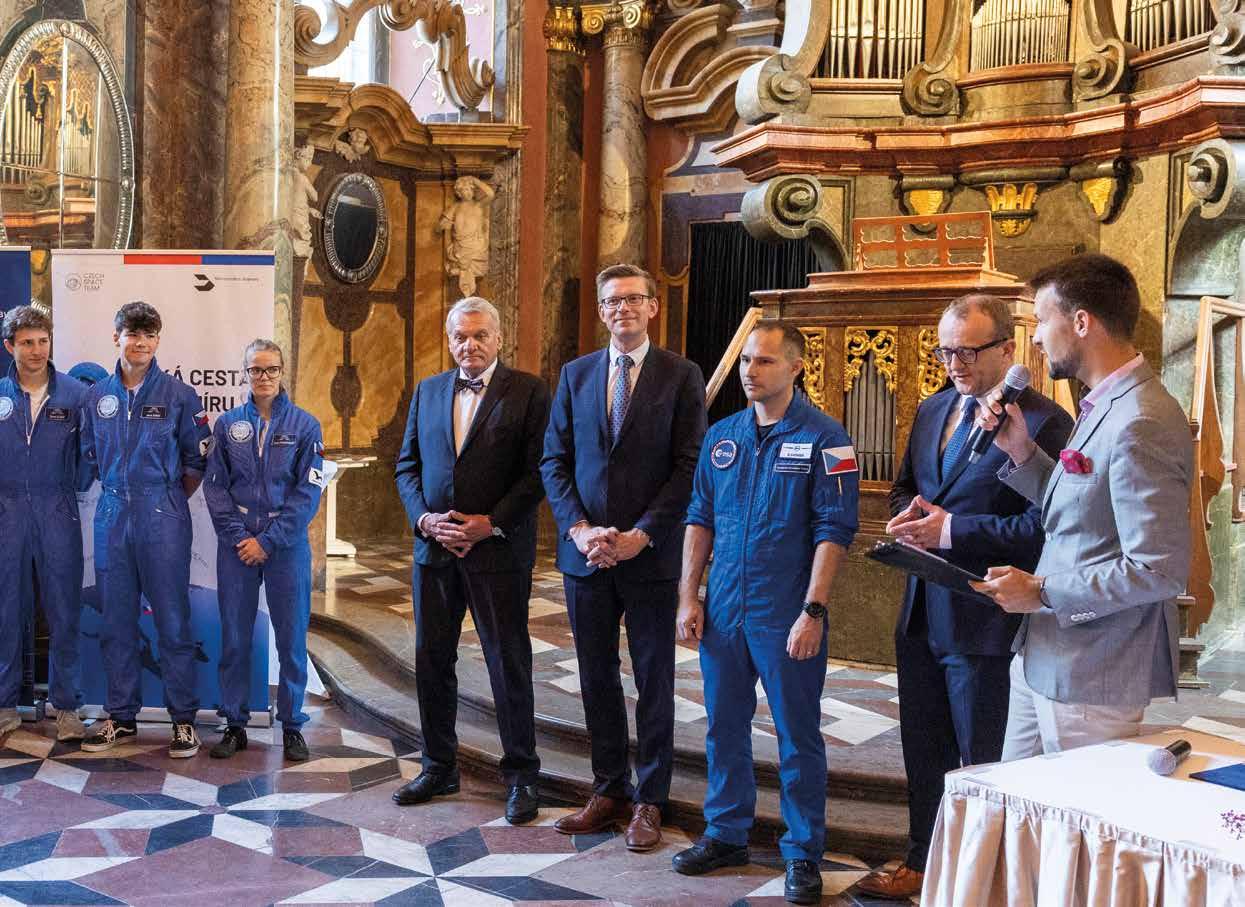
What is the most difficult part of being a spokesperson, in your opinion?
The hardest part is learning how to cope with constant stress, and the fact that you’re always on call. As a spokesperson, you don’t really have fixed working hours –things are always happening, and they can happen at any time.
Can you tell us about the best adventure you have ever had?
The best adventure? If we’re talking about work, then it’s definitely those major crisis situations that suddenly arise and need to be handled immediately. For example, imagine you’re spending a quiet Saturday at home, slowly and lazily getting ready for an evening ball, and then, just after noon, you get a text message saying the Troja footbridge has collapsed.
Suddenly, your plans completely change, and you have to react. In my personal life, I constantly try to keep creating new adventures. My most recent experience was water skiing, or last year’s via ferrata climb in Austria.
What is the most unexpected challenge you have faced?
Sometimes I joke that after ten years in this job, I’m still surprised that things can surprise me. Sometimes it’s strange letters from citizens, but more often it’s various administrative hurdles, or new laws that don’t always make practical sense and seem disconnected from reality.
However, I do remember one particular letter – or maybe it was an email – from a citizen reacting to a TV interview I had given. To this day, I’m still trying to decode that
message (smiling). But I eventually clarified the situation with the gentleman, and, in the end, he said, “Well, to be fair, we have bigger idiots in our city.”
In the event of a crisis, you are at the front line. How do you address the public?
Every crisis and situation is unique and requires a slightly different approach. But the key is always to provide clear, simple, and understandable information. Even if I don’t have all the details yet, that’s not necessarily a problem – what matters is to communicate, nonetheless. Being transparent and present builds trust, which is absolutely essential, especially in uncertain moments.
What do you do in your free time?
In my free time, I enjoy spending

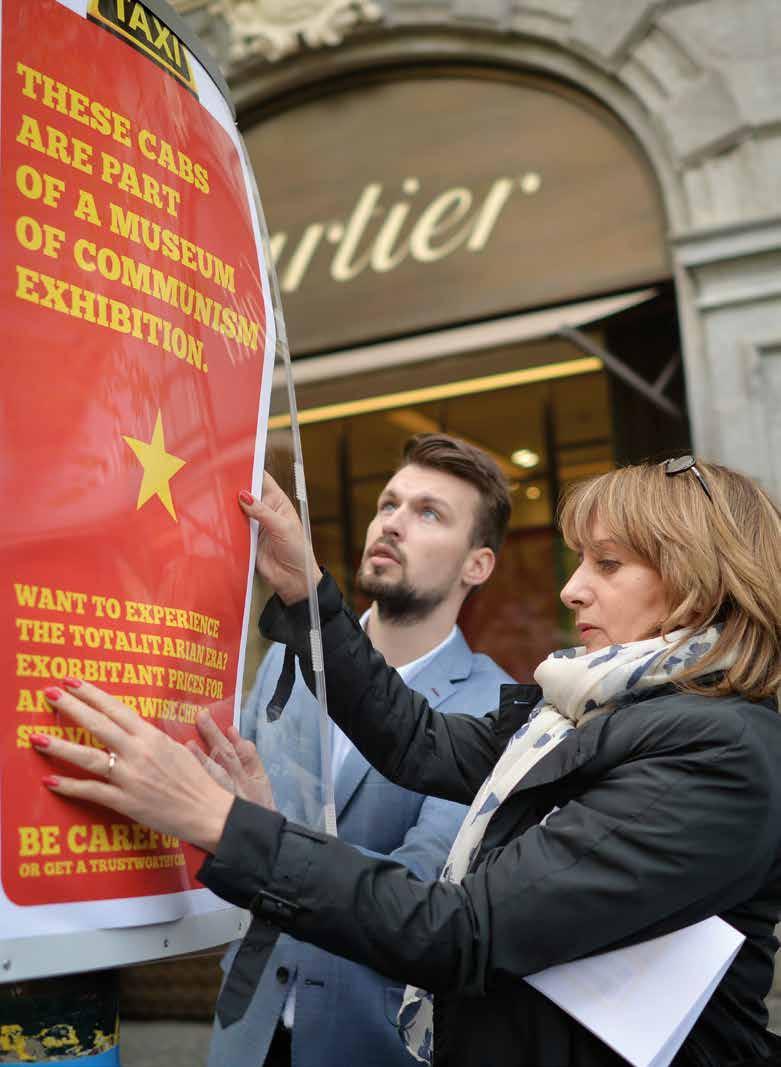
time with friends and family, or doing some kind of sport. I like running, cycling, playing football, floorball, and beach volleyball. I also enjoy going to the theatre, the cinema, or to a concert – ideally with my girlfriend or friends. I’m not very good at going to places on my own (smiling).
You have successfully completed ten years in your career. Where do you see yourself ten years from now?
At the moment, I don’t have a specific plan. Ten years may seem like a long time, but I’m sure they’ll pass just as quickly as the last ten did. What I do know is that I want to keep doing work I enjoy, and I definitely want to stay in front of the TV camera.
Can you give a piece of advice to the next generation of young spokespeople?
My advice is to learn from and be inspired by more experienced colleagues, not be afraid to take the initiative, and always approach things with thoughtfulness and sensitivity.
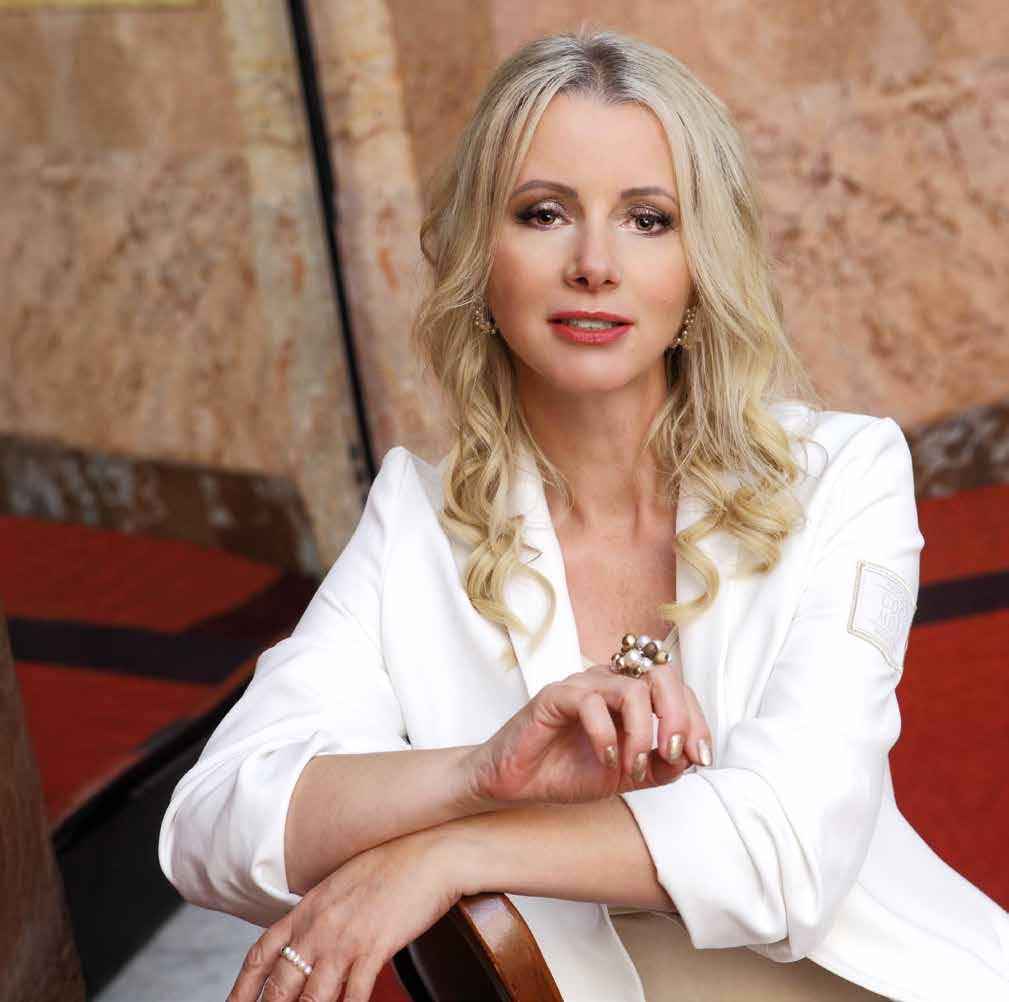
“Change is not only necessary – it is also possible,” states Eva Primus Kovandová, President of the non-profit organisation Business & Professional Women CR, which promotes women’s economic independence and equal representation in decision-making positions.
“The gender pay gap stands at 17.9% in the Czech Republic, which places us at the very bottom of the European rankings. On a global scale, we rank behind countries such as Bangladesh. In our organisation, we believe that equal opportunities are not only a matter of fairness but also a key driver of innovation and greater efficiency.”
Tell us about yourself, please.
My name is Eva Primus Kovandová, and throughout my professional life, I have been dedicated to supporting entrepreneurs – both women and men – who have the
courage to transform the world around them. I currently serve as the Director of the Executive Board Office at the Prague 1 Chamber of Commerce, and I also hold the position of the President of the non-profit organisation
Business & Professional Women CR. My work focuses on strategic development, cooperation with public administration, and organising professional events for the business community.
Thanks to my experience in the corporate environment, I adapt quickly to new situations and changes. My strong communication and presentation skills enable me to clearly convey ideas and inspire others. Public speaking comes naturally to me, and I am able to remain calm and decisive even in challenging moments.
I have also been a long-term supporter of the Harmonie Endowment Fund, where I volunteer to help raise funds for its activities.
My passion lies in creating business opportunities that not only improve people’s lives but also contribute to sustainability. I believe in the power of
collaboration, inspiration, and the courage to pursue unconventional goals.
You are the President of the Business & Professional Women CR. Can you introduce us to this organisation?
Business & Professional Women Czech Republic (BPWCR) is a public benefit organisation that has been actively promoting women’s economic independence and equal representation in decisionmaking positions since 2010. We are part of the global BPW International network, operating in over 100 countries, uniting women who strive for change that goes beyond traditional business boundaries.
Our vision is to build a strong community of women who support one another, share their experiences, and work together to transform the environment in which they live and work.
We believe that equal opportunities are not only a matter of fairness but also a key driver of innovation and greater efficiency.
BPWCR runs the #equalpay campaign, which culminates in the Equal Pay Day conference, mentoring programs, workshops, networking events, and a variety of educational activities. Our projects focus on developing female talent, strengthening leadership, supporting sustainability, and shaping corporate cultures that reflect the needs of all.
We are proud that our members and corporate partners work together to create space for growth, connection, and positive societal change.
What is the main activity of BPWCR?
The core mission of Business & Professional Women Czech Re -

public is to promote women’s economic independence and equal representation of women in decision-making positions. This mission is fulfilled through a wide range of educational, advocacy, and community-building activities that connect women across professions, generations, and regions.
BPWCR implements a variety of projects, including:
• Equal Pay Day – the largest conference on equal pay in the Czech Republic, bringing together hundreds of women and men from diverse fields.
• Women’s Empowerment Principles (WEPs) – supporting companies in implementing principles of gender equality and sustainability.
• Academy for Women Entrepreneurs – an educational program for aspiring female entrepreneurs.
• Mentoring Program –cross-company mentoring designed for women seeking career growth and experiencesharing. The program will launch for the eighth time this October.
Can you describe the situation in the Czech Republic regarding equality?
When it comes to equality in the Czech Republic, the situation remains serious. The gender pay gap – the difference between the average hourly earnings of employed women and men – stands at 17.9%.
This places the Czech Republic at the very bottom of the European rankings, which is truly alarming. On a global scale, we rank behind countries such as Bangladesh.
We consider this status shameful, and it is high time for change. Change is not only necessary – it is also possible, if society comes
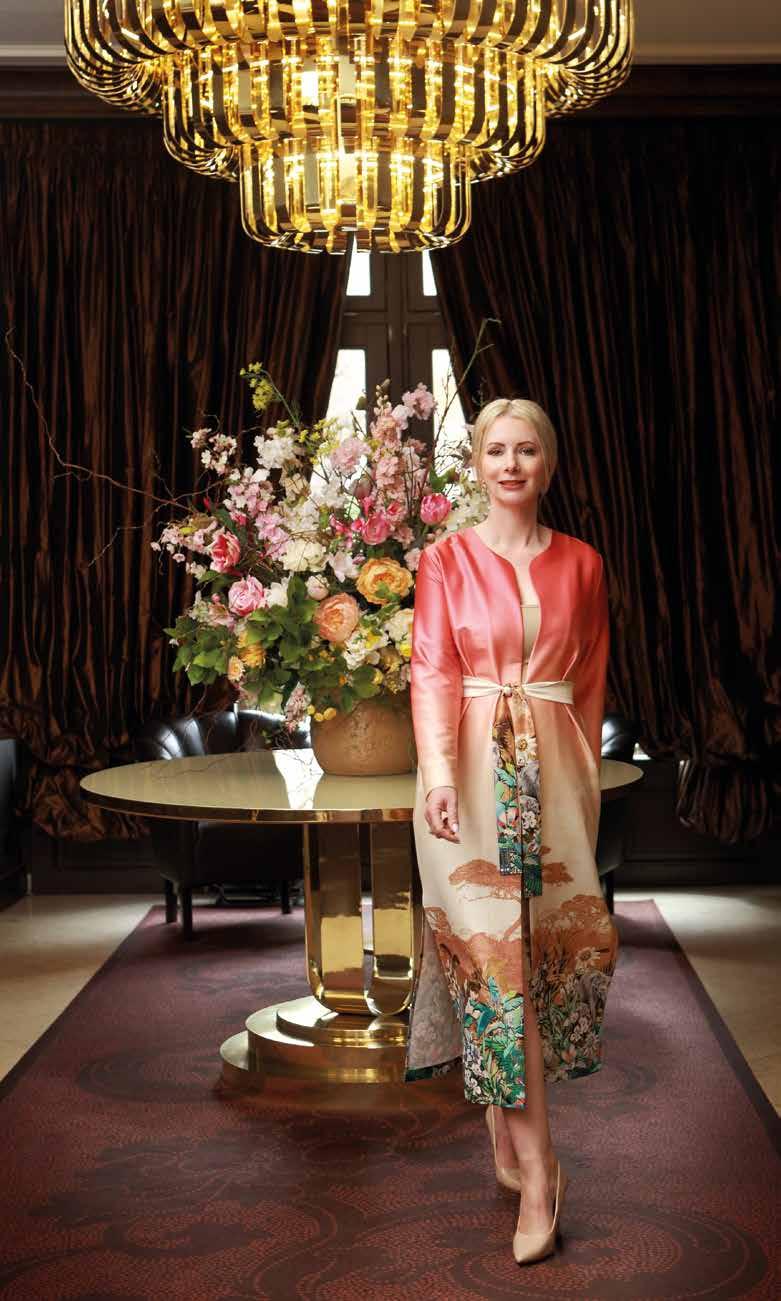
together and commits to achieving genuine equality.
What do you do in your free time?
I enjoy spending my free time on activities that bring me joy, balance, and inner peace. One of my greatest passions is horses – riding is not only a form of
relaxation for me, but also a way to reconnect with nature and with myself. My favourite moments are spent riding through forests and meadows, where I can recharge and regain fresh energy.
I also love travelling, skiing, reading, and spending quality time with my family. I have two dogs, who always greet me with
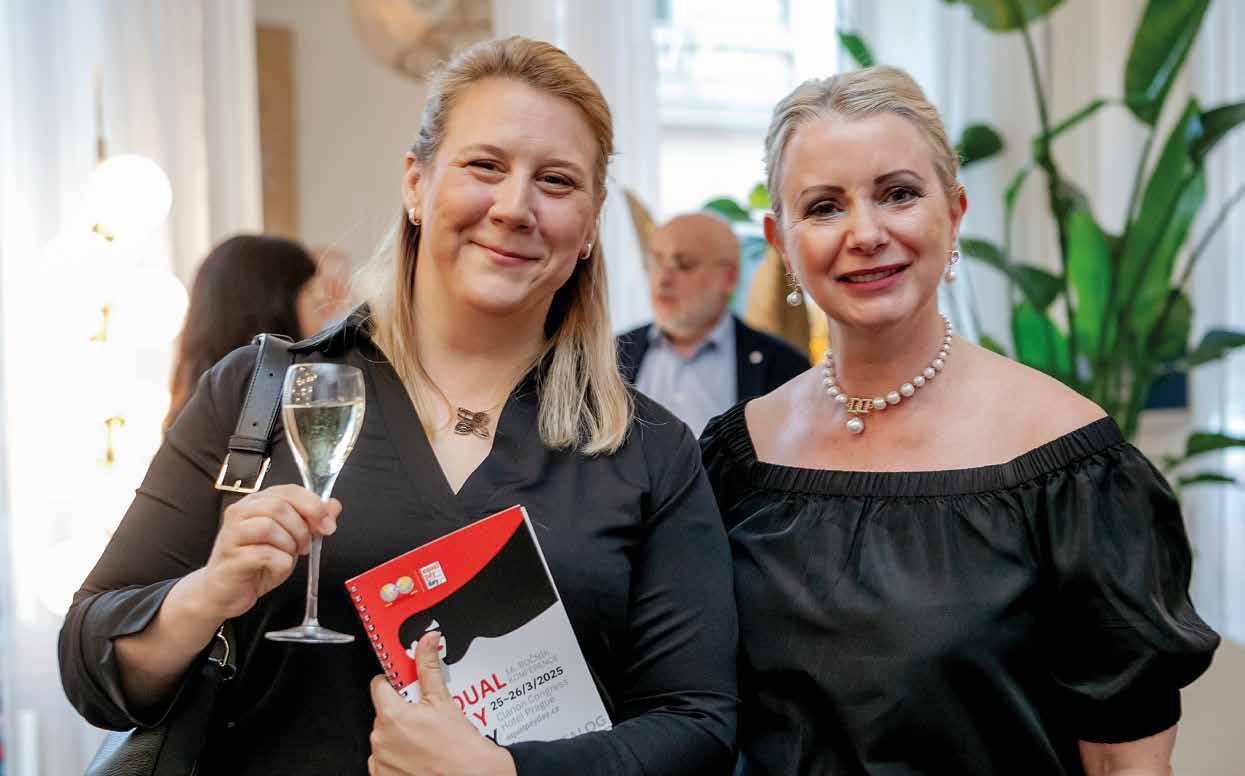
excitement. I deeply value my friendships, and cherish every opportunity to spend time with friends whenever circumstances allow.
I believe that the true beauty of life lies in these small moments –family comfort, peaceful walks in nature, or simply sharing laughter with loved ones.
How do you manage family duties and your demanding job?
Balancing family life with a demanding career in a managerial position is a daily challenge – but that fulfils me and drives me forward. Every day, I juggle multiple roles: I care for my family, fulfil my professional responsibilities, and also manage the operation of an accommodation facility that we run. Yet I always make time for my hobbies, which give me the energy I need and helps me maintain balance in life.
Careful planning of every minute, as well as the ability to stay
flexible when needed, are key for me. I know I can’t do everything, so I focus on being where I’m needed most – whether that’s at home, at work, or in my volunteering activities. My husband is a tremendous source of support; his encouragement gives me the strength and confidence to take on new challenges.
At the same time, I’m aware that constant stress is not sustainable in the long run. That’s why I actively work to release tension, listen to my needs, and make space for activities that recharge me. I believe that the support of loved ones is essential – it is thanks to them that I can get through even the most demanding of times. And although it can sometimes be difficult to balance it all, I know it’s worth striving for harmony.
Where do you see yourself in 10 years?
In ten years, I hope to see myself as a woman who has not only achieved professional success but
has also helped create an environment where women are unafraid to be ambitious, courageous, and true to themselves. I need things to have meaning. When I commit to something, real satisfaction comes from positive feedback –whether from clients or from my daughters.
My vision is to one day look back and know that my efforts mattered. That I didn’t strive in vain, but that my work and dedication were valuable to others – brought them joy, made a difference, or offered support in some way.
In ten years, I also hope to have more space for my family, horses, travel, and time in nature –because that’s where I draw the energy for everything. If I manage to align my professional ambitions with personal balance, I will consider the past decade truly meaningful and fulfilling.
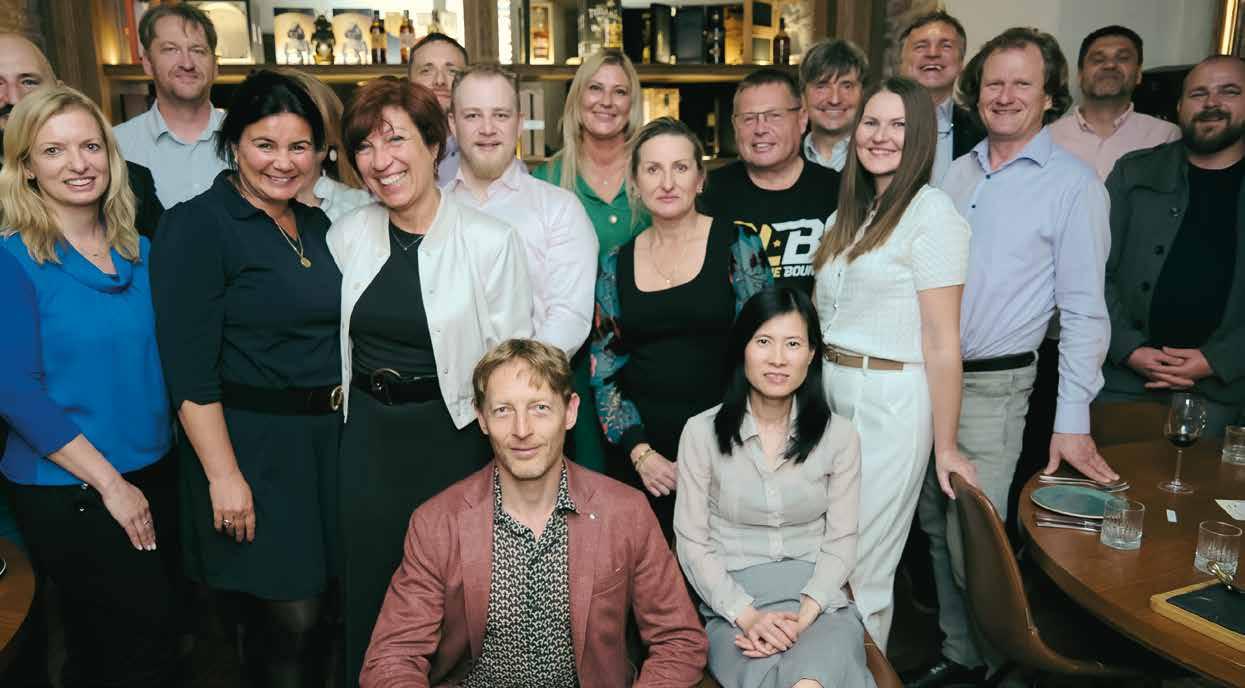
Some ideas are as fragile as glass, but prove their strength over time – just like the Patrons’ Club, supporting the new generation of world-class glassmakers through the Stanislav Libenský Award international competition.
It all started two years ago, with a meeting with five existing supporters who were sending small amounts to the Stanislav Libenský Award. I then started reaching out to business personalities and artists, and the Patrons’ Club was born. It has over thirty members, and thanks to that we were able to finance last year’s competition solely from club contributions. We inspire and help each other; in short, any problem can be solved in the Patrons’ Club.
In addition to their love of art, the club members are united by other motivations. Some have a deep connection to glassmaking, while others want to meet interesting people or enjoy contributing to a good cause. Everyone brings their knowledge, skills, opportunities, and contacts to the table, and they all grow together. They know that they are also helping young artists develop.
The highlight of the club’s meetings is the annual Stanislav Libenský Awards ceremony. This competition has been running for 15 years, and is only open to recent graduates of glass schools from around
the world. An international jury selects 40 to 50 of the best works from the entries, which are then exhibited in Prague. Over the past 15 years, it has presented nearly 600 artists from the US and Canada to Europe, China, Australia, Japan, and Korea.
The winner receives tuition to the most famous summer school of glass art in Pilchuck, where the world’s best professors and artists teach. For many glassmakers, this is their first step onto the international scene, which is the primary purpose of the competition. After graduating from university, artists often lose their support system and struggle to continue creating.
The Stanislav Libenský Award has become a prestigious competition. The award has opened the door to exhibitions and other
projects for its winners. Without the Patrons’ Club, the competition could not function. If you are interested in finding more about
us, you are welcome to visit our website, klubpatronu.cz.
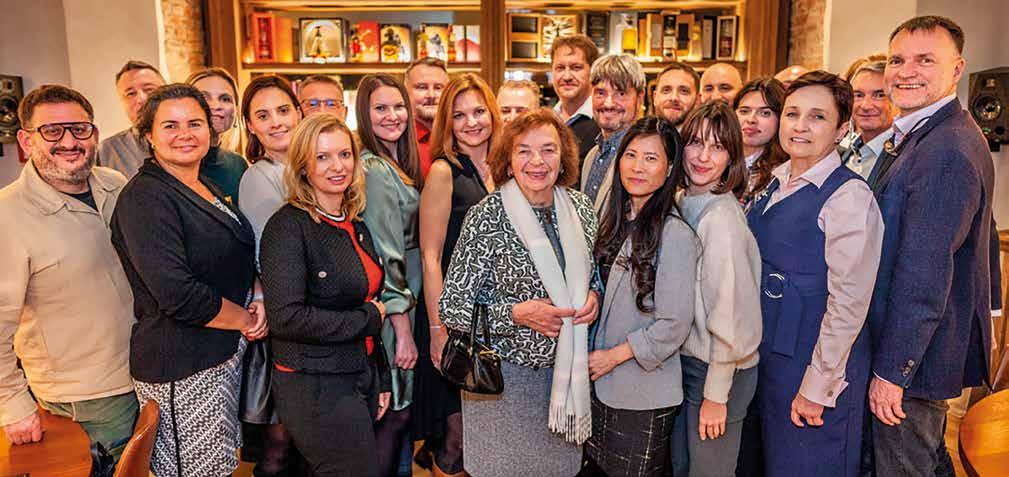
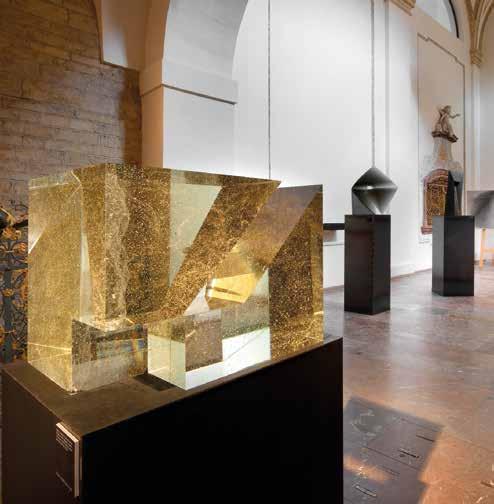
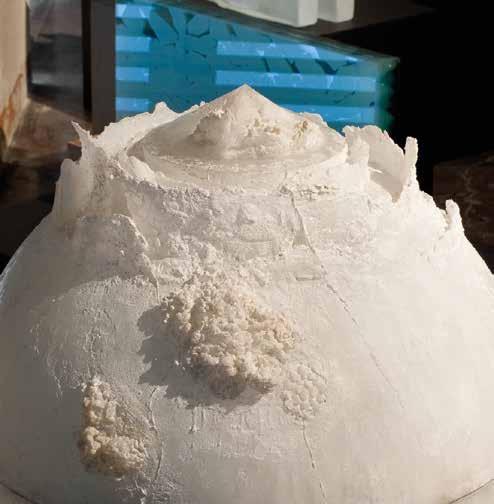
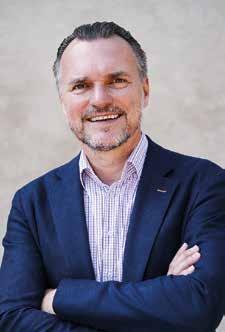
is a Czech businessman, artist, and art producer. In 2007, he founded the non-profit organization Prague Gallery of Czech Glass, providing an informal space for meetings devoted to the history and presence of Czech glass art. In 2009, the gallery under his leadership organised the first Stanislav Libenský Award, open to young artists worldwide, graduates of bachelor’s or master’s degrees who have used glass in their final work.
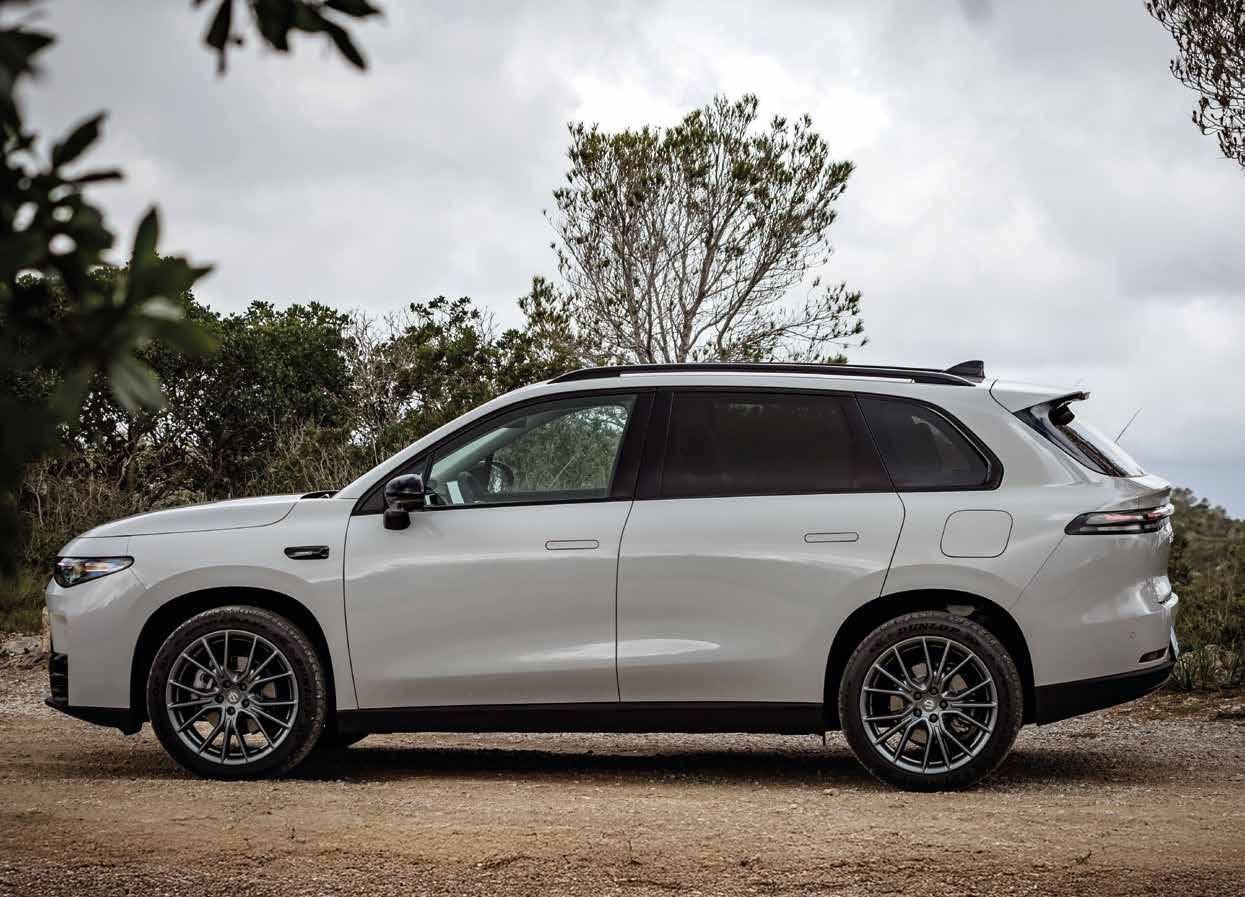
Chinese carmaker Leapmotor is entering the Czech automotive market with two models, a compact city car, the T03, and a mid-size SUV, the C10, for longer drives. The C10 REEV (range extended electric vehicle) version is equipped with a gasoline engine that continuously charges the battery, over 900 km on a full charge and full tank.
Chinese carmaker Leapmotor is one of the fastest-growing electric vehicle manufacturers in Asia. Founded in 2015, it is known for developing and producing key technologies in-house – including batteries, powertrains, and software. Thanks to this integrated approach, it can offer technically advanced, yet affordable electric vehicles aimed at value-conscious customers.
In 2023, Leapmotor entered into a strategic partnership with international automotive group Stellantis, which includes brands like Peugeot, Citroën, and Opel. The two companies jointly formed Leapmotor International, a global venture responsible for expanding their presence outside China –across Europe, India, the Middle East, Africa, South America, and Asia-Pacific. In Europe, Leapmotor
is entering markets such as the Czech Republic through selected dealers from the Stellantis network. The first Czech showroom opened earlier this year.
Plans are also underway for local production. From 2026, the new
European model Leapmotor B10 is expected to be manufactured at the Stellantis plant in Zaragoza, Spain. This move will help the company avoid additional import duties and make logistics more efficient. For customers, it means quicker deliveries and better service support.
Two models are currently available in the Czech market. The Leapmotor T03 is a compact city car with a WLTP range of up to 265km. Its key selling points are a very competitive price and a well-equipped standard


package – including advanced driver assistance features typically found in more expensive vehicles.
The second option is the mid-size SUV Leapmotor C10, including a version featuring advanced REEV (Range Extended Electric Vehicle) technology. This system combines an electric drivetrain with a petrol-powered generator that recharges the battery when needed. While daily mobility is handled electrically, the total range exceeds 900 km. This offers
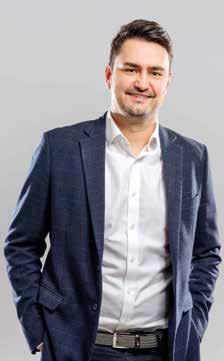
a practical solution for drivers taking longer trips, or those without reliable access to charging stations.
Simply put, the REEV version is an electric vehicle that uses a battery-powered electric motor for primary propulsion, but also includes a small internal combustion engine (ICE) that acts as a generator to recharge the battery when it runs low, extending the vehicle’s range. This means the vehicle’s wheels
are always driven by the electric motor, and the ICE only operates to generate electricity to power the motor or recharge the battery, not directly powering the wheels. On top of that, its fast-charging technology allows the C10 REEV to recover 50% of its electric range in just 18 minutes, making long trips even more practical.
is an automotive industry expert with over ten years of experience, starting in 2012. He has worked for companies such as Opel, AAA Auto, and Škoda Auto, where he focused not only on the Czech domestic market but also on international sales – particularly in India, as well as key markets across Africa and Asia. He currently holds the position of Head of New Business and Marketing at Auto Dobrovolný, where he is responsible for developing new business opportunities and overseeing marketing activities.
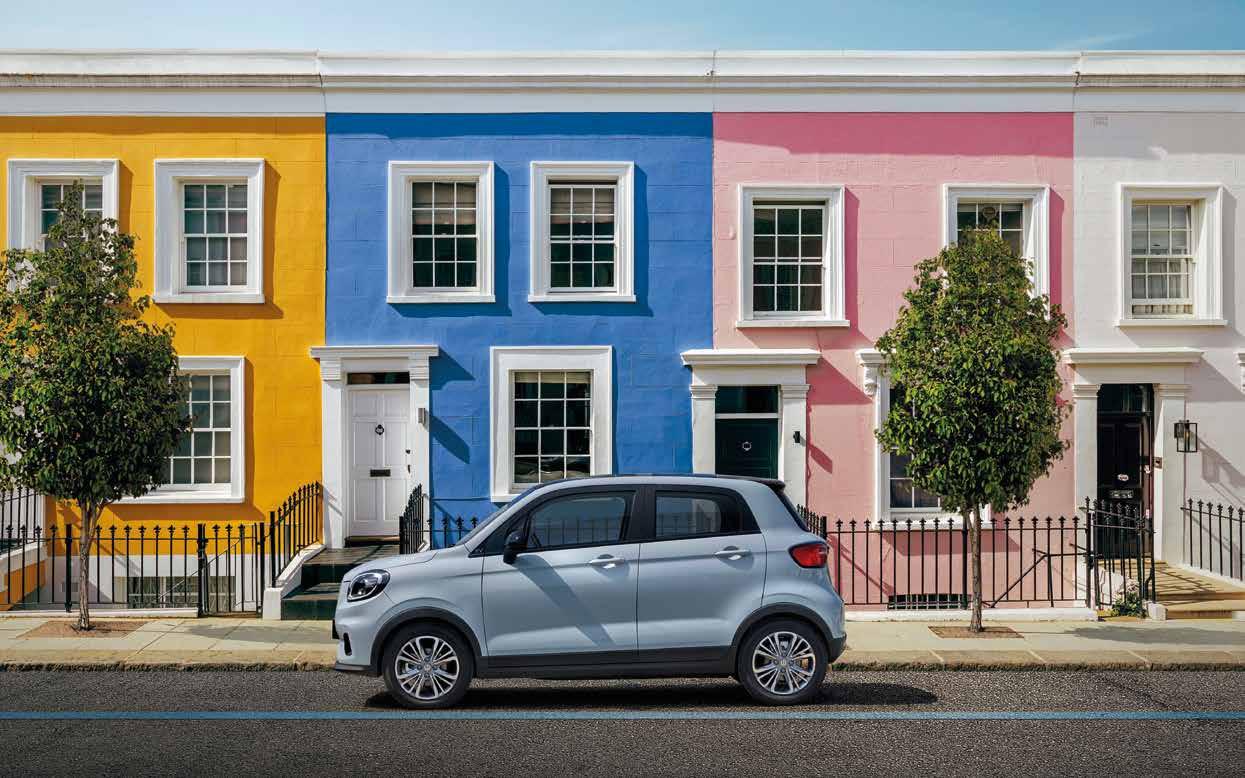
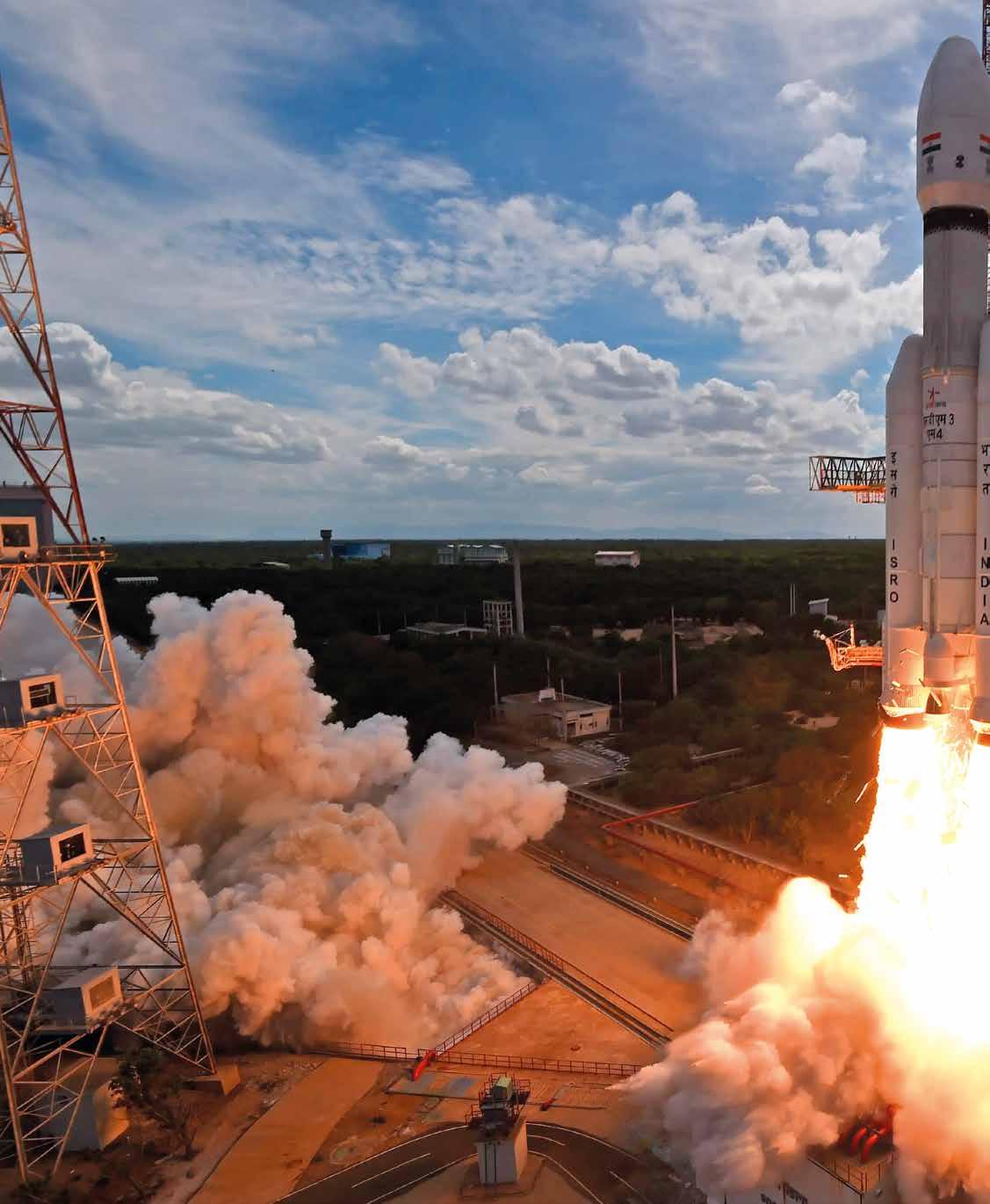
Reaching for the stars is becoming an everyday affair at India’s space agency. Having visited the Moon and Mars with orbital missions, the focus is now on a mission to Venus and a sample return from the Moon. The goal of a human space flight, flying an Indian citizen on an Indian rocket from Indian soil, where the countdown will also be conducted by India, is also taking shape fast. With cost-effective yet reliable space missions, India is poised to become a major player in the global space race.
India’s space journey has reached new heights with the successful landing of Chandrayaan-3 nearer the Moon’s South Pole on August 23rd, 2023, making
India the first country to achieve this feat. This mission demonstrated the ISRO’s (Indian Space Research Organisation) capability in precision lunar landing and

roving. The Vikram lander even performed a hop experiment, and the propulsion module was later manoeuvred into Earth orbit for extended operations.
Building on this momentum, the ISRO achieved its 100th rocket launch in January 2025, launching a navigation satellite showcasing India’s indigenous cryogenic engine technology.
Presence: the NISAR satellite and ISS mission
The pinnacle came with the July 30th, 2025, launch of the nearly $1.3 billion NASA ISRO Synthetic Aperture Radar – or NISAR satellite – a joint Indo-US Earth observation mission. Launched aboard India’s GSLV F-16, from the Satish Dhawan Space Centre at Sriharikota in southern India, NISAR features dual-frequency SAR payloads from NASA and ISRO and will monitor climate change, disasters, and agriculture. ISRO Chairman Dr. V. Narayanan hailed it as a symbol of India’s technological leadership and global collaboration, emphasising the precision and reliability of India’s cryogenic launch systems.
NISAR is poised to revolutionise how we observe and understand our planet. At its core, it is designed to monitor changes in Earth’s surface with unprecedented precision, capturing movements as small as a centimetre. This capability is vital for tracking natural hazards such as earthquakes, landslides, volcanic activity, and glacial shifts, as well as human-induced changes like urban expansion, agricultural development, and infrastructure stress.
The ISRO says the NISAR satellite weighs 2,392kg and it will scan the entire globe, provide all-weather, day-and-night data at a 12-day interval, and enable a wide range of applications.
The NISAR satellite, which has cost upwards of $1.3 billion to make, can detect changes in the Earth’s surface such as ground deformation, ice sheet movement, and vegetation dynamics. Further applications include sea and ice classification, ship detection, shoreline monitoring, storm characterisation, changes in soil moisture, mapping and monitoring of surface water resources, and disaster response. It has been dubbed a lifesaving satellite.
In a landmark achievement for India’s space program, Group Captain Shubhanshu Shukla completed a 20-day mission, including 18 days aboard the International Space Station (ISS), as part of the multinational Axiom-4 mission – dubbed Mission Akash Ganga. This marks
India’s first human spaceflight since Wing Commander Rakesh Sharma in 1984. Prime Minister Modi hailed Shukla’s courage and dedication as inspiring a billion dreams.
Launched aboard SpaceX’s Falcon 9, Shukla served as mission pilot and conducted seven India-specific experiments. Despite delays, the mission concluded successfully with a splashdown near San Diego. It lays the foundation for India’s Gaganyaan mission, targeting a 2027 launch from Indian soil.
India’s roadmap doesn’t stop at Gaganyaan. Prime Minister Modi has outlined a bold vision:
establishing an Indian space station by 2035, and landing an Indian on the moon by 2040. If successful, India will join the elite club of nations – Russia, the United States, and China –with independent indigenous human spaceflight capabilities.
India’s lunar legacy is already formidable. India’s first foray to the moon with the Chandrayaan-1 mission in 2008 discovered the presence of water molecules on the moon, fundamentally altering lunar geological history forever. Chandrayaan-2 provided the first independent images of Apollo mission artefacts left on the lunar surface, and Chandrayaan-3 made global headlines by landing nearer the moon’s South Pole – now considered the gold rush zone for lunar exploration.
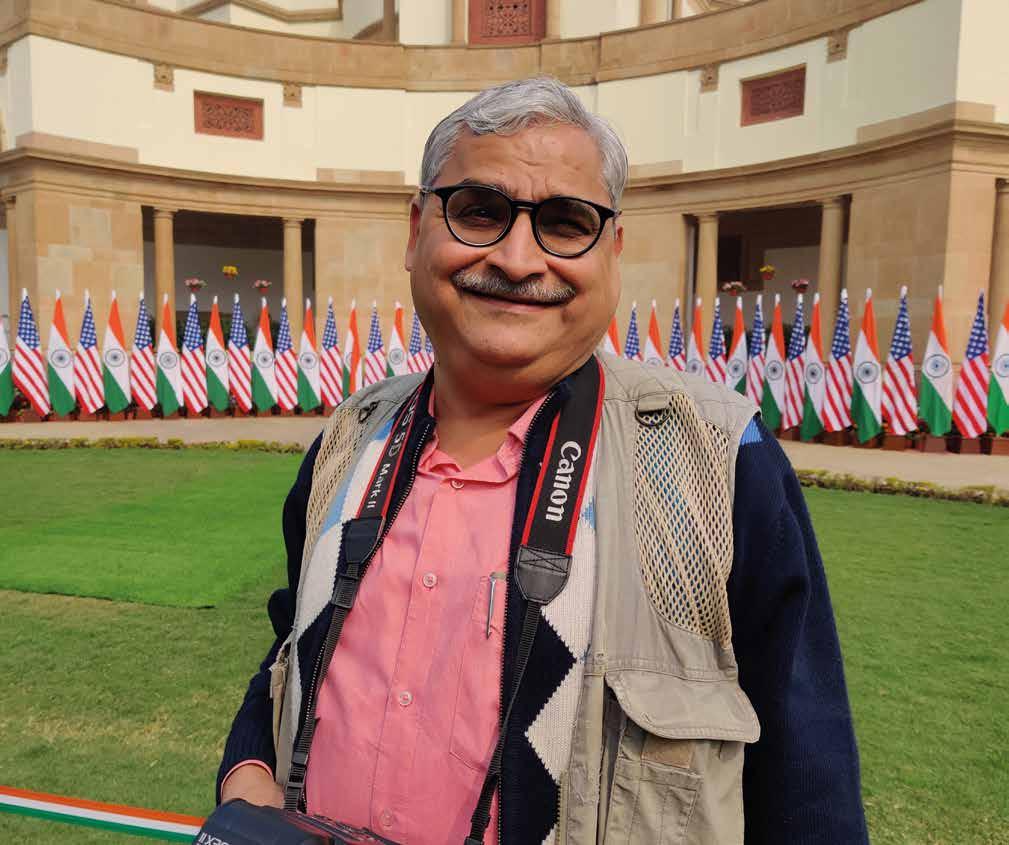
With cost-effective yet reliable space missions, India is poised to become a major player in the global space race. The government has already allocated billions of dollars for the human spaceflight program, underscoring its commitment to cosmic exploration.
India’s science minister, Dr Jitendra Singh, who also looks after the affairs of the Department of Space, says “India’s quantum leap in space research, with India’s space economy standing at $8 billion, has been only possible due to the courageous decision to open up or unlock the space sector from the shackles of the past.” He further highlighted that “India’s space economy is projected to grow beyond $40 billion by 2040, which is going to be a gigantic jump.”
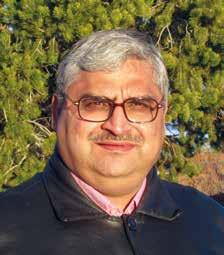
The future space missions include a lunar sample return mission named Chandrayaan-4, a mission to Venus, and the development of the new mighty rocket. As part of this ambitious roadmap, India plans to establish its own space station, the Bhartiya Antariksha Station, by 2035. A precursor to this will be the launch of a space module in 2028. The culmination of this vision is the planned landing of an Indian astronaut on the Moon by 2040.
“When we celebrate the 100th year of India’s independence, in 2047, an Indian flag will already be flying on the Moon”, asserts Dr Singh.
Today, over 250 space start-ups are driving innovation and fuelling India’s space sector. Among these, Agnikul Cosmos and Skyroot
Aerospace have made headlines by launching sub-orbital rockets, and Pixxel Aerospace makes unique high-resolution satellites.
A recent study estimates that for every dollar spent on space, India has reportedly received a return of $2.52. India has end-to-end capabilities in space, as the country makes its own rockets and satellites and has an enviable space technology applications portfolio. Today, India has over fifty operational satellites in space, which help power India’s burgeoning economy. India’s vast space ecosystem touches the lives of every Indian.
is an award-winning science journalist. He is a co-author of the book ‘Reaching for the Stars’, and currently works for New Delhi Television (NDTV) as Science Editor. He can be reached at pallava.bagla@gmail.com.
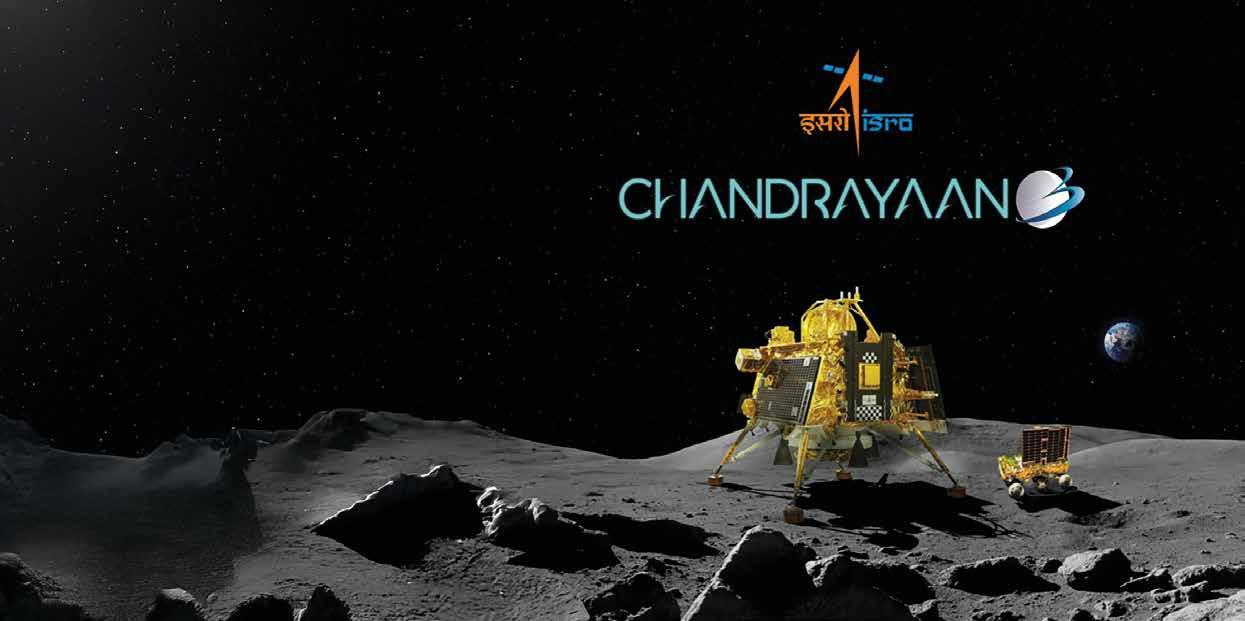
A few months ago, we published our “Out of Africa – Part One” travel report, starting at Victoria Falls in Zimbabwe and finishing in Cape Town, South Africa. You can find it online at: www.czechleaders.com/ insights/out-of-africa-part-one. Now, we would like to share Part Two of our Africa trip, which Václav and I started to prepare for a year before our departure. Join us on our path of exploration, and who knows, perhaps you’ll again discover some valuable insights that could help you navigate your own adventures on the continent in the future.
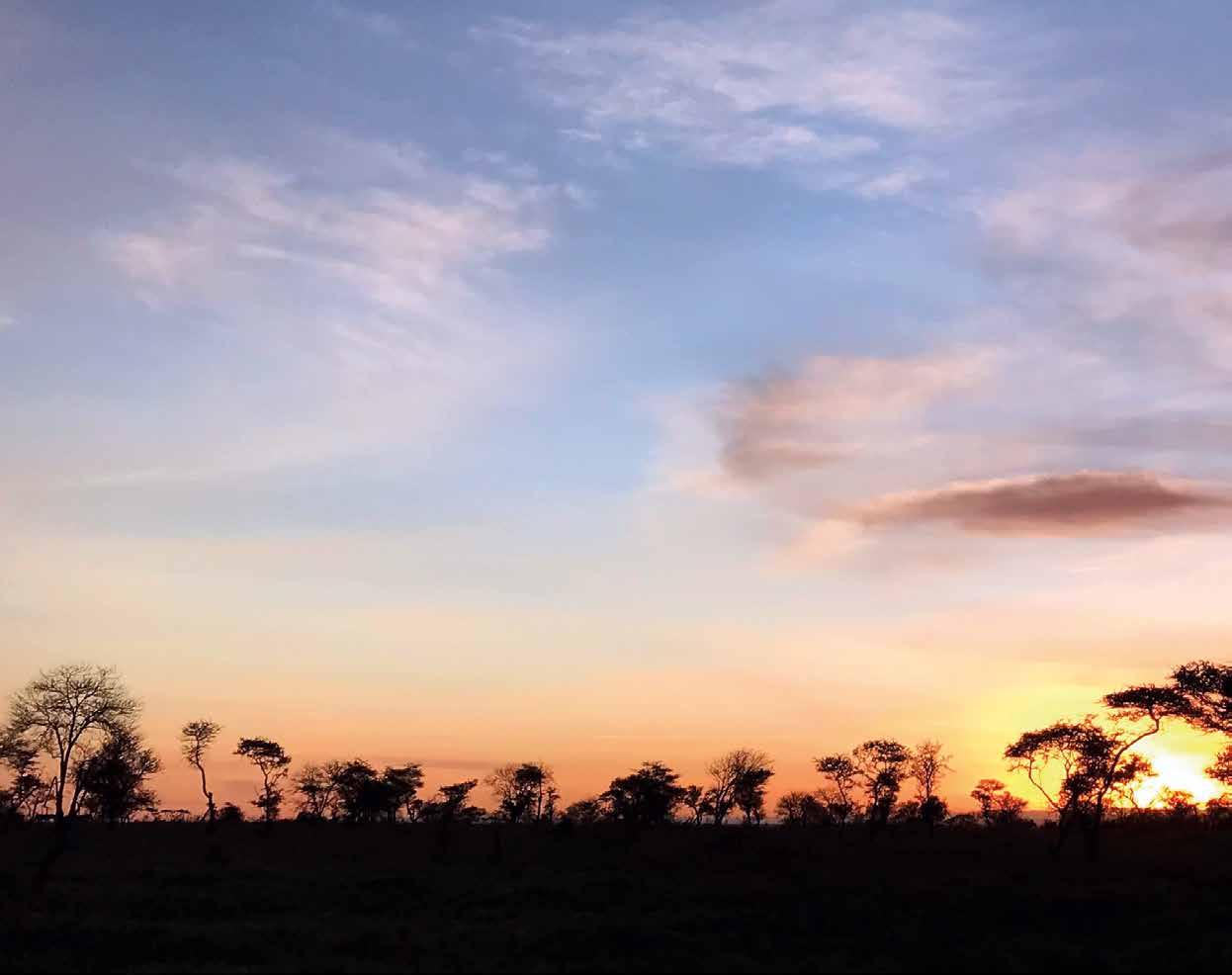
A trip to Africa is not a drive to another EU member country. We started to prepare for our trip about a year before the departure. First, we did the usual check-up about visa and passport validity requirements – which was at least six months in this case. Next, we learnt about each country’s vaccination requests, since they may differ from place to place. The best solution was to consult a special clinic a few months before the trip so that they could give us the best advice and a vaccination pass. We also obtained pills for health emergencies, especially against malaria. Good health and travel insurance are standard.
We wanted to go on a safari in Africa, so we spent some time checking which operator offers the best tours. We were especially interested in the size of the group, the level of the hotels, and a full-board option. The most recommended safari colours are yellow, beige, and khaki. We bought new, special clothing for our adventure. Mosquito-borne diseases are a big problem in Africa, so we took some liquid and equipment against them.
To be on the safe side, we also made copies of ALL our documents and registered at DROZD – the Voluntary Registration of Czech Citizens Travelling Abroad, which can help in case of emergency. We were planning to take many high-quality photos, so we didn’t forget to pack our cameras. However, modern-generation mobile phones can also take great pictures.
When you order flight tickets, do it at least four months in advance – last-minute tickets are more expensive. There are a few options when flying to Africa. We chose to fly with Ethiopian Airlines from Prague – Frankfurt – Addis Ababa – Victoria Falls. And on our way back home from Kilimanjaro – Addis Ababa – Vienna – Prague. Plus, we booked a few flights in Africa separately.

Be silent, NO social talk
Respect the guide / ranger / driver, and follow his manners
Be cautious of animals
Dress neutral – NO black and blue (tsetse) or vivid red and orange (other animals), and NO white
In the case of dehydration: make a drink – half a teaspoon of salt and four tablespoons of sugar
Lions live in social groups called a pride
Dogs have a pack
Hyenas have a clan
Animals of prey have a herd
Monkeys and baboons have a troop
Wading birds – birds that live in shallow waters
Carry a small notebook and pen Carrion – the remains of dead animals
Taking a breath in Zanzibar
An active holiday makes you tired. So, before starting the second part of our safari tour, we had a short break. From Cape Town, which we talked about in Part One of our travel report, we took a flight via Johannesburg and Nairobi to Zanzibar, Tanzania.
Zanzibar is a Tanzanian archipelago off the coast of East Africa, located in the Indian Ocean. It consists of many small islands and two large ones: Unguja (the main island) and Pemba. The capital is Zanzibar City, located on the island of Unguja. Its historical centre, Stone Town, is a World Heritage Site.
In 1964, Zanzibar united with Tanganyika to form the United Republic of Tanzania.
Zanzibar is also known as the birthplace of Freddie Mercury, British singer-songwriter and leader of the legendary band Queen.
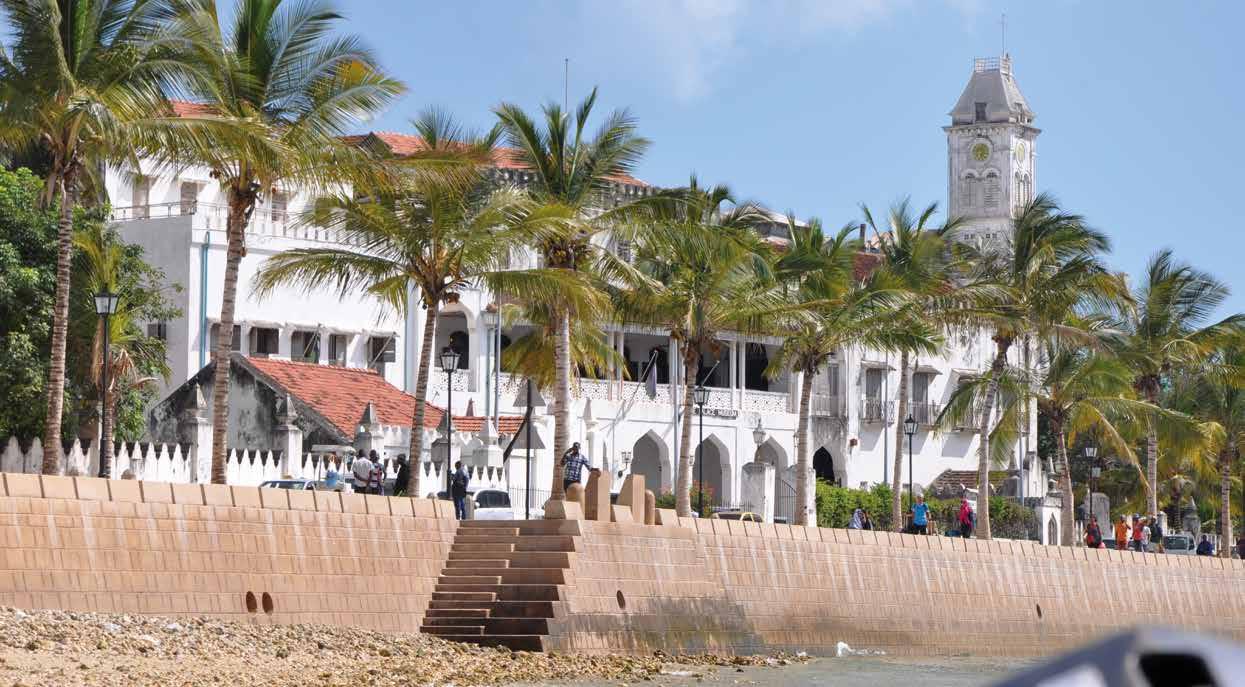


We chose to stay in the beautiful Villa Kiva Boutique Hotel, a 28-room hotel, offering both sea view and garden view bungalows. This boutique hotel is located along the pristine white beach of Matemwe, and they have a great restaurant.
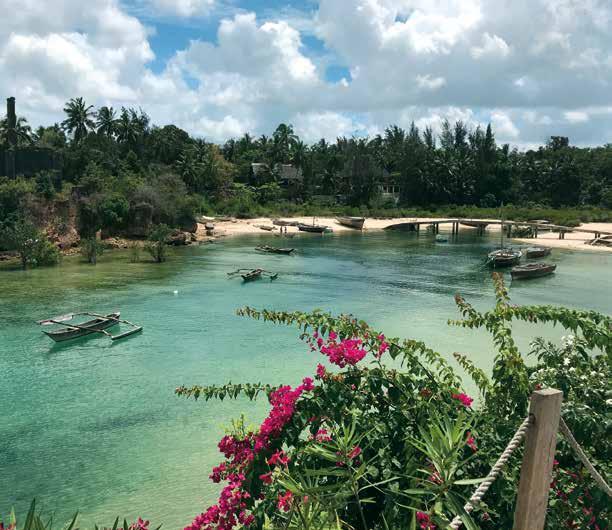

The day after, we took a tour to the City of Freddie Mercury, Changuu Island, also known as Kibandiko, Prison, or Quarantine Island. Recently, the island has become a government-owned tourist resort. It also houses a collection of endangered Aldabra giant tortoises, which were originally a gift from the British governor of the Seychelles. We also went snorkelling in the Indian Ocean.
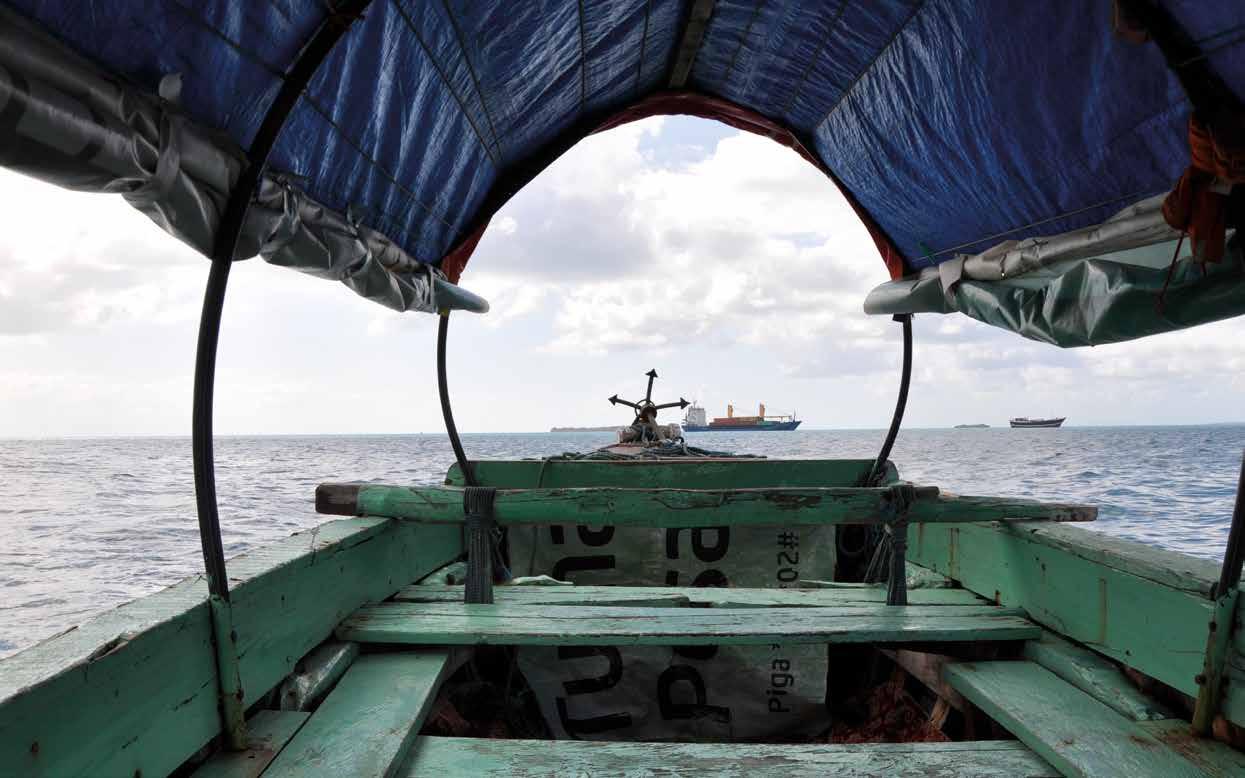
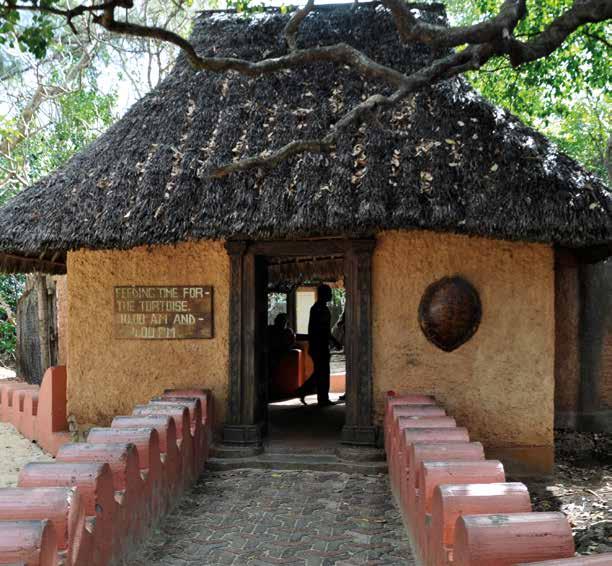
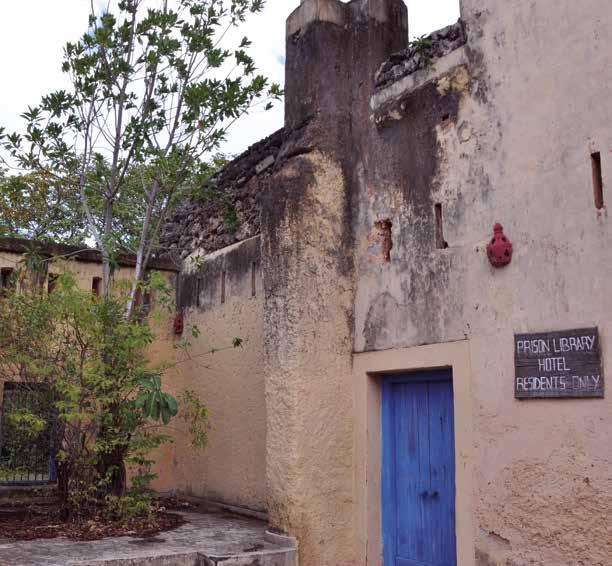

It was only a very short break. Next time, we will stay longer.

From Zanzibar to Arusha it was a very short flight on a very small airplane. Happily, we arrived safely.

Arusha is located at the base of the volcanic Mt. Meru. It is a gateway to safari destinations, as well as to Mt. Kilimanjaro, which, at 5,895m, is Africa’s highest peak.
In the afternoon, we visited Arusha Market, and in the evening, the Tanzanite Experience and the Arusha Cultural Heritage Centre.

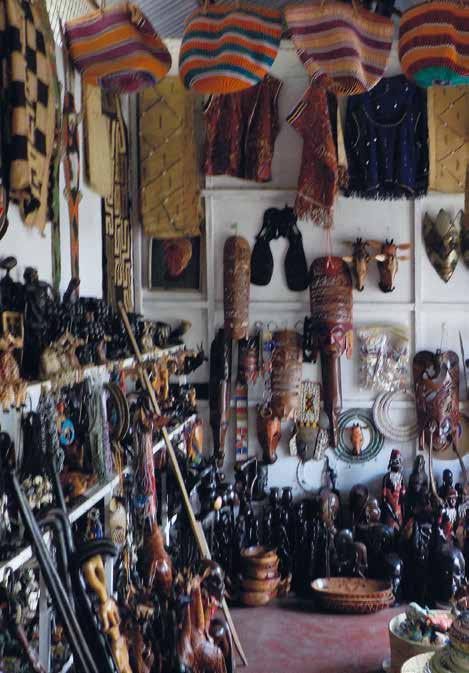
Enjoying our six-day private safari tour Tanzania, in our opinion, is the best place for a safari. We planned a private tour of six days, just the two of us and the guide-driver, to see the Big Five animals in the wild.

Our tour was organised by the Shadows of Africa travel agency (www.shadowsofafrica.com)
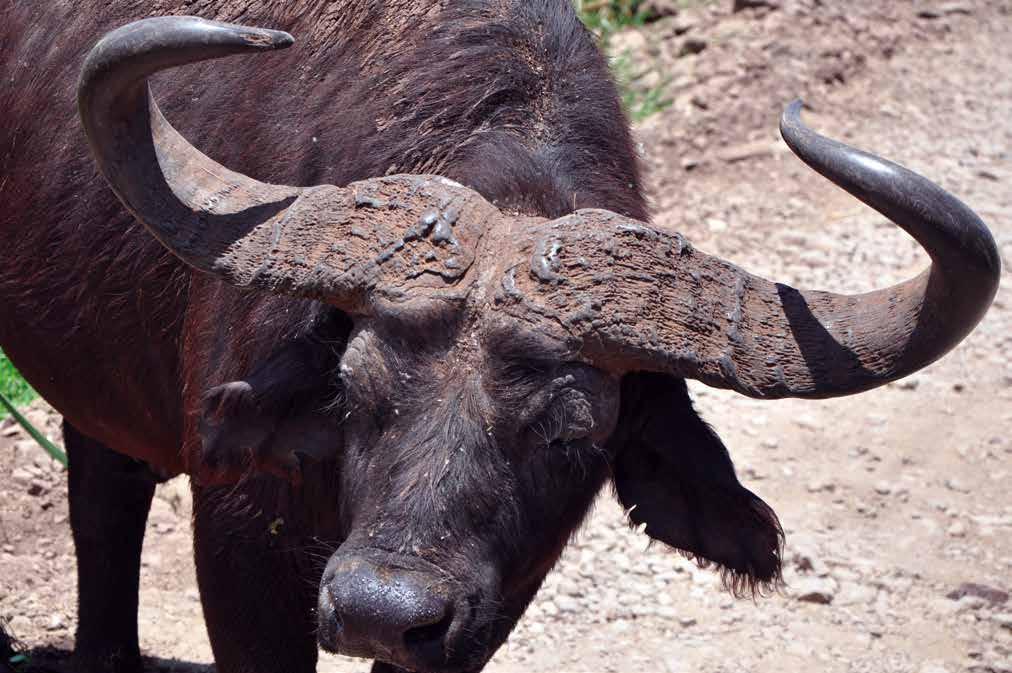

Covering over 300 square km, Arusha National Park has great wildlife densities. It is home to the world’s largest population of giraffes, cape buffalo, elephants, hippos, zebra, and the occasional lion and leopard.
We started at Ngurdoto Gate and drove through Ngurdoto Crater up to Buffalo Point. We could see Lokie Swamps, Jembamba Lake, and Longil Lake.
We then drove to Momela Lakes to see flamingos and walk around, with good views of Mt. Meru and Mt. Kilimanjaro.
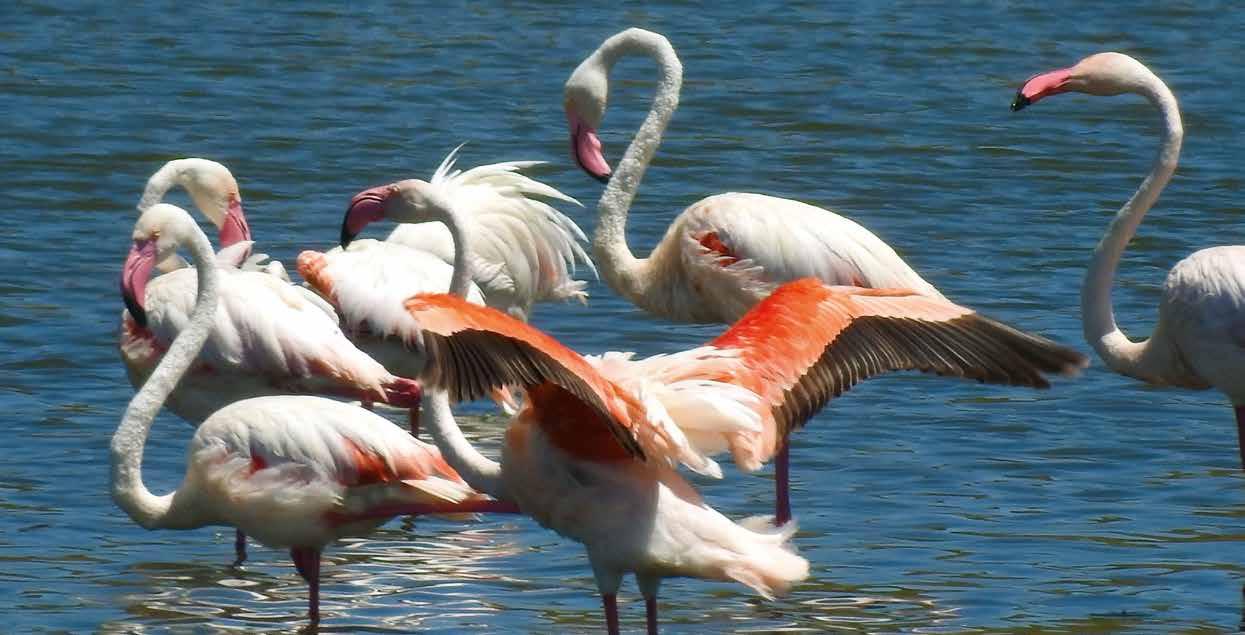

Manyara National Park is one of the best parks in Tanzania. It’s known to have amazing tree-climbing lions.
Two-thirds of the park is covered by water, which makes Manyara Lake a great attraction.
It has an amazing view of the rift valley during all seasons.
During the “game drive,” we saw the climbing lions, herds of elephants, klipspringers, warthogs, impalas, buffalo, hippos, gazelles, lions, leopards, and more.
We also saw a lot of birds, flamingos, ostriches, storks, pelicans, and more.


Serengeti National Park is a world heritage site covering about 30,000 square km, and is probably the best place for a “game drive” to observe prides in their natural environment.
We entered the Serengeti Plain via Naabi Hill Gate and enjoyed the great views of the plain.
We visited Seronera, the site for the visitor information centre, which includes a small museum, a coffee shop, a picnic area, and a staff village. It is also the location for a cluster of campsites and lodges near the visitors’ centre. Seronera is a well-known area for balloon safaris. This truly is Central Serengeti.
We continued exploring to see tree lions and leopards, followed by visiting Kati Kati camp, a mobile camp strategically situated in Central Serengeti, ideal for exploring the extensive Serengeti Plains.


We

In Moru Kopjes, Simba Kopjes, and Gol Kopjes we were able to admire the sight of cats, lions, and cheetahs, respectively.
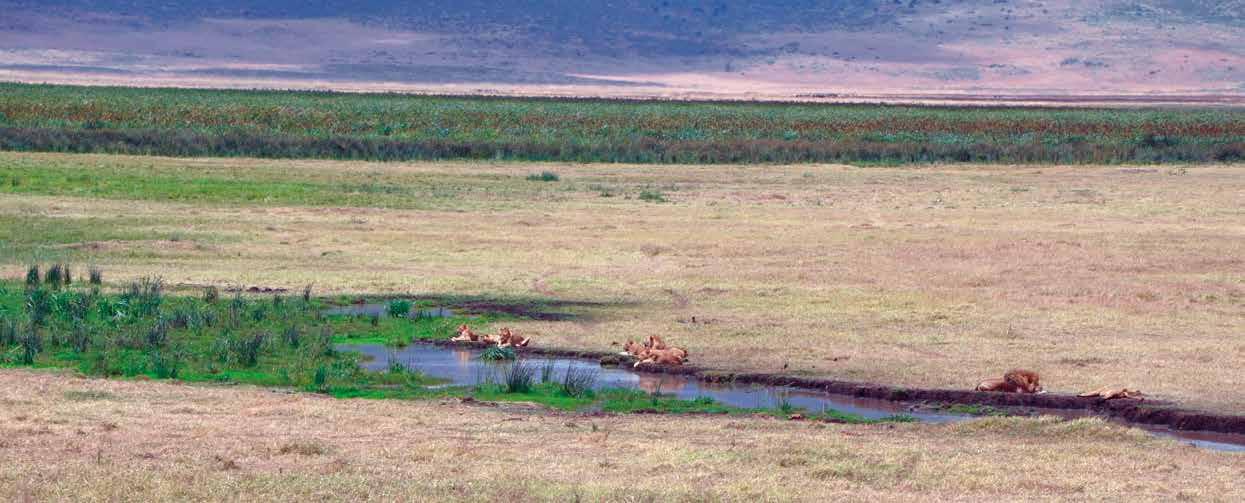
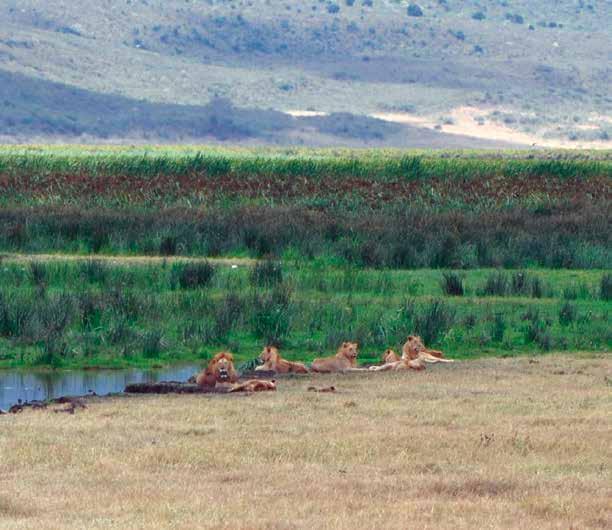

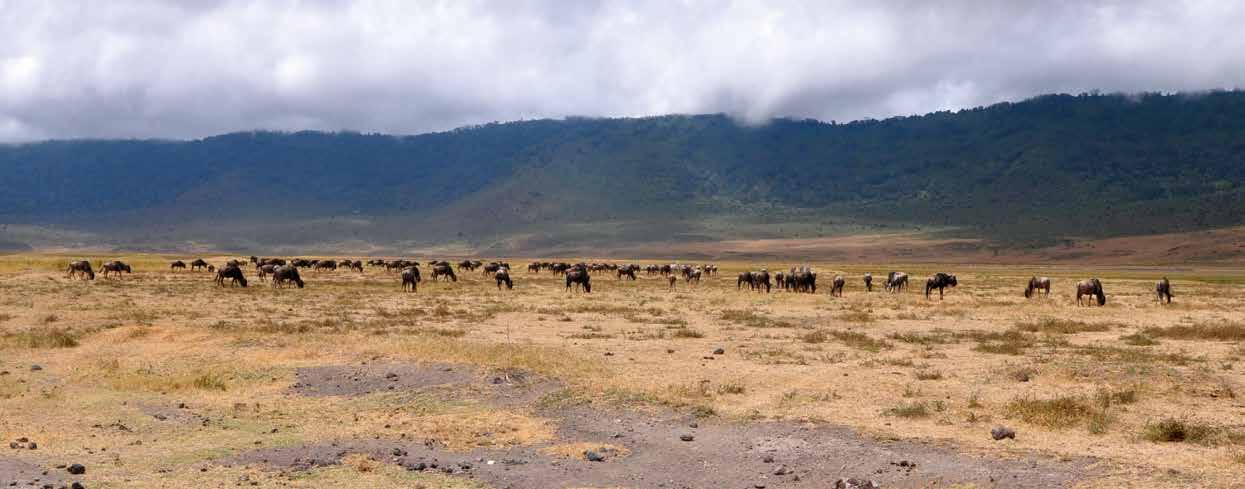
Day 4: Serengeti Ngorongoro area – game drive
Ngorongoro is a UNESCO World Heritage Site, a part of the Serengeti National Park. We entered via the Lodoare Gate (30km from Karatu town). The main feature of the Ngorongoro Conservation Area is the Ngorongoro Crater, the world’s largest inactive, intact, and unfilled volcanic caldera. The crater, which formed when a large volcano erupted and collapsed on itself two to three million years ago, is 610m (2,000 feet) deep, and its floor covers 260 square km. It is one of the seven natural wonders of Africa.
We took our first view from Heroes Point to see Seneto Springs, Lerai Forest, Empakaai Crater, and Olmoti Crater.

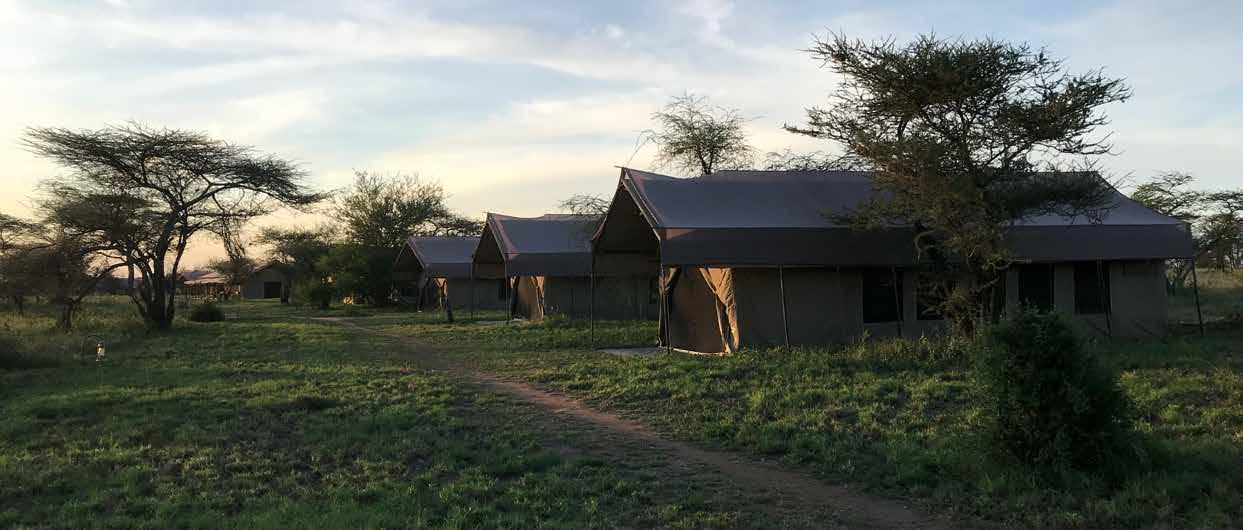
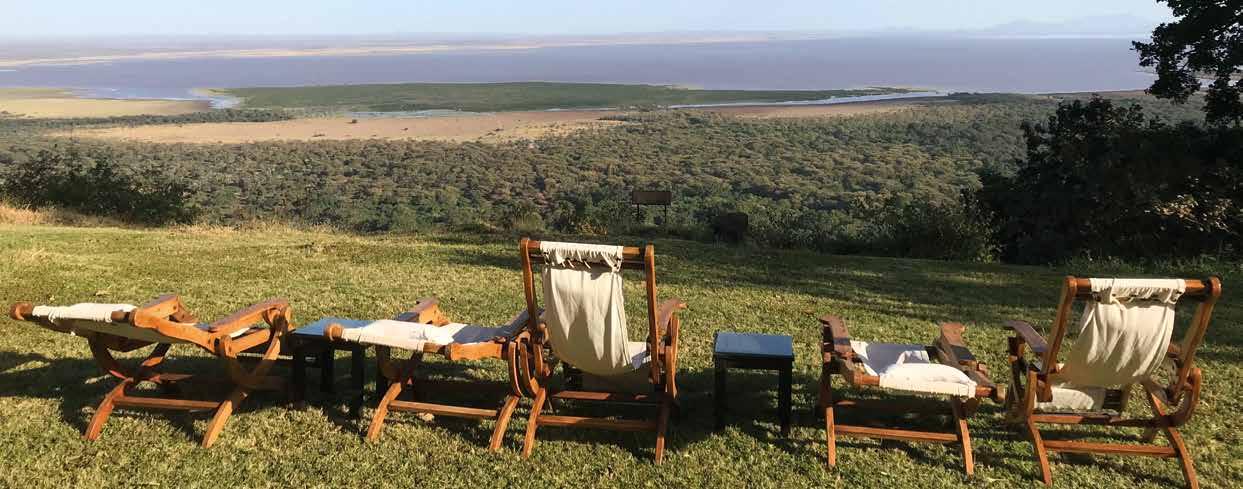
Tarangire National Park is known for its majestic Baobab trees. These can grow to an enormous size and have a unique shape. The park is also famous as it has the largest concentration of elephants in the world. Besides the elephants, you can see zebras, wildebeest, lions, leopards, waterbucks, giraffes, gazelles, impala, gerenuk, lesser kudu, and the beautiful fringe-eared oryx.
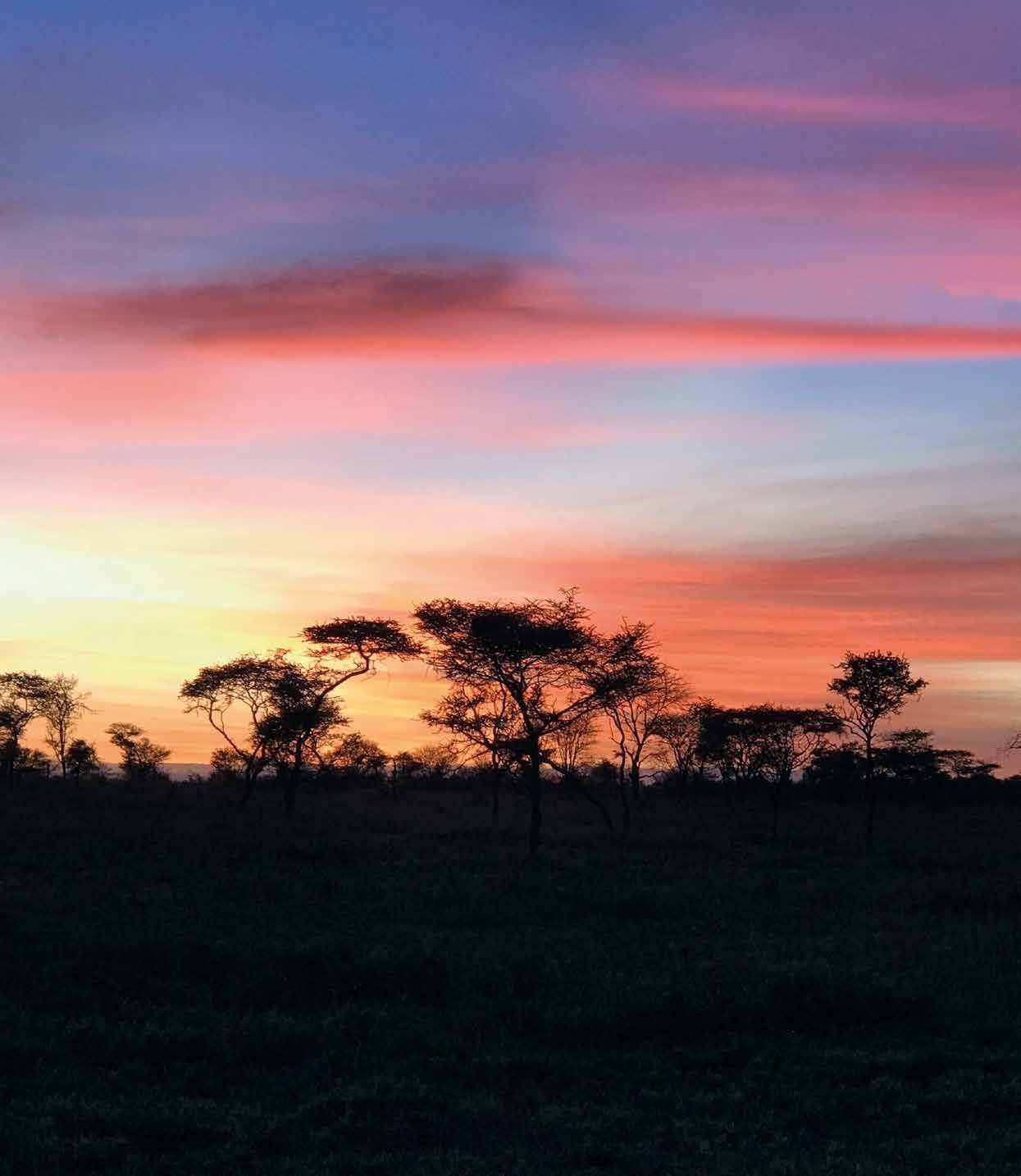

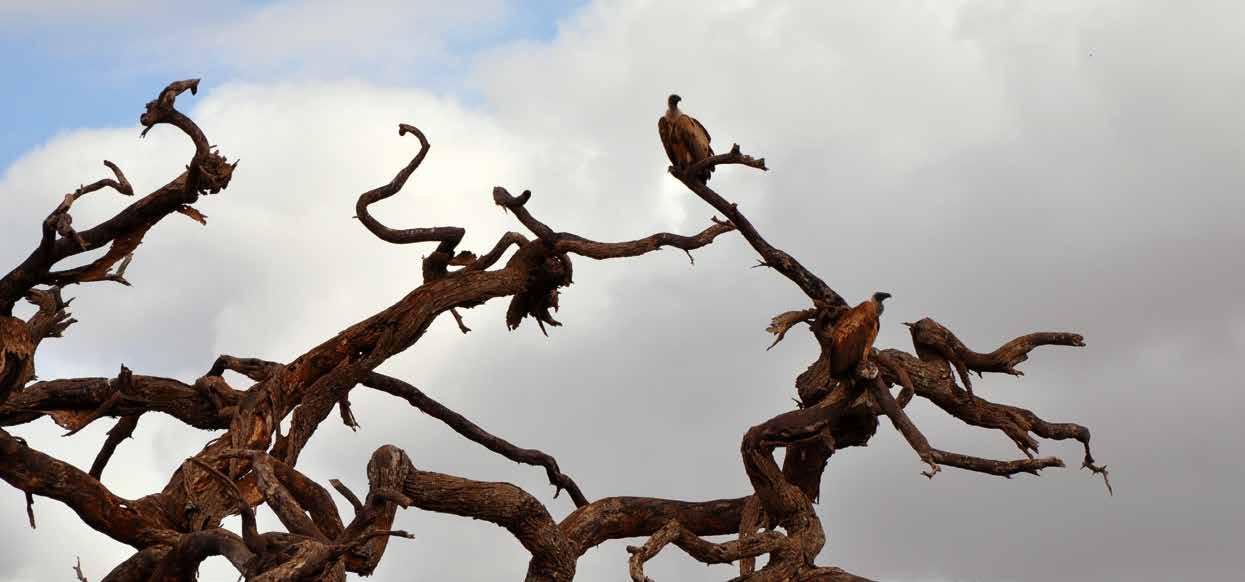


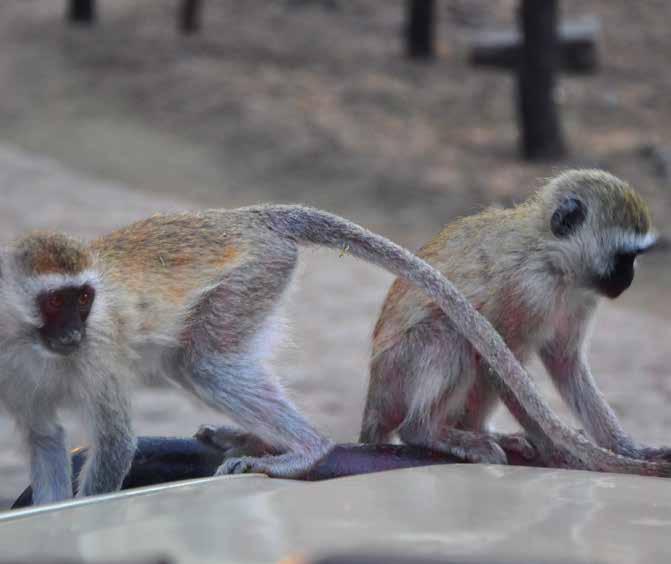
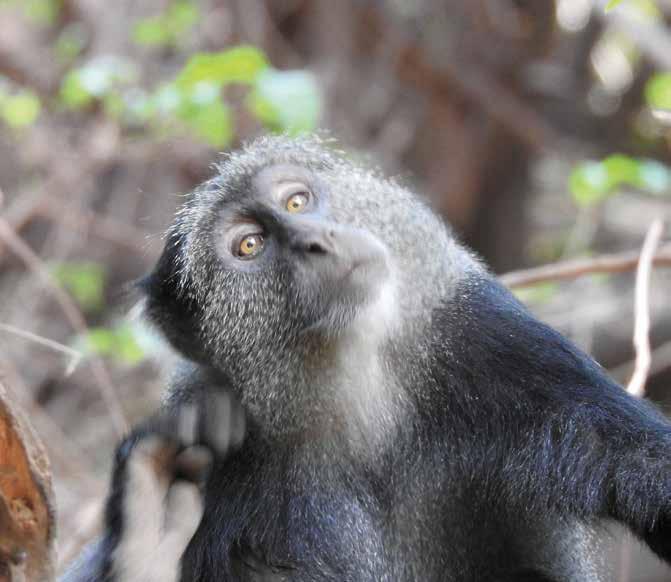
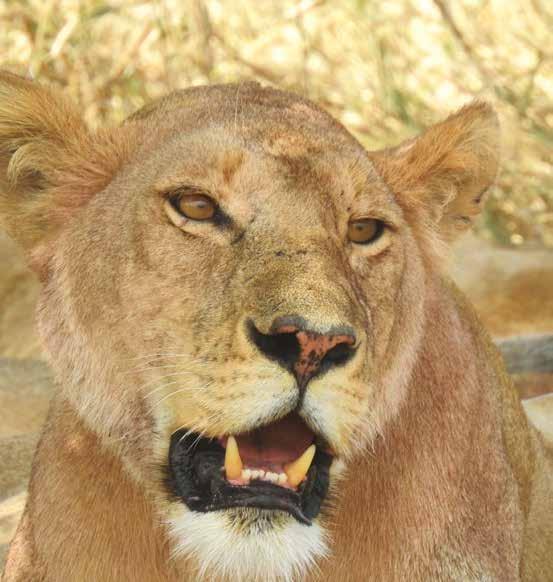

In the afternoon, we returned via Arusha to Kilimanjaro airport for our flight back home.
Full of great memories and thousands of pictures, we returned home. It was the trip of a lifetime, which we will never forget.
We have thousands of beautiful photos from our travels, and choosing just a few to publish in the magazine was truly difficult. Therefore, we decided to create a digital photo gallery for you.

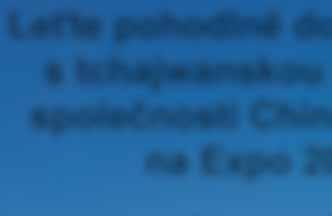
Leťte pohodlně do Japonska s tchajwanskou leteckou
společností China Airlines na Expo 2025

Lety Praha - Ósaka s přestupem v Tchaj-peji
Rezervujte v předstihu a plaťte méně*


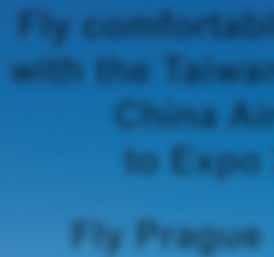
Fly comfortable to Japan with the Taiwanese airline China Airlines to Expo 2025
Fly Prague - Osaka with one stop in Taipei


Book early, pay less*

* sleva 15 % na letenky v ekonomické třídě zakoupené 60 a více dní před odletem nebo 90 dní v obchodní třídě
* 15% discount for flight tickets purchased 60 days prior to departure in economy class or 90 days in business class

Real student voices placed the University of New York in Prague in the Top 10 European universities of 2025.
Source: eduopinions.com
In the latest EDUopinions rankings, based on nearly 2,000 verified student reviews, UNYP earned a spot among the Top 10 universities in Europe — and is the only Czech institution on the list.
Our students value more than academics. They come for an international, English-speaking education, and stay for the supportive, student-centered experience that sets us apart.
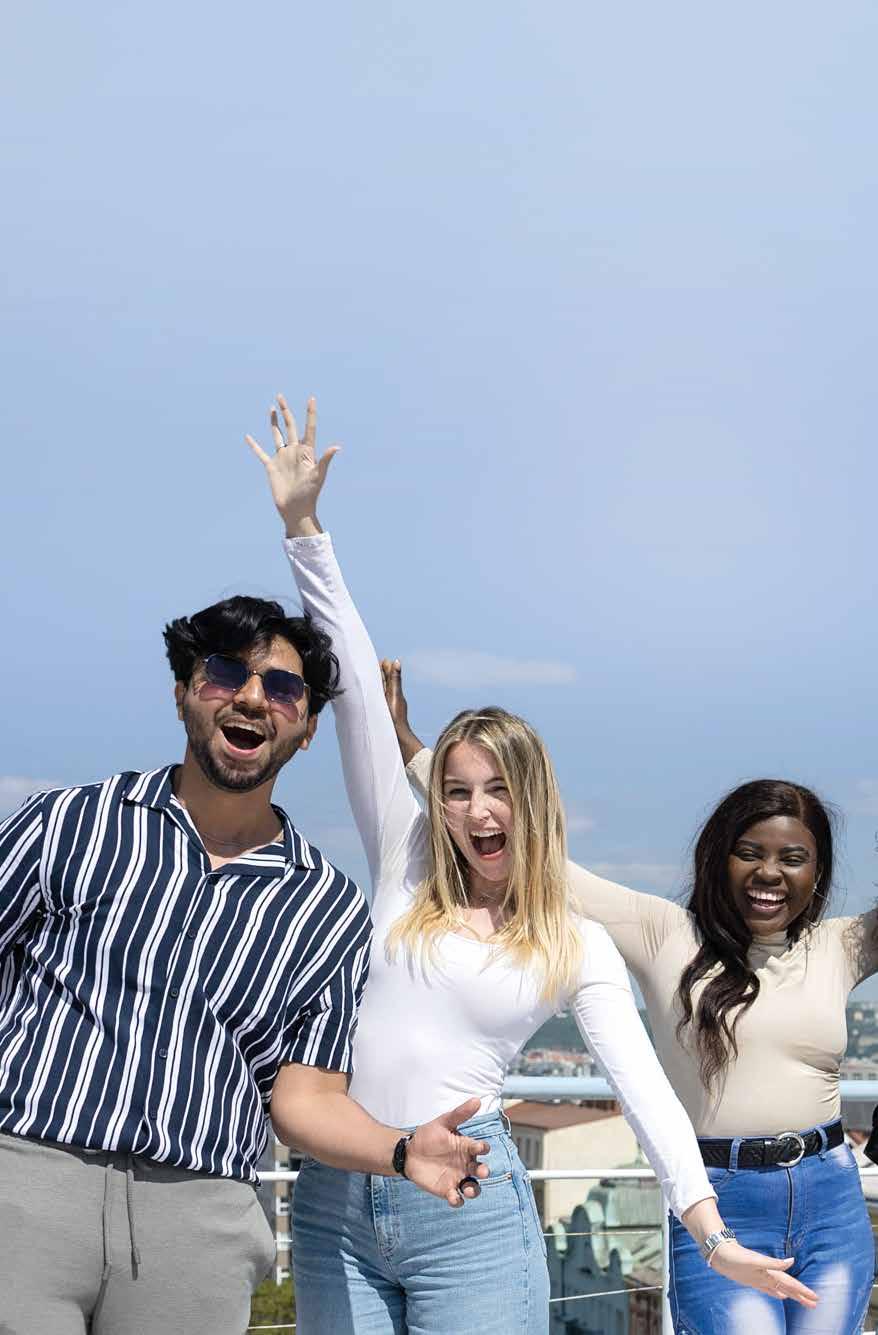
WHERE YOU EXPLORE YOU